
MAY/JUNE 2024 £10 PLUS The story behind Nando’s Working for Sir Richard Branson Can you bootstrap... ...a billion-pound business? Funding the growth of your business
Business Leader
The digital bank for entrepreneurs, by entrepreneurs.
We’re transforming business growth with personalised business banking services and fast, flexible financing ranging from £250,000 up to tens of millions.

Quick access to cash Get funded faster
Highly customisable solutions Tailored to your future
A transparent process Meet key decision-makers
Experts that understand growth
A dedicated business partner to fast-track your success

Visit us at oaknorth.co.uk

BOLDER THINKING NEEDS
BOLDER BANKING
EDITOR’S LETTER
Can you bootstrap a billionpound business? That is the question on the cover of this edition of Business Leader, which focuses on how to fund the growth of a business. Bootstrapping is a word that can be traced back to the 1800s and the phrase “pull oneself up by the bootstraps”. This was used to mock claims that were impossible or absurd, such as pulling yourself up by your own bootstraps, which is not physically possible. But today it has a new meaning – to build a business using only your own resources.
The origins of the phrase imply that to build a business in this way – certainly to one worth £1bn or more – is an absurd ambition. But there are founders who have done it. In this edition we look at businesses that were built without external investment, such as Dyson, Gymshark and Specsavers. Some of these borrowed money early on – Bet365, for example, took out a loan against its betting shops to fund the launch of its online business. Borrowing
EDITORIAL
Graham Ruddick – Editor-in-chief graham.ruddick@businessleader.co.uk
Sarah Vizard – Deputy editor-in-chief sarah.vizard@businessleader.co.uk
Andrew Lynch – Assistant editor andrew.lynch@businessleader.co.uk
Josh Dornbrack – Editor of businessleader.co.uk josh.dornbrack@businessleader.co.uk
James Cook – Digital editor james.cook@businessleader.co.uk
Patricia Cullen – Senior business reporter patricia.cullen@businessleader.co.uk
Alice Cumming – Editorial assistant alice.cumming@businessleader.co.uk
Mark Shillam – Chief sub-editor mark.shillam@businessleader.co.uk
may fall outside the most extreme definition of bootstrapping, but building a business in this way is still a remarkable achievement. For those looking to launch or build their own business, the fact that others have bootstrapped their way to success makes the idea seem more accessible somehow. It also provides benefits in the long term. For example, Josh Bayliss, chief executive of Virgin Group, says that working for one shareholder – in this case the Branson family – allows him to focus on long-term targets.
But not taking on investment may mean growing slower – or not at all. And you may miss out on the advice and wisdom that the best investors can offer. I was struck in our recent podcast interview with Jozsef Varadi, the founder of Wizz Air, about the strength of his partnership with the US private equity firm Indigo, who backed the airline at the start and is still an investor 20 years later. Varadi described his relationship with William Franke, the boss of Indigo, as like a father and son.
That is why this edition of Business Leader
Lee Irvine – Head of multimedia/video lee.irvine@businessleader.co.uk
SALES
George Buckingham – Commercial director george.buckingham@businessleader.co.uk
DESIGN/PRODUCTION
Phable Ltd – www.phable.io
MARKETING
Minty Nott – Head of marketing minty.nott@businessleader.co.uk
EVENTS
Melanie Shah – Head of events melanie.shah@businessleader.co.uk
also explores the stories behind businesses that took a different path to funding. We look at the rise of Nando’s, the growing wave of venture capital firms looking to invest outside London and share some tips on how to pitch your to investors from entrepreneur Alex Depledge, who estimates she has pitched more than 500 times.
We round off with some questions from you – the readers – for Richard Harpin, the owner of Business Leader, about getting investment. Richard founded and built HomeServe with external investment before selling it for £4.1bn. A final note. I want to say thank you for all your support and feedback since launching the new Business Leader. It has been remarkable. This is just the start…
Editor-in-chief Graham Ruddick

CIRCULATION
Adrian Warburton – Circulation manager adrian.warburton@businessleader.co.uk
MANAGEMENT
Andrew McLaughlan – CEO andrew@businessleader.co.uk
EDITORIAL ENQUIRIES: editorial@businessleader.co.uk
GENERAL AND ADVERTISING ENQUIRIES: info@businessleader.co.uk
© 2024 Business Leader is published by Business Leader Limited. Registered in England & Wales. Company no 08070514.
04 /// MAY/JUNE 2024
CONTENTS
EXPERTS
11 TOM BEAHON
How to build a career you’ll love
12 STEVEN SWINFORD
On Sir Keir Starmer’s house-building plans
14 SZU PING CHAN
Brits need to stop apologising and love success
16 EMMA JONES
Government should go hard and fast on procurement
17 NIKI TURNER-HARDING
How to attract and retain a multigenerational workforce
18 ED SMITH
Why you need to find your point of difference
20 JAKE HUMPHREY
Lessons from across the pond
22 ZARA NANU
Narrowing the unfinished business of pay gaps
23 CASPAR LEE
Beware the swing of the social media pendulum
24 CATHERINE BAKER
How to manage emotions under pressure MAY/JUNE 2024 CASE STUDIES
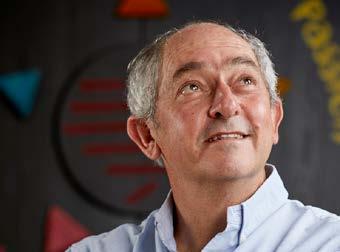

28 BOOTSTRAPPING
How Specsavers, Dyson and Dell built their businesses without external funding
34 SOLE CONTROL
Virgin Group’s CEO on working under Sir Richard Branson
38 THE RISE OF NANDO’S
The spicy story of its international success
42 SCALE-UP LENDING
OakNorth Bank on backing fast-growing businesses DEEP DIVES
44 VENTURE CAPITAL
Why the UK industry isn’t working
50 THE PITCH FROM HELL…
… and how to avoid it
54 VIEW FROM THE NORTH
Manchester’s place as a hotspot for the gaming industry
INSPIRATION
60 ASK RICHARD
Five readers pitch their questions at our owner, Richard Harpin
62 LESSONS FROM ANOTHER FIELD
Big Zuu on his mould-breaking success story
67 SECRET SAUCE
Innocent Drinks on the fruits of its cultural success
68 MY BIGGEST CHALLENGE
Ella Mills on how she overcame illness to found Deliciously Ella
70 AGAINST THE GRAIN
How one firm is helping companies expand into Africa
72 BOOKSHELF
Starling Bank’s founder offers tips from her funding journey
74 MEMBERSHIP
Find out how to join Business Leader
78 DEBRIEF
Inspiration to take on your funding journey
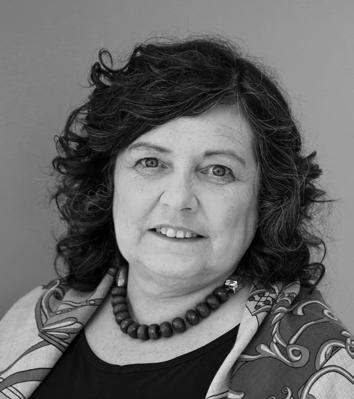
BUSINESS LEADER /// MAY/JUNE 2024 /// 05 WELCOME IMAGE CREDIT: Getty Images
68 XX
72 38
stories Growth
Inside the fast-growing medium-sized businesses driving the UK economy
01
The prefab disruptor Tony Wells, Merit
Almost a decade ago Tony Wells had an epiphany after realising he couldn’t grow his off-site manufacturing and construction business, Merit. “I announced to the management team that whatever we’d done in the past was wrong,” says Wells from the firm’s base in Cramlington near Newcastle. “We ripped up the business plan and went back to first principles: if we had a clean sheet, how would we do it?” he explains. “I couldn’t find a business model that was scalable.” Wells, 59, an electrical and controls engineer, took on the business with his wife Kirsty in 2002.
Wells knew he couldn’t match the economies of scale of the construction giants, but he was always a fan of Clayton Christensen, the American academic who developed the theory of disruptive innovation.
“We looked at disruptive business models because disruptive small company business models normally win against incumbents,” he says. “We were doing tier one, two and three contracting. You could see that over the long term, you wouldn’t make any money out of tier two and three. We just stopped doing that.”
Sales dropped like a stone. “I had sleepless nights,” recalls Wells, “but it was the right choice.” Dealing directly with the ultimate client – tier one – without the subcontracting tiers paid off. Merit turned over £88.4m last year, against £60.2m in 2022, and enjoyed a profit of £8.2m. It now employs 350
people, mostly at the 270,000 sq ft site in Northumberland.
Today, Merit’s prefabricated pods are used across the healthcare, pharma, bioscience, battery manufacturing and semiconductor sectors. It has constructed Halley VI research station modules for the British Antarctic Survey project, units for the Harrods luxury department store in London, clinical laboratories for the Moderna
biotech firm in Oxfordshire and even a community hospital at Berwick.
“In our little way, we’ve got something which is fundamentally better,” Wells says, citing the speed at which Merit completed the Autolus Therapeutics biotech lab at Stevenage, Hertfordshire. “That would normally take a five-year build from inception to use. We did it in 22 months.”
Timing is one element of Wells’ formula for success, sustainability and costs are the others. “The climate crisis presents an opportunity,” says Wells. “We banned gas from our buildings in response to Greta Thunberg’s UN speech and realised that once you drive that innovation, you can create sustainable buildings without an increase in costs and using less energy.”
And those costs? “The industry spends £3bn on estimating – and it’s 98 per cent wrong,” Wells says. “We’ve come up with a parametric cost model that’s eliminated estimating from our business. We design from a ‘don’t draw what you can’t afford’ mentality.”
With the landscape littered with the hulks of so many collapsed modular housing builders, Wells’ embracing of disruption is laying the foundations for a prefab future.
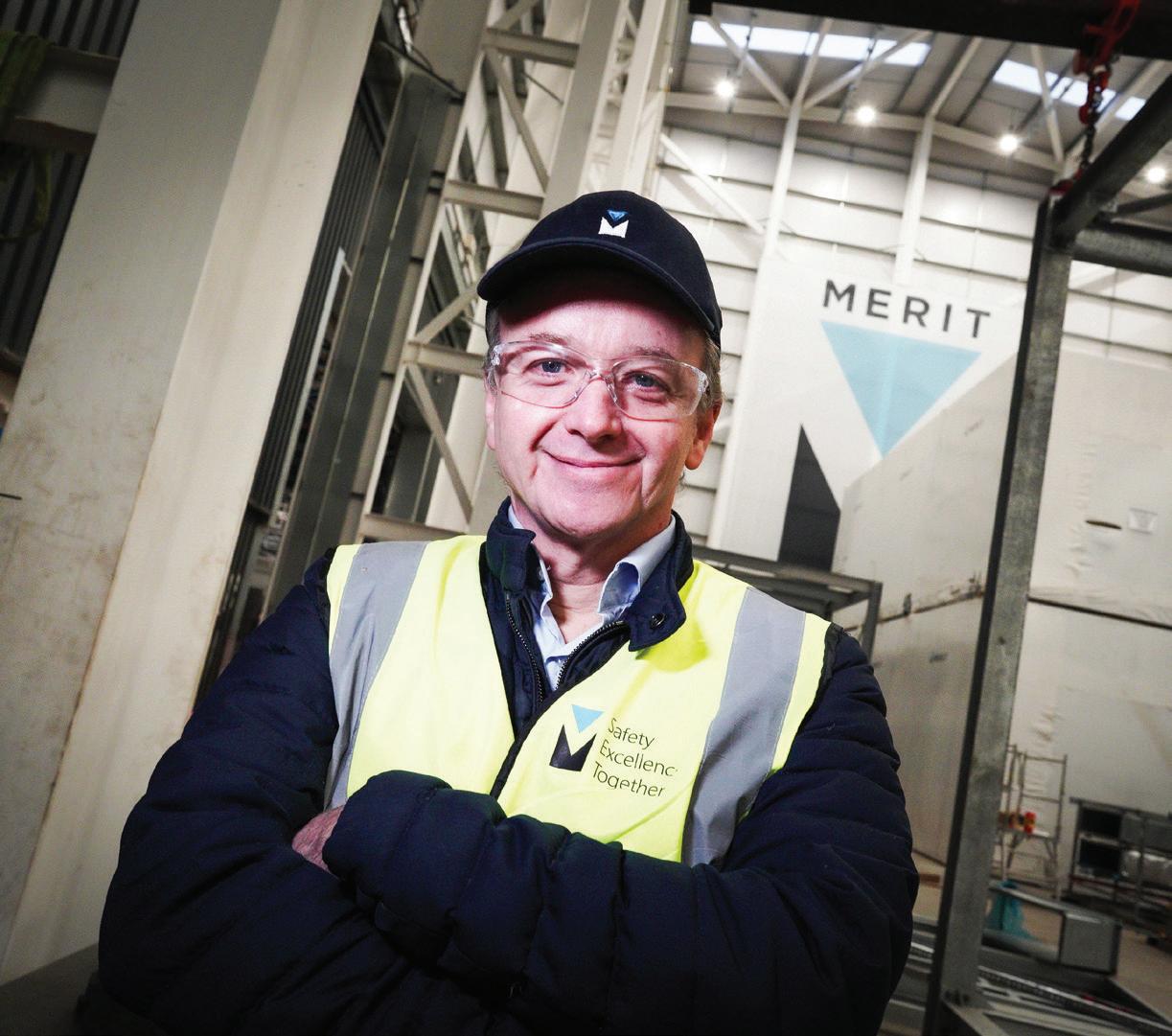
06 /// MAY/JUNE 2024
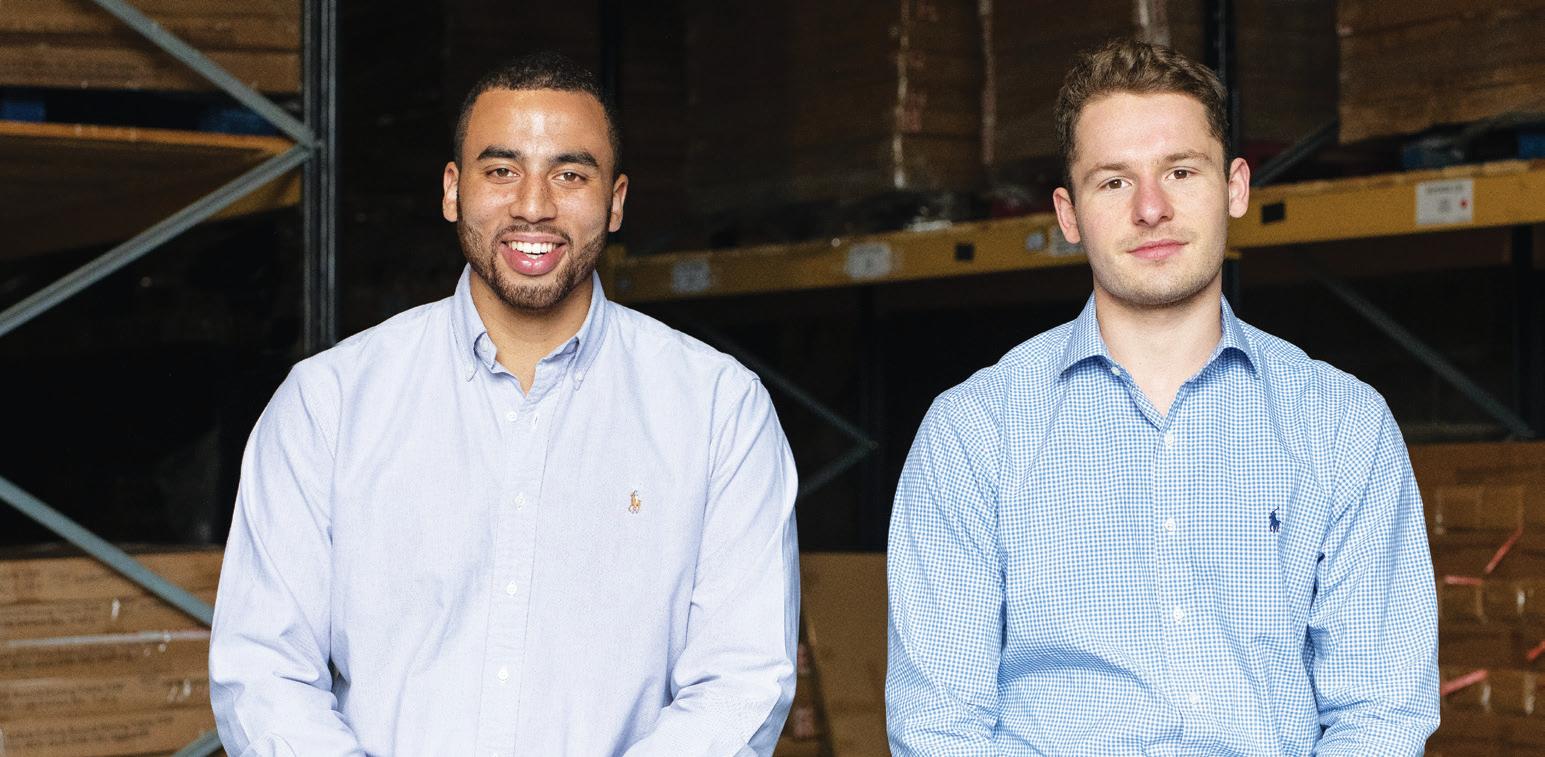
Keep the customer satisfied
Dan Beckles and Monty George, Furniturebox
Salisbury school friends Monty George (right) and Dan Beckles (left) used a tech-savvy focus on customer service to create a digital furniture retailer that expects to turnover £27m this year.
“I used to do a lot of eBay trading from around the age of 12,” says George. By 16, he was selling anything from touchscreen tablets to watches. In the sixth form, George spotted an opportunity to sell furniture. As Beckles was about
03
Shows that must go on Jennifer Davidson, Sleek Events
Jennifer Davidson doesn’t think she is doing anything out of the ordinary at Sleek Events, which will turn over £22m this year against £15.8m a year earlier. “When I tell someone we are going to deliver, we deliver,” explains Davidson, 39. “A lot of companies are so big and couldn’t care less.”
Sleek’s beginnings in 2014 were modest. Davidson, who read business studies with German and Spanish at Bournemouth University, was working freelance in events when a client asked if she would go in-house and find an agency.
“I decided to build one instead and it’s been a very happy relationship,” she says.
That client was Amazon Web Services (AWS). Davidson’s
to study economics at Loughborough University, George made him an offer.
“I said: ‘Do you fancy taking a year out and seeing if the furniture thing can work? And then if it doesn’t you can go off to uni?’ – and here we are nine years on,” recalls George, now 27.
They started with online marketplaces – eBay, Amazon and Tesco Direct – and channels such as Wayfair, B&Q and The Range. “There’s a massive opportunity for us to establish our brand and to bring our core values to customers in
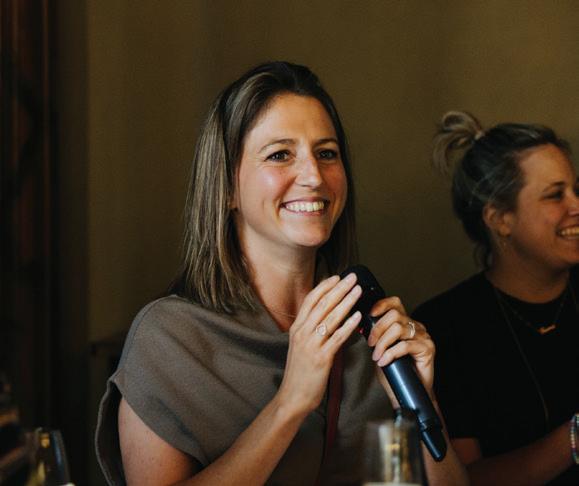
40 full-timers and 60 freelancers will soon spend six days setting up for the AWS London Summit, hosting almost 20,000 people at the ExCel centre in Docklands.
As for everyone in events, the past decade has been a game of two halves for Sleek. “Pre-Covid we didn’t pitch for work – everything was word of mouth,” recalls Davidson. Sleek’s startling growth was recognised in The Sunday Times Fast Track 100, where it
the market,” says Beckles, 26. “The limitation with marketplaces is that you’re beholden to them.”
They also wanted to break the mould with their customer service.
The company offers next-day delivery until 8pm in the UK, explains Beckles, 26, while it customer service teams are available seven days a week. Its Trustpilot score is 4.9 out of five, based on almost 7,000 reviews.
Less than 18 months ago, Furniturebox moved to a new 88,000 sq ft fulfilment centre off the M4 near Chippenham, Wiltshire, to allow the business to grow.
Beckles and George initially ran a tight ship as they bootstrapped the business selling value furniture. “We were fighting for every pound,” says George.
Turnover in the year to the end of July 2022 stood at £15.9m, up almost 400 per cent on 2019. With an expansion into the US, the pair will face new pressures.
“We want to grow quickly,” says George, “but we don’t want it to be at the detriment of losing everything we have: the team, the structures and the culture we have in place.”
came in at number 19. “Then we went down to six staff, including myself,” says Davidson, 39. “We didn’t bother pitching for virtual events – no one was passionate about it.”
Following Covid, the business was able to regain some of its momentum.
“We’ve actively made a point of pitching for clients,” she reveals. They include PayPal and Pernod Ricard. Davidson hires staff who won’t run out of steam. “I don’t want to sell Sleek. Eventually I want to turn it into an employee-owned business.” She is also proud that Sleek has not had to rely on investment. “I never had a loan. It’s all mine, which makes it easier to give away,” Davidson says. “It’s never really been about the money though. I get a kick out of seeing the team in action on-site.”
Reporting by Andrew Lynch
MAY/JUNE 2024 /// 07
02
GROWTH STORIES BUSINESS LEADER ///
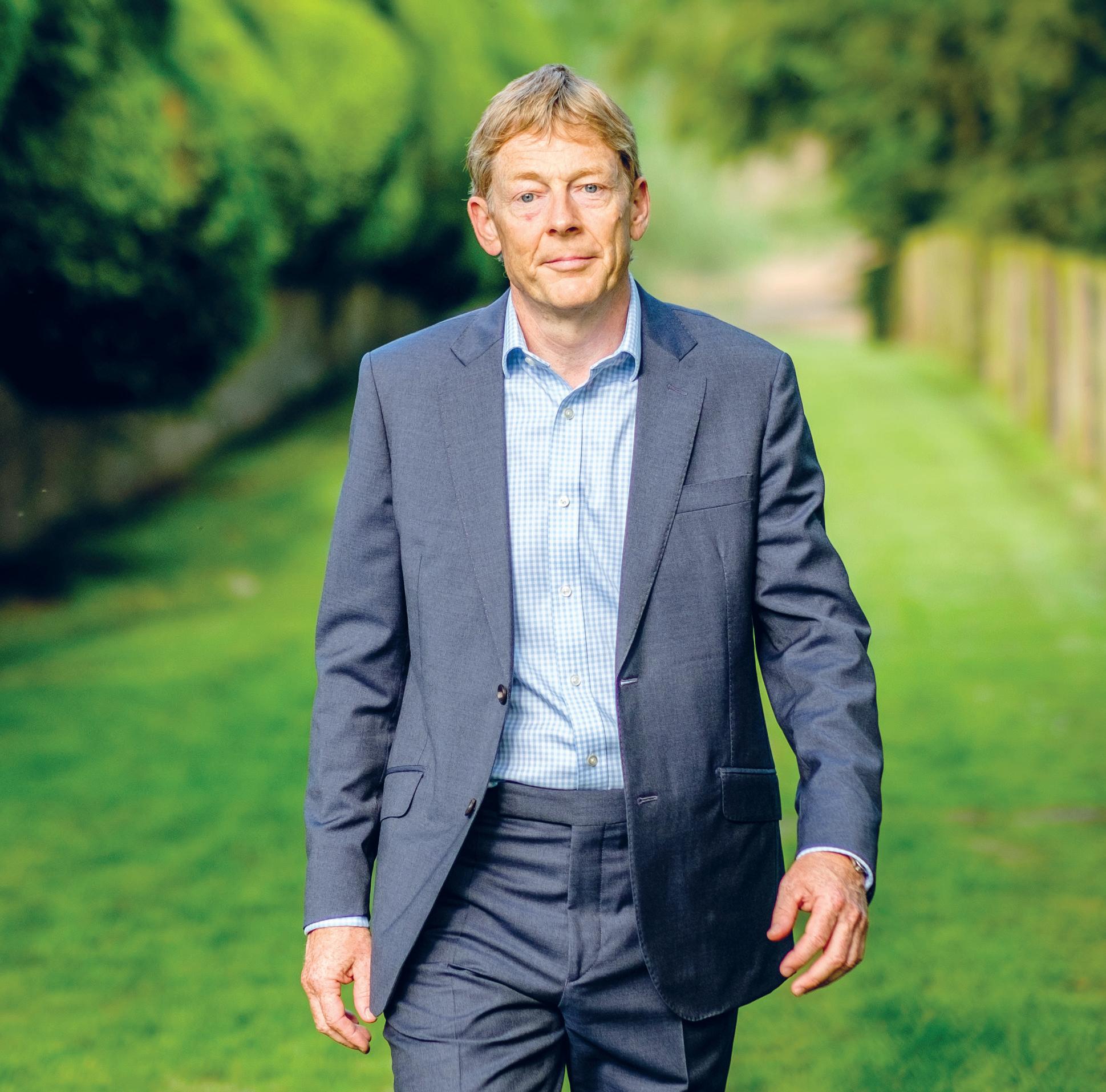
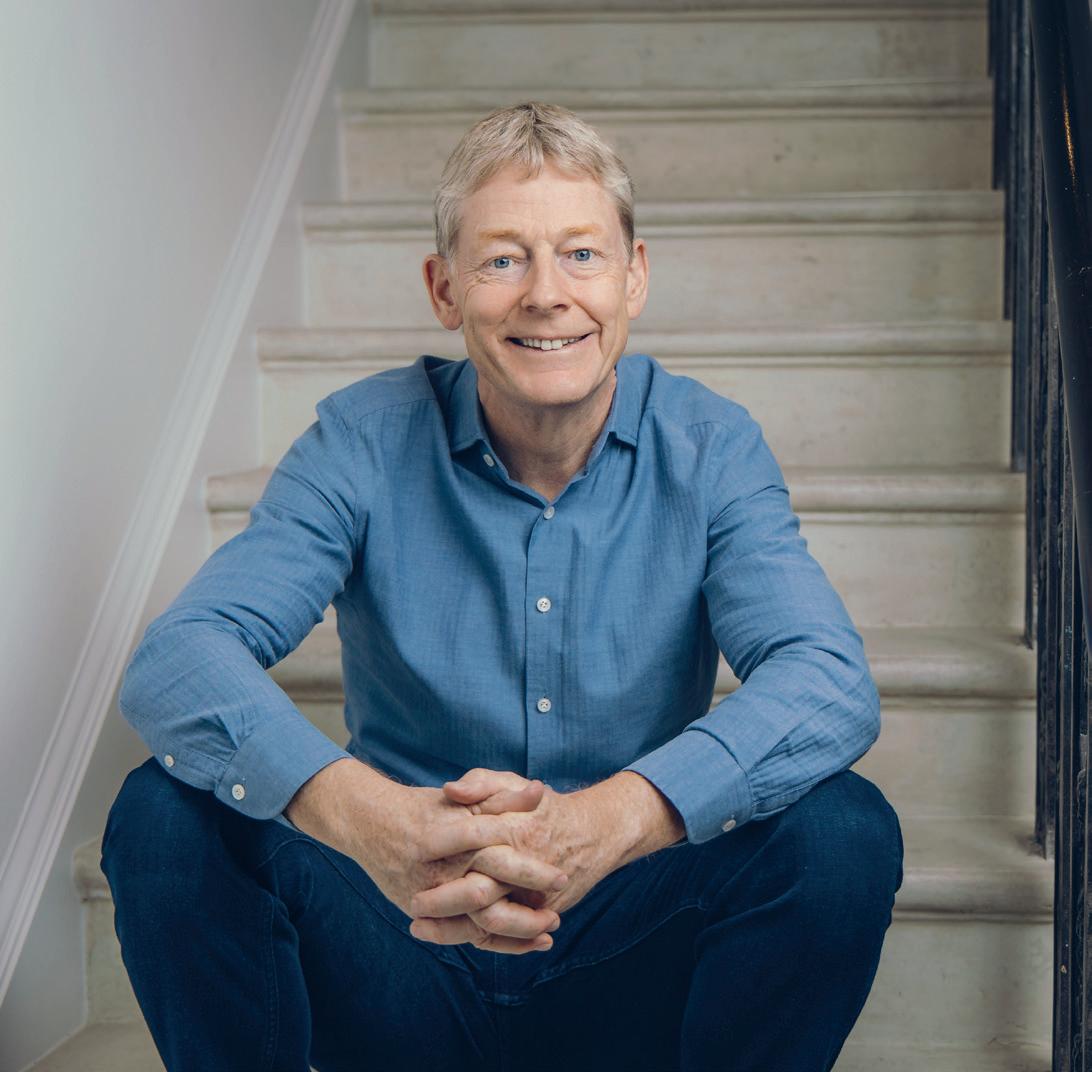
Are you ready to transform your company into a giant? Discover the 8 secrets to building a £billion business Grow your business with leading entrepreneur Richard Harpin Join the Business Leader Growth Workshop businessleader.co.uk/grow

MAY/JUNE 2024 /// 09 IMAGE CREDIT: Getty Images /// Advice and analysis from the leading figures in their field /// EXPERTS BUSINESS LEADER /// 11 Tom Beahon How to build a career you’ll love 18 Ed Smith Why you need to find your point of difference 12 Steven Swinford Sir Keir Starmer’s housebuilding plans 20 Jake Humphrey Lessons from across the pond 14 Szu Ping Chan Brits need to stop apologising 22 Zara Nanu Narrowing the unfinished business of pay gaps 16 Emma Jones Government should go hard and fast on procurement 23 Caspar Lee Beware the swing of the social media pendulum 17 Niki Turner-Harding How to retain a multigenerational workforce 24 Catherine Baker How to manage emotions under pressure 18
15 CATEGORIES
SENIOR JUDGING PANEL
THE UK’S ONLY SCALE-UP AWARD PROGRAMME
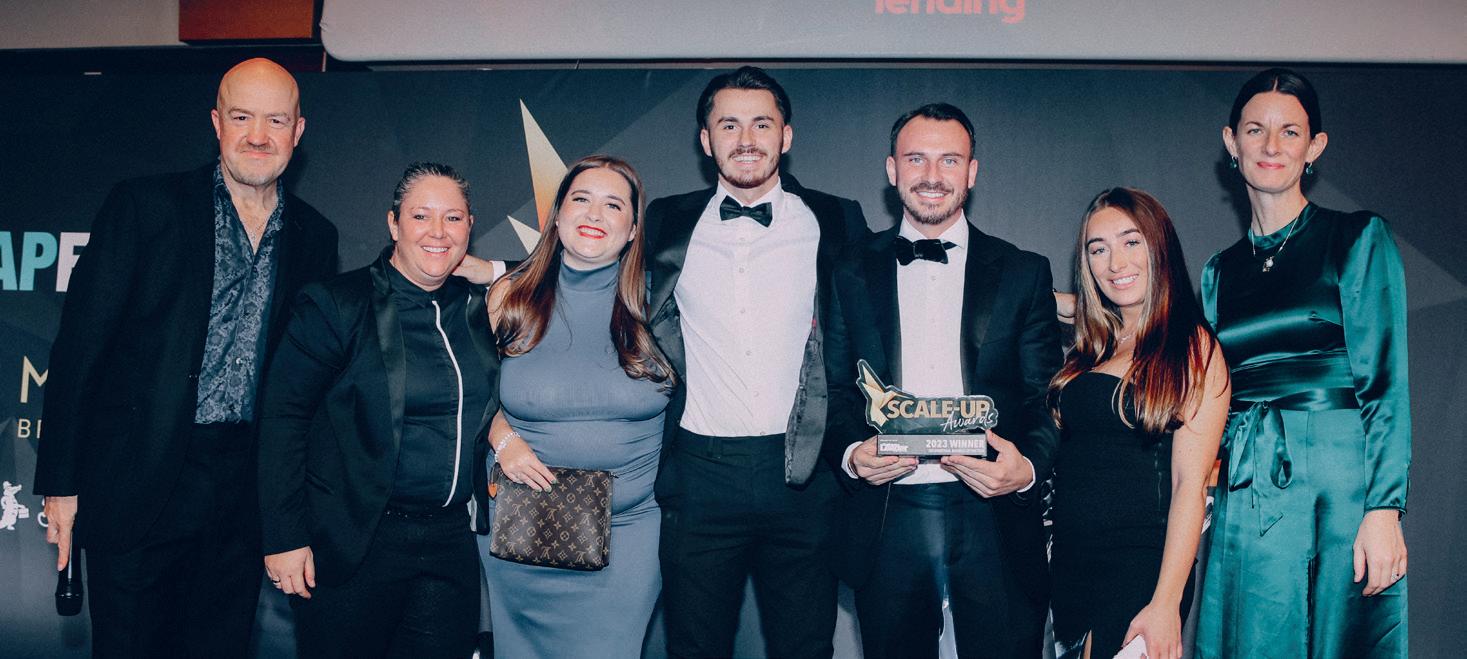

START YOUR ENTRY NOW #SUA24
BECOME AN AWARD-WINNING BUSINESS IN 2024
Passion, optimism and humour: how to build a career you will love
TOM BEAHON
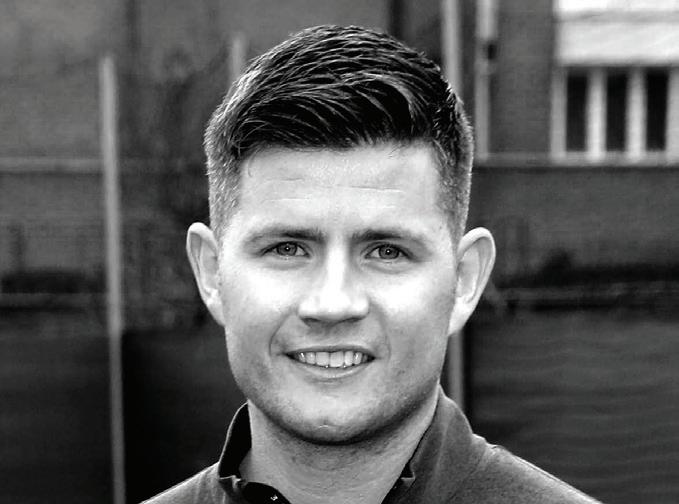
Before I co-founded Castore when I was 26, I had one “real” job, which was in finance. I am not naturally a numbers person but I did make a point of being the first to arrive in the office every day and doing my best at whatever task I was given. Despite my lack of obvious talent, senior people appreciated my approach to work and would give me advice on where I could improve.
Given that many readers of this article will be leaders with people at the start of the careers in their teams, I want to share the key aspects of what I learnt and hope some people will find these points worth sharing with their most ambitious young colleagues.
No substitute for hard work
When I look at people who have risen to leadership positions, the common theme is their work ethic. They generally work harder, sweat the details and care more than anyone else. This is not just true in business but in any walk of
life. If you want to be really good, you must be willing to work very hard. Don’t believe anyone who tells you otherwise.
Passion is key to everything
The only way you will be capable of dealing with the inevitable setbacks that come with any significant endeavour is if you are truly passionate about what you are doing. I love sports and thrive on the competitiveness, intellect and resilience required to build a global brand, so running Castore isn’t work for me. Before you do anything else, find your passion. After that, everything becomes a lot easier.
You either win or you learn
At the start of your career, many things are out of your control and you’re unlikely to find your perfect job at the first attempt. Rather than letting setbacks get you down, use them as
opportunities to refine your approach and learn what your strengths and weaknesses are. The one thing you can always control is your attitude. When you wake up every morning you have a decision to make: are you going to coast through the day, or will you be a positive influence on those around you? Having a good attitude every day will get you further than any technical skill or talent.
Be entrepreneurial
Anyone working within a company at any level can have an entrepreneurial mindset. If you want to get ahead, having one will undoubtedly accelerate your progress. Take the initiative, make a process more efficient or do something that improves a customer experience. Constantly challenge yourself and others to think and do things differently for your company. Don’t expect to get noticed straight away but persist and you’ll get more responsibility and opportunities. As a founder, my favourite people are those who bring me solutions and new ideas.
Kindness is a superpower
The best advice is often the simplest and always treating people with respect is a lesson I learnt very early. There’s not only a practical benefit to this – you never know when you’ll be dealing with people again – but a personal one. It makes work a lot more enjoyable if you’re kind and caring towards colleagues whether they’re above or below you in the hierarchy. Courtesy costs nothing and smiling every day goes a very long way in business and life.
Tom Beahon is the co-founder and chief executiive of the sportswear brand Castore

BUSINESS LEADER /// EXPERT IMAGE CREDIT: Getty Images, Adobe Stock MAY/JUNE 2024 /// 11
///
/// FOUNDERS
Starmer is constructing plans for a huge expansion of housebuilding
STEVEN SWINFORD
hat will be the biggest change if, as expected, Sir Keir Starmer wins the general election? For all their apparent differences, the approaches of Labour and the Tories are remarkably similar when it comes to the traditional electoral battlegrounds.
WBoth offer the same tax cuts, both warn of years of constraints on public spending to come and both will face the same seemingly intractable challenges as they attempt to bring down NHS waiting lists.
The point on which they diverge the most is on a policy usually deemed too unglamorous for the cut and thrust of an election campaign, but one that is of huge national importance:

Starmer’s keynote speech at the Labour party’s annual conference last September attempted to thrust the issue centre stage. Labour, he said, would “bulldoze” the planning restrictions that have held Britain back for generations. His party would “fight the blockers” as it sought to restore the dream of home ownership for millions of people.
The Labour leader has put the war on nimbies at the heart of his campaign. Nothing is off the table. The green belt, green fields, new towns… all sites are up for consideration as Starmer seeks to “get Britain building”.
There is political logic behind Starmer’s positioning. Labour’s psephologists have pored over the polling and established that the principle of backing housebuilding is popular.
The vast majority of people are in favour of development when it is not in their backyards.
More specifically, it matters in the seats that Labour is targeting. Housing is the top issue in a quarter of the party’s 100 most winnable seats, particularly a swathe across Middle England that is likely to be pivotal to Labour’s chances of winning the election.
But Starmer’s decision to focus on planning is also one borne of necessity. If Starmer wins the election, his fiscal room for manoeuvre will be severely constrained. The Tories are planning an Autumn Statement that is likely to include significant pre-election giveaways in the form of tax cuts.
The Office for Budget Responsibility, the fiscal watchdog, is drafting increases in public spending of just one per cent a year after 2025. When protected areas such as the NHS and education are removed from the equation,

it means significant cuts to other departments. Economists have already warned there will be a new era of austerity.
While both the Tories and Labour have signed up to these bleak – and some argue, unrealistic –public spending profiles, neither party has spelt out where the axe would fall. Their political interests in this are perversely aligned. What party would be willing to go to the polls hailing a programme of tax rises or spending cuts?
In the absence of financial firepower, supply measures such as planning reform have become critical to Starmer’s hopes of growing the economy, and he needs to do this without increasing public spending.
The Labour leader’s hopes of weaponising planning as an issue have been helped by the seemingly eternal psychodrama of the Conservative Party around the issue. The past 14 years have seen revolt after revolt within the party, with the free-market aspirations of some Tory MPs coming up against the desire of others – particularly in southern England –
12 /// MAY/JUNE 2024
IMAGE CREDIT: Getty Images, Adobe Stock
/// POLITICS ///
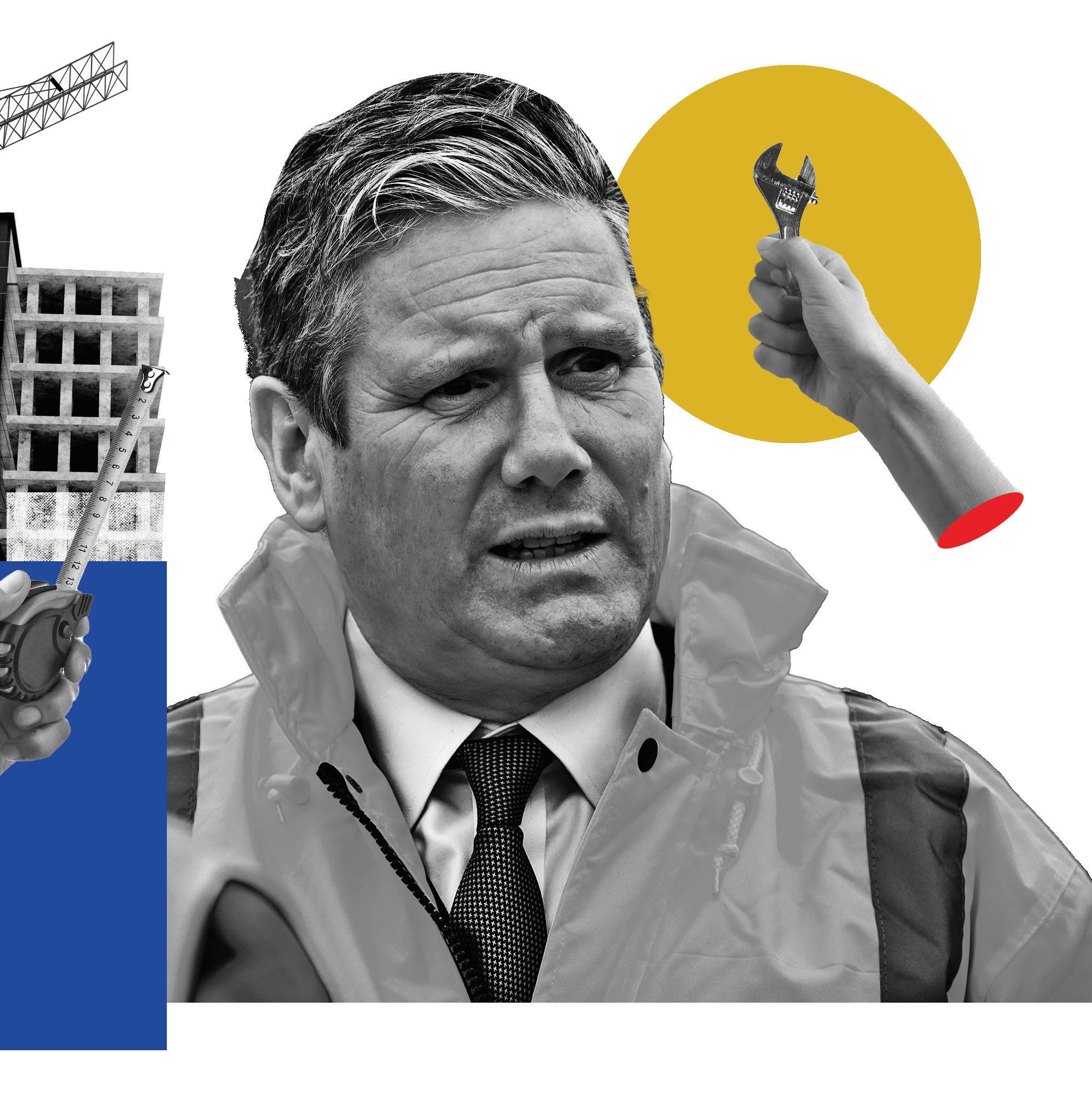
‘The green belt, green fields, new towns… all are up for consideration as Starmer seeks to “get Britain building”’
to protect their constituents from what is seen as unnecessary development. That tension has culminated in a series of mass rebellions.
In December 2022, two months into his premiership, Sunak abandoned plans for mandatory housebuilding targets for local authorities, making them advisory instead. Planning experts warned that at the stroke of a pen the government had just cut the number of homes likely to be built every year by as much as 77,000.
At the end of last year, the government went further, announcing that councils will no longer be forced to set aside greenfield land to meet future housing need. Councils were also given
an exemption from building new homes on prime agricultural land.
Experts say that the government now appears to be on course to miss its own target for housebuilding. When Boris Johnson won the general election in 2019 he recommitted to an annual target of 300,000 homes a year “by the mid-2020s”.
To date the government has consistently fallen short. In 2019-20 there were 248,591 “net additional dwellings”, a figure which fell to 217,754 in 2020-21. This was attributed to a slowdown in the building sector because of the pandemic. In both 2021-22 and 2022-23 the figure was fewer than 235,000 homes a year.
Sunak has pledged to “protect” green spaces, saying instead that new houses will be built in “great cities” rather than “concreting over the countryside”. Senior Conservatives are privately – and in some cases publicly – lobbying him to take a more forthright approach.
Amid the Tory climbdowns and divisions, Starmer has spied an opportunity. The Labour leader has pledged to build 1.5 million homes during the next parliament, primarily by reinstating the mandatory housebuilding targets the Tories are preparing to scrap.
Starmer also announced plans to build a string of new towns and said that Labour would be willing to build further houses on low-quality areas of the green belt, which he described as “grey belt”.
The Conservatives responded by pointing out that 233,000 homes a year have been built under successive Conservative governments on average, compared to 170,000 under Labour. The Conservative Party also announced plans to build more on brownfield sites in cities and the government recently said that it wants to “turbocharge” development in Cambridge, with up to 250,000 homes built in the next 20 years.
The Tories are also preparing their own offer on home ownership, although – unsurprisingly given the party’s internal divisions – it is unlikely to focus on planning. Instead they want to focus on cutting the overall cost of home ownership for first-time buyers in a bid to appeal to younger voters.
A variety of options are under consideration from both parties, including much longer fixed-term mortgages that reduce the amount of money that is needed for a deposit. Stamp duty reductions are also on the table.
As we enter the final furlong before the general election is called, housebuilding and home ownership have never been more relevant. For generation rent, it could prove to be a truly significant moment, whoever wins.
Steven Swinford is political editor of The Times
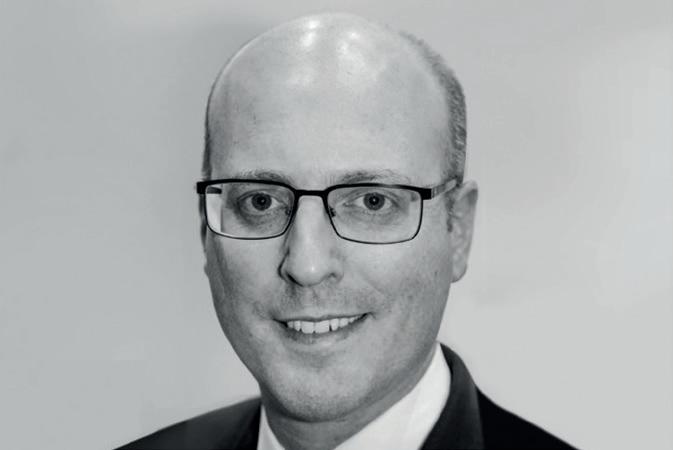
BUSINESS LEADER /// EXPERT MAY/JUNE 2024 /// 13
NSorry, but Brits need to stop apologising and love success
o bragging please, we’re British. Self-deprecation is in our DNA, but our inherent discomfort with lauding achievement is holding back the economy. There’s a danger that a nation which prefers reluctance to enthusiasm is actually missing out on vital opportunities.
Some attribute this to tall poppy syndrome; successful entrepreneurs are an easy target for the jealous and the cynical. Others believe it’s a more fundamental trait of how we do business here in the UK.
I believe it’s a bit of both. For one thing, as a nation we just can’t stop apologising. A 2015 YouGov poll of more than 2,500 people in the UK and US suggested that Brits are 50 per cent more likely than Americans to say sorry for things that aren’t their fault, for example when they sneeze or someone else bumps into them. This isn’t so much of a problem in day-to-day life, but it can be detrimental in business.
“[Self-deprecation] is an endearing quality, don’t get me wrong, but when it comes to doing business there’s a danger it might be taken at face value,” says one US executive.
A 2023 Ipsos Mori poll found that Britain is a nation of “satisficers” rather than “strivers”, with one in two (51 per cent) of us satisfied with our lot. Less than a third (30 per cent) said they wanted to achieve more. Brits also favour “quiet luxury” and “discreet consumption”, preferring not to own or do things that might display their wealth.
This does not mean Brits are not confident about their ideas. Adam Marshall, the former director general of the British Chambers of Commerce, says too many of us are not
SZU PING CHAN
shouting about our achievements.
Marshall, who describes himself as “American as apple pie” despite spending his whole professional life here, says there are clear differences between the two countries. In the US, he suggests, success is celebrated and failure is understood, whereas in the UK success is kept quiet and failure is something that should be avoided.
“My concern about celebrating success in Britain is that you see two varieties: the ‘brash businessman’ who doesn’t care what anyone else thinks, or the ‘tall poppy’ who ends up getting cut down by others, ” adds Marshall
The feeling that it could all go wrong is something even the best of us can’t shake. A decade ago, the actress Olivia Colman
admitted she found it hard to deal with newfound adulation. “It’s slightly scary, that tall poppy syndrome,” she said in an interview with The Guardian. “It could all go wrong. I don’t know. It’s weird.”
Colman’s acting talents went on to earn her
‘Britons love an underdog but all too often we expect them to stay that way’

14 /// MAY/JUNE 2024
/// ECONOMICS ///
multiple Oscars. “It’s genuinely quite stressful. This is hilarious, I got an Oscar!” were the first words she uttered after taking the stage to collect her award. True to form, “sorry” came seconds later.
There’s a broader point here. Britons love an underdog but all too often we expect them to stay that way. Even our sporting heroes are expected to remain humble. It means those who break the mould are left worrying they will be seen as arrogant.
Don’t get me wrong, being self-aware has its bonuses and we can’t change what’s in our DNA. However, we must do more to highlight success or other people in the business world won’t even attempt to achieve what Colman has in the arts sector. Otherwise our poppies won’t have a chance to grow at all.
Why is this? Perhaps fear of failure plays a role. A study published by the Organisation for Economic Co-operation and Development (OECD) showed budding British entrepreneurs were twice as likely to avoid starting a business compared with their US counterparts because they feared they would not succeed.
Americans, on the other hand, have turned failure into an enterprise. Elon Musk, who co-founded Tesla and owns the social media site X, was once the world’s richest man. He also holds the Guinness World Record for the largest loss of personal fortune in history after shares in the electric carmaker plunged in 2022.
Speaking about his roller-coaster journey, Musk insisted: “Anything which is significantly innovative is going to come with a significant risk of failure. You’ve got to take big chances in order for the potential for a big positive outcome. If the outcome is exciting enough, then taking a big risk is worthwhile.”
It’s worth remembering that some of the world’s biggest companies stemmed from failure. YouTube, which is now owned by Google, began life as an online dating site. Users were encouraged to “Tune in, Hook up” and women were even offered $20 to upload videos of themselves. Nobody did and the owners pivoted to a video-sharing strategy.
Today, there is a whole industry in America that celebrates failure through conferences, as well as dozens of books on the subject. There’s even a name for it: failure porn.
Social media doesn’t help. The constant comparisons with others on Instagram and TikTok living what looks like their best lives can trigger social anxiety driven by the fear

of missing out, all of which can breed anger and resentment.
I know what you’re thinking: the media also plays its part. You have a point, but there is an element of supply and demand. I’ve written about economics for more than 15 years and recession stories have always done better than tales about the booming economy.
Some of the most high-performing stories are about job losses. We celebrate success but are always looking for failure. Isn’t it time we all stopped looking over our shoulders and ask what’s next rather than what could go wrong?
There’s another risk to our constant fear of failure and denigration of success. Marshall believes the consequences of constantly diminishing the very people we should look up to is that young people and entrepreneurs are left without role models.
“There’s sometimes a lack of attention from
financiers when it comes to potential deals and opportunities,” he says. “If success is celebrated, then more money can flow to businesses because they become visible, they become known. We miss out by not celebrating success.” After all, the next generation can’t be what it can’t see.
Szu Ping Chan is economics editor of The Telegraph

BUSINESS LEADER /// EXPERT MAY/JUNE 2024 /// 15

/// START-UPS ///
Government should go hard and fast on SME procurement
EMMA JONES
One of the most tangible things any government can do to support its start-up, early stage and small business community is to buy from it.
Public procurement represents a third of all government spending and a 10th of the whole economy. It’s a powerful tool that, if used strategically, could have an important impact on the UK’s innovation pipeline.
Buying from start-ups injects government money into the sector. This is because its contracts are reliable and firms that work on them must improve efficiency and productivity when selling to larger clients. The government also settles invoices quickly, offering cash flow to suppliers.
It’s a powerful way to help the digital business community evolve and use lessons from innovative firms to solve public sector problems. This benefits not just the SMEs themselves but the wider community, saving
taxpayers’ money along the way.
When Matt Hancock was minister for the Cabinet Office in 2015, he set a government target to spend £1 in every £3 with SMEs by 2020. This equated to an extra £3bn a year for small and medium-sized firms. That target was missed, but a firm commitment to increase public sector spend with SMEs was established.
Fresh SME-focused frameworks are also in play, such as the one awarded to Sodexo, which aims to spend £100m with SMEs to supply sustainable food and drink to various parts of the public sector procurement departments. Efforts such as this encourage bids from SMEs.
The UK is about to take the next step on this path with the introduction of the Procurement Act this autumn. The aim, according to the government, is to “shake up our outdated system and improve the way procurement is done, so that every pound goes further for our public services”.
Our company, Enterprise Nation, works to
connect small businesses to the government’s tier one suppliers. There are currently 39 strategic suppliers that are in receipt of government spending (such as Babcock, Deloitte and Vodafone). These larger suppliers are being asked to integrate more small firms in their supply chains. This means smaller companies can focus on delivering a quality product or service, leaving the established operators to produce bids and deliver account management once the contract is won.
To aid this, we are working to help tier one companies identify suitable SME providers, onboard them and deliver supplier-readiness training. The aim is to ensure smaller firms are “fit to supply” when it comes to having appropriate policies and protections, for example having clear net-zero intentions.
A good example of this is when the IT firm 848 Group partnered with Deloitte Digital to build a mobile app and customer relationship management platform for the Driver and Vehicle Standards Agency. It meant the DVSA could replace several of its older systems with the new platform. Some of its main business processes – onboarding service providers, and scheduling field service work and bookings –also became more efficient once all the systems had been integrated.
If done correctly, the public sector benefits from purchasing from diverse and innovative businesses such as 848 that produce clever, creative and cost-effective solutions. SMEs then gain an advantage from the professionalism and scale that come from partnering with larger clients.
It’s clear the government is prioritising spending more with SMEs, but we need to go harder and faster in order to make 2024 the year that achieved the 33 per cent target.
Emma Jones is the founder and chief executive of Enterprise Nation, the small business support platform
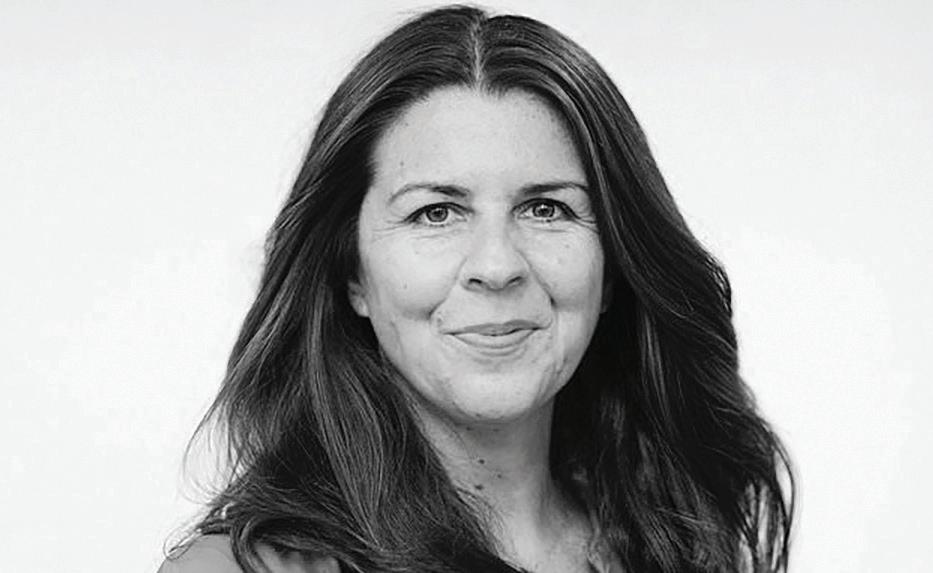
000 /// JANUARY 2024 IMAGE CREDIT: Getty Images
16 /// MAY/JUNE 2024
How to attract and retain a multi-generational workforce
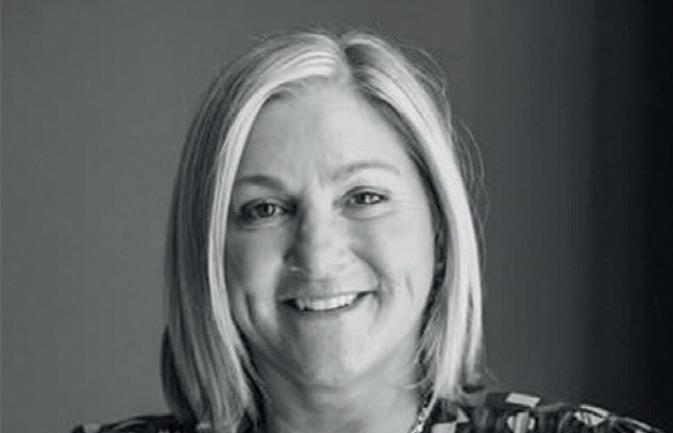
here are currently five generations working side by side in the UK labour force. Thanks to an ageing population, the cost-of-living crunch and changing attitudes to retirement, businesses are supporting staff whose core cultural references span everything from The Beatles to ChatGPT.
TToday’s multi-generational hiring market is a win for diversity, but it creates complex attraction and retention challenges. How can small and medium-sized companies be all things to all cohorts? And how can they cost effectively deliver on each age group’s preferences and priorities?
While it’s easy to focus on pitfalls, stereotypes and preconceptions, different demographics can still successfully coexist and collaborate. Each segment contributes singular strengths, perspectives and experience to the workplace. So, what elements do you need to take into consideration to take advantage of a synergistic solution to the UK’s widening skills gap?
Align policies and benefits
When age-diverse workforces are the norm, businesses need to deliver pay and benefits packages that satisfy everyone from graduates to grandparents. For example, while generous
salaries, flexibility and work-life balance are universally valued, recent LinkedIn data shows young workers prioritise career advancement (36 per cent) and skills development (34 per cent). Within this cohort, corporate purpose counts. The Deloitte Global 2023 Gen Z and Millennial report found that “Zoomers” want to be morally and ethically aligned with their employers and for their role to drive change.
At the other end of the spectrum, senior staff look for stability and age-inclusive workplaces. Think solid pensions, health MOTs and flexible working arrangements. Increasingly popular phased retirement plans allow staff gradually to step back from their roles, while companies retain expertise and facilitate knowledge transfer to their wider teams.
Mid-lifers, particularly women over 50, are the fastest-growing section of the working population. This time-poor generation of carers – tending to parents, toddlers and teenagers –require support to keep the plates spinning and thrive personally and professionally. Benefits need to include menopause policies, flexible work options, mental health and wellbeing schemes and career sabbaticals.

Commit to career-long learning
With working lives now extending to more than 50 years, companies need professional development plans that endure. Done well, these lifelong learning programmes keep key skills sharp, boost staff retention and create vital intergenerational connections.
According to research from the Transamerica Institute, employers most often use job training (46 per cent), mentorships (36 per cent), and professional development opportunities (32 per cent) to promote continuous advancement and foster a multi-generational workforce.
Communicate effectively across the generations
While every generation contributes unique skillsets and strong points, they also labour under stubborn and divisive stereotypes: boomers are out of touch; gen X can’t handle change; millennials are work-shy snowflakes.
To build respect and boost productivity, introduce initiatives that develop collaboration and understanding. These could include:
• Normalise success at any age, challenge age-linked value. Reward behaviours that champion an age-inclusive culture.
• Consider workshops that bring colleagues together to find team-based solutions and share experience and expertise.
• Implement intergenerational mentoring programmes that foster knowledge exchange, skills development and shared objectives. Upend traditional dynamics by allowing younger employees to guide senior colleagues.
• Create age-diverse teams of colleagues with different outlooks, approaches, and experience levels. Committing to a clear organisational purpose can nurture community spirit and achieve common goals.
To navigate seismic shifts such as the AI revolution and green transition, businesses need all hands to the pump. Through proactive recruitment, effective communication and employee support, organisations can build cohesive and age-inclusive workforces equipped for the challenge.
Our candidate pool has never been richer, wider or more diverse, but to unlock its firepower, we must take front-footed routes to engagement, rewards and retention – and make multi-generational management a key priority.
Niki Turner-Harding is country head, UK and Ireland, at Adecco
BUSINESS LEADER /// MAY/JUNE 2024 /// 17 EXPERT NIKI TURNER-HARDING /// TALENT MANAGEMENT ///
/// MAKING DECISIONS ///
Everyone is in favour of a point of difference, but only after it has worked
ED SMITH
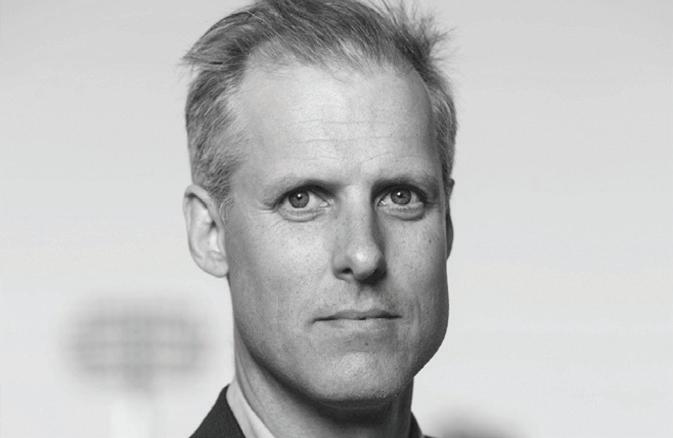
oliticians cling to how messages “land” in focus groups and polls, businesses to market research, and creatives to recent hit successes. Whatever the sector, the impulse is the same: to discover and understand what’s working right now for other people.
PBut the crucial part of that sentence isn’t “what’s working” but “other people”. Because you aren’t other people and the fact it’s working for them doesn’t mean it will work for you –still less that you should be relinquishing your own unique perspective along the way. “If I’d asked people what they wanted,” quipped Henry Ford, “they’d have said a faster horse.”
Five years ago, I co-founded the Institute of Sports Humanities (ISH). The inspiration came from two personal experiences. First, when I’d been made captain of my professional cricket team, I looked around for a university leadership programme that could help prepare me for the position, but failed to find one.
Second, a decade or so later and now working inside academia, I felt that sport was wrongly positioned inside university bureaucracies. It was often stuck in a silo, unable to break free
from its academic origins in physical education. There was so much “sports science” and so little “sports humanities”.
My vision for ISH was to help leaders in sport (both on and off the field) by encouraging the interplay of theory and practice, unifying different academic tools in an inter-disciplinary approach and by viewing sport within the context of wider culture. While there are always technical and scientific strands to sports leadership, I’ve never seen a solely technical or scientific approach turn out to be successful. Sport is played by human beings and entertains human beings. If you forget those two facts, you’re moving away from the essence of the whole enterprise.
Inevitably, when founding the Institute, we soon encountered pressure from academic insiders to reconsider and retreat into the triedand-tested “sports science” space. If I’d been a more reasonable person, I’d have flipped.

However, ISH was lucky to have the support of the sports entrepreneur Andrew White and the educationalist (and then University of Buckingham vice-chancellor) Sir Anthony Seldon, who were both prepared to take a different approach. We wanted to encourage the most interesting conversations at the intersection of elite sport and academia –everything else would flow from that.
If we’d followed what everyone else was doing, ISH wouldn’t have found its voice. Five years on – while it still feels like very early days – ISH has educated captains, coaches, technical directors and business leaders from across all leading sports. (In the opening round of the 2024 first-class cricket season, one ISH student was bowling at another – with the batsman going on to make 335 not out in his first game as club captain.)
Differentiation, however, comes with a very important “but”. If the motivation to deviate from the consensus crowd is political expedience or just PR, then the contrast will only be skin deep. Differentiation at philosophical level should drive a USP, not the other way around. Trying to be different for the sake of it is already trying too hard.
While I’ve never liked the saying “too clever by half” (instead, the greater threat is “too stupid by far”), there is something useful in the phrase’s implied warning. Exaggeration shouldn’t be allowed to impinge on effectiveness. It also calls to mind Nicolas Chamfort’s aphorism: “Having lots of ideas doesn’t mean you’re clever, any more than having lots of soldiers means you’re a good general.”
There is a parallel here between interesting projects and interesting people. When a person self-consciously strives to be different or eccentric, it’s usually boring. When people are different or eccentric due to a naturally distinct way of seeing things, they are usually interesting. (Genuine eccentrics, after all, think it is “normal behaviour” that is strange.) Though he exaggerated the case, C.S.Lewis put this brilliantly: “Even in literature and art, no man who bothers about originality will ever be original: whereas if you simply try to tell the truth…you will, nine times out of 10, become original without having noticed it.”
Differentiation has important implications for building effective teams. A team or group isn’t likely to achieve collective distinctness if they are all alike individually. Diversity of background is only part of the point here (and the lesser part). Instead, it’s the
18 /// MAY/JUNE 2024
IMAGE CREDIT: Getty Images

‘A team or group isn’t likely to achieve collective differentiation if they are all alike individually’
diversity of habits and outlooks that is more fundamental. If you’re hiring people whose world views are comparable, then you’re not adding much value to the whole. However, hiring people with personal intellectual conviction is always going to expand the collective bandwidth and creative tension. What if we turn the challenge towards our
own lives: are we in the right places and around the right people to give ourselves the best chance of achieving personal differentiation?
A novelist friend, someone with no interest in sport, once posed an important question when I was in my late 20s about cricket that I couldn’t answer:“Can you play cricket significantly differently from other professional players?”
The answer (which I didn’t admit but knew deep down to be true): not differently enough to justify extending the commitment.
My friend’s question emboldened me not to continue with my playing career (I retired from cricket at 30) to the detriment of other possibilities (even though I’d have to start over and begin further down the ladder).
It’s not only cautiousness that prevents us from doing something different and interesting. Another risk is getting too comfortable.
Ed Smith is director of the Institute of Sports Humanities and author of Making Decisions
BUSINESS LEADER /// EXPERT MAY/JUNE 2024 /// 19
Lessons and habits UK business owners can learn from across the pond

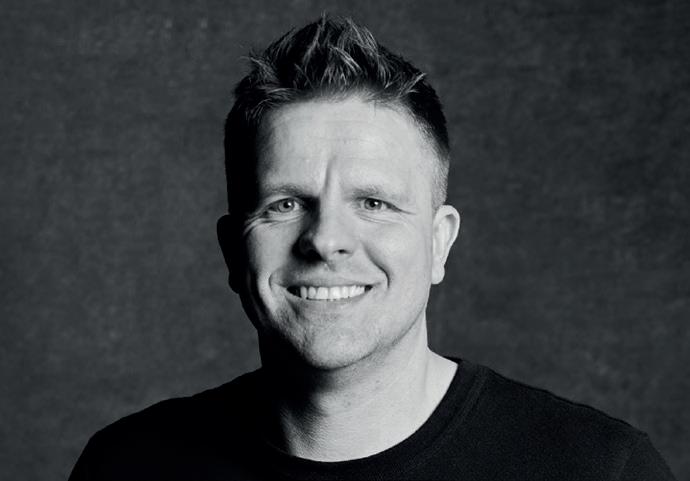
When I interview guests on my High Performance podcast who are from the US, I notice their different approach to life and business.
I love talking to fellow British entrepreneurs or discussing success stories, but I sometimes get the feeling they’re focused on what the podcast can do for them. However, when I speak to guests from across the pond they
have a real mindset of collaboration and encouragement. When we finish interviewing these guests and they head for the door, their parting comment is: “If there’s anything I can do for you, let me know.” I feel that in American society it’s ingrained in them to lift each other up and celebrate the successes of another person, company or project. I think we need to be much better at doing that in the UK. We’ve made more than 300 episodes of
20 /// MAY/JUNE 2024 JAKE HUMPHREY IMAGE CREDIT: Getty Images /// HIGH PERFORMANCE ///
High Performance. Despite the incredible conversations we’ve had, I’ve never been more excited than I was before interviewing Robin Sharma, who wrote The 5AM Club. His entire life and business is built on how he can help as many people as possible. His new book, The Wealth Money Can’t Buy, talks about fortune in a way that many people don’t. We all think of wealth as our assets, the size of our house and the money that’s in our bank account. Sharma talks about wealth as personal growth, creating your craft, community, and the wealth that comes with family.
I want to share a few of the key tips from our interview. The first thing I learned is not being a resentment collector. Sharma sees resentment as an energy, and any time you’re using that energy, it removes it from a different area of your life that you could apply it to.
That leads to the second point he made, which is that other people’s success is your success.
I think this is a really powerful concept for everyone reading this column. No matter what industry you’re working in, if there’s a business or a person in that sector that is doing amazing things, have this idea that their success is yours. Why? Because they are adding to your industry. Not only that, but if they can do incredible things, then you can do incredible things too.
The next thing that he spoke about was working on your craft. This is making sure that every single day you do something that moves you closer to the person that you want to be.
He also talks about choosing the people around you. Everyone reading this will have their own way of hiring people. My method is to not go through a lengthy interview process as the chances of the perfect person being available at that moment are slim. Instead, I love the idea of collecting and meeting people on my journey, and then trying to find a way to work with them.
Sharma has two big lessons in this space. The first is to think about the people who are in your life who are not just business associates – partners, loved ones and really close friends. You spend a lot of time with them. So when you meet someone for the first couple of times, ask yourself a very simple question – could I sit and have 10,000 dinners with this person? If the answer is yes, then they definitely deserve a place in your life. If the answer is no, then you need to ask yourself whether they’re the sort of person you should be investing your time with and using your energy on. Sharma also made the point that you’ve got a choice
– you can be happy or you can hang out with toxic and negative people. You don’t get to do both.
He also spoke about hard work, which is connected to a philosophy which he calls APR –absolute personal responsibility. It doesn’t mean that things aren’t going to happen. It stresses that you’re responsible for how you respond to certain situations or challenges.
Sharma talks about money because money is one of the key drivers of wealth. He has spent his life surrounded by money masters, working with some of the biggest global CEOs,
the cemetery?
He also reveals that money masters are comfortable with being ridiculed. You can do exactly what the other 95 per cent of people are doing in the world, but you will get the same results as those 95 per cent. If you want to stand out, if you want to be different, if you want to create something distinct, find the five per cent of whatever it may be that people aren’t bothered with or occupied by and focus in on that space. Yes, it’s the five per cent that will bring the criticism, it will bring the ridicule, it will bring the naysayers. Your
‘I love the idea of collecting people and meeting people on my journey, and then trying to find a way to work with them’
billionaires and elite sportspeople. You think of a well-known entrepreneur on the planet and Robin Sharma is more than likely going to be their personal mentor. Sharma says he has worked with hundreds of them and that at the end of their days they would trade every single penny they’ve ever earned to possess physical wealth. So when we talk about success in business, we must not compromise on taking the time to ensure we have a healthy lifestyle where physical and mental wellness is at its core. What’s the point of being the richest person in
job is to become comfortable with that. The final quality that Sharma talks about when building successful businesses is that good habits beat IQ. People talk so much in business about intellect or what your qualifications on a piece of paper are, but it’s so often good habits that are the real game changers.
Jake Humphrey is the host of the High Performance podcast and co-founder of Whisper Group

BUSINESS LEADER /// MAY/JUNE 2024 /// 21 EXPERT
Incorporating ethnicity pay gap analysis



Let’s narrow the divide on the unfinished business of pay gaps ///WOMEN IN BUSINESS ///
espite its very existence, there seems to be no resolution to the UK’s gender pay gap –the difference between what men and women earn – and we know these figures because of transparency legislation.
DSince 2017, the law requires companies with 250 employees or more to reveal their gender pay gap annually. This year marks a significant milestone as we see the gap narrowing to its smallest margin so far. However, with women still earning 91p for every £1 that men earn, is that progress?
The gender pay gap can be misunderstood and often misreported as some talk about equal pay, others about equality and many about average
gaps. Equal pay for equal value is about men and women receiving identical compensation for jobs that demand similar levels of skill, effort and responsibility. The legal framework for this is governed by the Equality Act 2010, which aimed to strengthen anti-discrimination.
Although the legislation focuses on average wages, it fails to address the nuances of equal pay and pay equity, and masks deeper inequalities within organisations. One question stands unanswered before business leaders: if progress to equality is slow, how can we catalyse genuine improvement?
The path to bridging the gender pay gap extends beyond mere compliance, requiring a proactive and comprehensive approach from businesses:
This provides a more granular view of pay disparities, unearthing inequities that intersect with gender, fosters a more equitable workplace and a commitment to inclusivity;
Enhancing transparency of pay practices
Offering employees clear insights into pay structures to promotes a culture of trust and openness. This encourages dialogue around pay equity and can prevent potential disputes; Adopting gender-neutral job evaluations
Assessing roles free from gender bias and accounting for occupational segregation ensures compensation is equitable. Recognising and rectifying gender biases in certain professions can ensure more balanced pay structures; Fostering continuous improvement culture
Cultivating an environment where pay practice feedback is acted upon can drive sustainable progress. Engaging employees in discussions about pay equity and diversity solidifies a firm’s dedication to these principles;
Insight-driven, strategic decision-making
Utilising data analytics to understand the root causes of pay gaps can shape more effective strategies. By analysing trends, companies can gauge the effectiveness of their initiatives and adjust approaches accordingly.
Beyond the moral obligation, companies that prioritise pay equity and diversity stand out as leaders in ethical business practices, enhancing their brand reputations. Furthermore, research shows that diverse and equitable workplaces are more innovative, productive and profitable. Despite the reduction in the gender pay gap, true equity remains elusive and achieving it requires transcending basic legal compliance. By adopting a holistic and strategic approach, businesses can address this, unlock the full potential of their workforce, advance equality and contribute to the broader societal good.
Zara Nanu is a serial entrepreneur and member of the Women’s Leadership Board at Harvard Kennedy School

22 /// MAY/JUNE 2024 IMAGE CREDIT: Adobe Stock
ZARA NANU
Tomorrow’s teens could have a longer attention span thanks to social media
CASPAR LEE

When the printing press was invented in the 15th century, there were concerns among some about the negative effect that excessive reading could have on young people. Fast forward 500 years and we saw a similar reaction to the invention of the television. Parents and teachers alike were worried about the impact of too much TV on children’s social and cognitive development. In 2005 YouTube came along, and these worries ramped up still further.
YouTube generates much of its revenue from advertising. This means the more time users spend on the platform, the more money it makes. It does not have much of a say on what specific content its creators make, instead it has an algorithm that rewards creators with views when they keep their audience engaged for longer. These views result in more advertising money, which YouTube and the creators split.
For creators to get more views, the first step is to get as many people clicking on their thumbnails – the preview image on a video – as possible. The second step is keeping viewers watching for as long as possible. The first step
is measured as click-through rate, or CTR, and the second as average watch time.
When I was building my YouTube channel, all creators needed to focus on was CTR. This meant creating videos that were referred to as clickbait, because the more clicks a video got, the more it was served to viewers. You could title your video “I can’t believe this happened”, accompany it with a thumbnail picture of your mouth wide open and hit one million views.
Over time, the algorithm started penalising clickbait. YouTube realised that when viewers felt tricked, they spent less time on the platform, which affected advertising revenue. Creators also realised that if people clicked their videos but only watched for a few seconds, or skipped through entirely, it would hurt their business more than having fewer people clicking but watching for longer.
This encouraged creators to deliver on their thumbnail and title promises, and optimise every second of their videos. They started using retention editing, with more cliffhangers than CSI: Crime Scene Investigation, giving viewers little chance to click away. Creators even started cutting out pauses between words to maximise every moment of their content.
The king of high watch time is American YouTuber MrBeast. His meteoric rise led to thousands of copycat creators who believed that the secret to success was to edit videos and act exactly like him. This resulted in an abundance of homogeneous content, usually involving too much shouting and filming Lamborghinis in strange locations. But this missed the real reasons why he was so successful: his originality, work ethic,
content investment and creative genius.
Yes, the MrBeast-ification of YouTube videos did boost view times and revenues for several creators, but it also made me question whether a generation of kids would only want to watch videos that fulfilled their quick-hit content needs. Like the worried parents during the rise of the printing press and popularisation of TV, I thought attention spans and cognitive abilities were only going one way.
However, this year the pendulum is swinging back towards the creation of more cerebral, less hyperactive content. Algorithms are discovering that viewers spend more time watching content that doesn’t numb their minds. MrBeast has now started to lengthen his videos and shout less.
Another place where this trend is taking hold is on TikTok, the exemplar of short-form content. Videos were initially limited to 15 seconds, increasing to 60 seconds in 2017 and now it allows up to 10 minutes. Longer-form, less-edited clips are popular as audiences click away from cheap editing tricks. The very algorithms designed to keep me watching are learning that the only way to do so is by offering more valuable content. This means surfacing videos to me that allow me to relax, watch something meaningful and maybe even grow my cognitive abilities just as if I was reading a book or watching a documentary.
So I’m going out on a limb: the teens of tomorrow might actually have longer attention spans than the ones of today. In fact, perhaps they will have to care for us poor millennial and Gen Z souls still stuck at the wrong side of the pendulum swing.
Caspar Lee is the co-founder of Influencer.com and Creator Ventures

BUSINESS LEADER /// EXPERT IMAGE CREDIT: Getty Images MAY/JUNE 2024 /// 23 /// ENTREPRENEURS ///
CATHERINE BAKER /// SUSTAINING
PERFORMANCE ///
Under pressure? Control your emotions, shift your mindset and self-talk
Iwas privileged to give a talk recently at King’s College, Cambridge, where I asked the audience to reflect on a couple of questions that evening: when you’re feeling under pressure, how do you respond? And what do you say to yourself?
In the Q&A session afterwards, one of the audience members asked why I had chosen to focus on that area. My response? Elite sport can teach us some brilliant lessons around how we manage our emotions and respond to pressure. It is precisely these moments that are built into the fabric of how elite sport operates.
Pressure itself is just as real away from elite sport and, whatever the environment, increased pressure drives an emotional response. We all have feelings, even those who like to pretend they do not. Our emotions can help our performance, but they can also hinder it, and our ability to manage them is critical to sustained, long-term performance.
Some of the high-pressure situations commonly faced by those in business include taking on a new role, spearheading or pushing through significant change, scaling up a business and pitching for much-needed funding. In any of these scenarios, we can let the pressure get to us and get hijacked by our emotions, impacting adversely on our performance both in the moment and in the long term.
Or we can flip the script and learn how to use our emotions to our advantage, enabling us to achieve our potential and sustain our performance. So, what are the lessons that elite sport can teach us about handling and managing pressure?
Step one: Own it
The clear lesson that the field of sports psychology has shown during the past 20 years is the importance of recognising that emotions play a part in performance. The key is to own that response. In my book Staying the Distance, I tell the story of the cyclist Sir Chris Hoy and the moment when he realised that he needed to own, and develop, this area of his performance. He was already successful – he had won a world title and an Olympic silver medal – but he knew he could do better. He realised that, due to the circumstances surrounding one race in particular, this element was holding him back.
Elite sport has accepted that an emotional response to pressure is normal. This means you can build an ability to deal with it – and even leverage it – to drive positive performance over a sustained period.

Step two: A shift in mindset
The answer to dealing with pressure lies in a simple change in mindset. Elite sport – and the sports psychologists who operate in this field – work hard at helping athletes adopt a “challenge”, as opposed to a “threat”, mindset. By doing this, it enables us to move our neural activity away from the amygdala (which triggers our flight, fight or freeze response) to the pre-frontal cortex, which is responsible for executive planning and control. That will mean you are alert, ready and excited, rather than tense, agitated or worried. This doesn’t mean attempting to cancel out all reactions but instead being focused on discarding the unhelpful emotions, while keeping, generating and leveraging the more helpful ones.
‘Who do you think you spend most of your time talking to? For most people, it’s themselves’
This is backed up by research from Harvard Business School, conducted by associate professor Alison Wood Brooks. The experiment focused on people executing various activities that generated pre-performance anxiety: doing maths problems in front of others, public speaking and karaoke singing. Some of the individuals were encouraged to reframe their anxious sentiments as excitement. The results demonstrated that harnessing the feelings caused by anxiety and using those same sensations positively, turning them into excitement, had a beneficial effect on performance.
Step three: Self-talk
Self-talk is an accepted focus area in the world of sport, so it always amazes me that it’s not more widely discussed in the fields of business and leadership. Who do you think you spend most of your time talking to? For most people, it’s themselves.
One of the first pieces of research on this area in the world of elite sport was carried out by performance psychologist Jim Loehr, when he brought together a group of elite tennis players
24 /// MAY/JUNE 2024
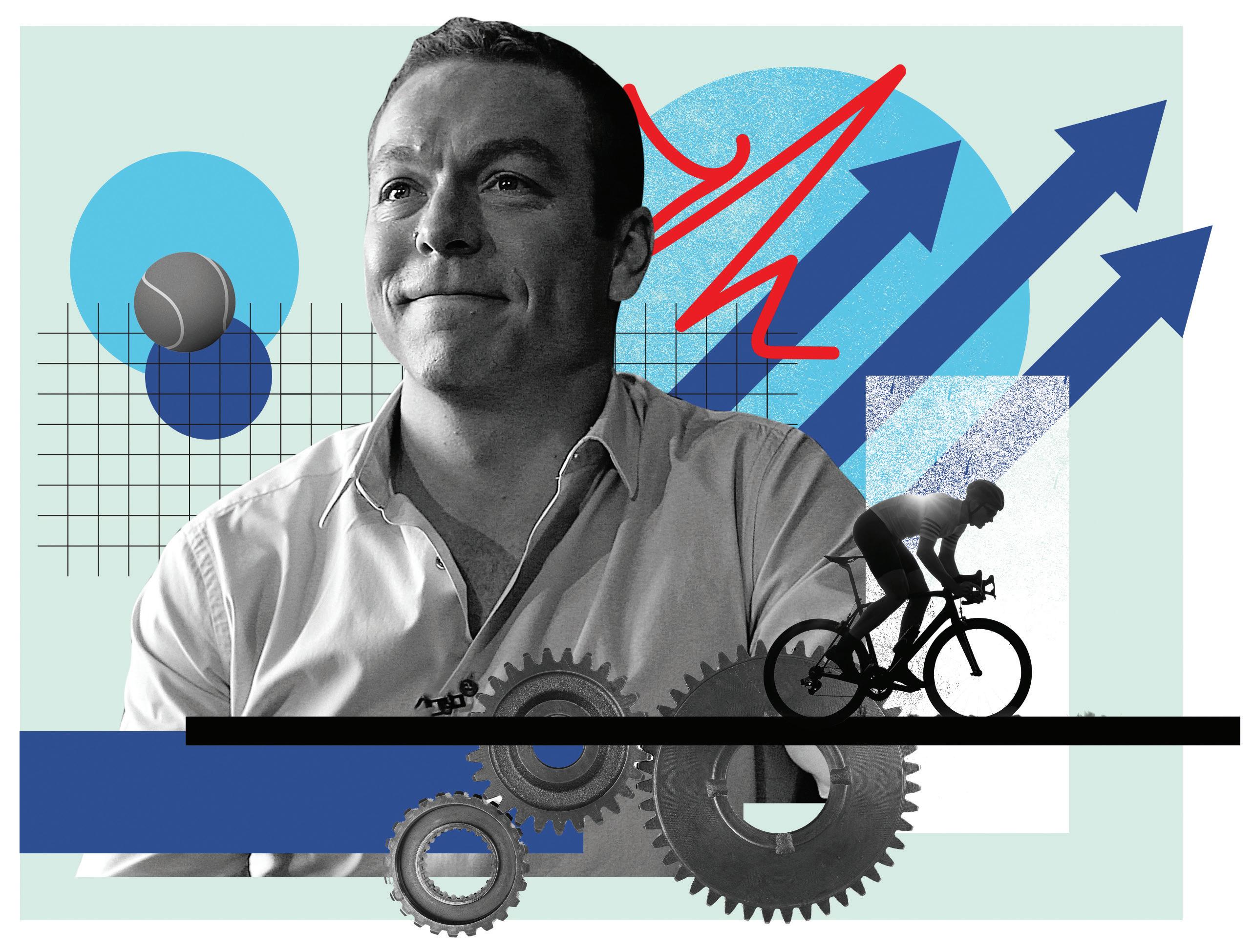
for a week-long experiment. He asked them all to voice their self-talk during both training and matches throughout the week and recorded it. He condensed the recordings for each player to a five-minute reel and asked them to listen to it.
The results? They were shocked by the negativity in their comments. “I’m rubbish,” said one. “My forehand is awful,” said another. “I shouldn’t be on this court,” said a third. Off the back of this exercise, Loehr and his players spent time working on changing their self-talk to language that was much more positive and constructive. Accordingly, the results flowed in a more positive way.
The Harvard research referred to above reinforces this point. Participants were assigned phrases and told to tell themselves, either
“I am calm” or “I am excited”. Just the use of the latter phrase had a positive impact on their state of mind and their performance.
The trick here is to experiment and see what might work for you. It could be a word, phrase, or even a question that works best. Danny Kerry, coach of the GB women’s hockey team that won gold at the Rio Olympics in 2016, asks himself “where am I?” and “where do I need to be?” to make sure he is in the right place. I know of other leaders who use sticky notes or similar as visual reminders to help them stay in a challenge mindset. So, let’s consider those questions I posed at the start again. When you’re feeling under pressure, how do you respond? And what do you say to yourself? Take the time to consider both and you may find
you start to understand yourself and how you can manage pressure more effectively.
Catherine Baker is the founder and director of Sport and Beyond and author of Staying the Distance
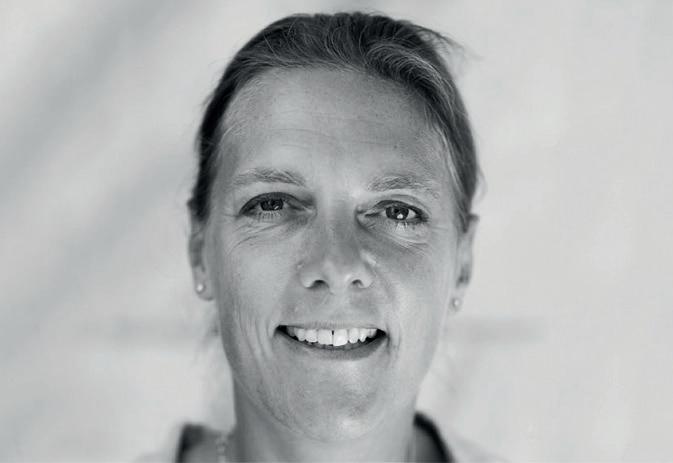
BUSINESS LEADER /// EXPERT MAY/JUNE 2024 /// 25 IMAGE CREDIT: Getty Images
Some see a mountain to climb.

Others, a chance to scale.
Businesses who bank with us see things di erently. However you see your business growing, we’ll support you – from start-up to IPO and beyond – connecting you to new markets, new insights and new possibilities. Search Grow with HSBC
Issued by HSBC UK Bank plc, 1 Centenary Square, Birmingham, B1 1HQ, United Kingdom. ©HSBC Group 2024. All Rights Reserved. AC64582

MAY/JUNE 2024 /// 27 /// Discover the real stories behind success and failure /// CASE STUDIES BUSINESS LEADER /// 28 Bootstrapping The founders who built their business without external funding 34 Sole control Virgin Group’s CEO on working under Sir Richard Branson 38 Supersizing Nando’s The spicy story of its global growth and success 42 Scale-up lending OakNorth Bank on backing fast-growing businesses 34 IMAGE CREDIT: Rory Lindsay
The bootstrapped businesses best
The founders who grew their business without bringing in external investors and how they did it
JAMES
COOK, ALICE CUMMING & ANDREW LYNCH
The founders of some of the world’s most successful companies started out by bootstrapping – building their business using just personal finances or operating revenue. This allowed the founders to retain 100 per cent ownership and control of the business for as long as possible – and some still have it.
Although bootstrapping a business can limit your resources, it can encourage speed and focus, says Deniz Ucbasaran, professor of entrepreneurship at Warwick Business School. “Entrepreneurs can also become creative,” she adds. “As they say, necessity is the mother of invention.”
Here are the businesses that did bootstrapping best...
28 /// MAY/JUNE 2024

Virgin Group
Sir Richard Branson’s business empire began when he dropped out of school aged 16 to launch Student, a magazine for young people
He sold almost £5,000-worth of print advertising in its first run of 50,000 copies in 1968, later growing its circulation to 100,000.
In 1970, Branson turned the magazine into a mail-order record retailer, opening his first store in 1971. Using the store’s revenues, he co-founded Virgin Records with Nik Powell in 1972. Virgin’s first release, Mike Oldfield’s Tubular Bells, sold more than five million copies and, aided by controversial signings such as the Sex Pistols, Branson grew his estimated net worth to £5m by 1979.
With forays into air travel, space travel, gyms, banking, telecoms, media – and even a failed attempt to rival Coca-Cola – the Virgin
Group now consists of more than 40 companies across 34 countries which employ more than 70,000 people (see page 35). Although Virgin has attracted high-profile partners and investors to work on its different ventures, including Stagecoach in trains and One-2-One in mobile, the Branson family still own 100 per cent of the main business and brand.
Writing in the US magazine and website Entrepreneur, he said: “Our partnerships turn out best when we find an investor who takes a minority stake in a venture and provides capital and support, but leaves us to run the business and hire key employees. When you are evaluating a proposed partnership, do not focus only on the capital you need to kickstart your business.”
RANKINGS
MAY/JUNE 2024 /// 29
Gymshark
When Gymshark sold a 21 per cent equity stake in 2020 it achieved unicorn status – a business valued at $1bn or more – having previously raised no external funding.
The fitness apparel brand was founded by Ben Francis, right, in 2012 while at Aston University and bootstrapped from his bedroom while he worked as a delivery driver for Pizza Hut across Birmingham. Gymshark started out dropshipping supplements, meaning it was selling online without owning or operating the locations where its products were made or stored. On an episdoe of the How Success Happens podcast, Francis said: “Because we were dropshipping, we didn’t need sales because we didn’t really have any costs.”
However, costs began to increase once the firm pivoted to manufacturing fitness apparel. Using the money he earnt as a delivery driver, Francis bought a sewing machine and screen printer and spent the next two years making athleticwear by hand.
The company got its big break after spending £3,000 to set up a stand at a fitness expo,
which Francis quit his job and dropped out of university to attend. After the event, the website was inundated with orders and went from generating £300 a day in revenue to £30,000 in 30 minutes. Gymshark spent the next couple of years attending fitness expos around the world, building the brand.
Today, the company employs more than 900 people, has customers across 230 countries and boasts a social media following of more than 18 million.


Bet365
Denise Coates, left, began her career working in her father’s bookmaking firm, Provincial Racing. She was initially employed in the cashiers’ department but, after leaving university, worked there as an accountant. She eventually becoming managing director of the small chain of shops in 1995.
In January 2000, Coates purchased the domain name Bet365.com for £20,000 and launched it as an online betting site the next year. It started with just 12 employees, one of whom was Coates’s brother John, who she convinced to join as co-CEO. The two of them met with numerous private investors but failed to secure investment, instead borrowing £15m from RBS in a loan secured against the family’s betting shop estate.
Coates recalls working round the clock from a Portakabin in the car park of one of her father’s shops in Stoke-on-Trent to build the company.
Speaking to The Guardian, she said: “You
start a 24/7 business and you work 24/7. When you’re not here [in the office], you take calls in the middle of the night, regularly – that’s how the early days were.”
By 2005, the online gambling brand had become so successful that Provincial Racing was sold to betting shop chain Coral for £40m and the RBS loan was repaid. Today, Bet365, which is still 93 per cent owned by the Coates family, has more than 90 million customers and more than 7,000 employees worldwide. Its revenues reached £3.39bn in 2023.
In 2018, the firm announced plans to expand to the US following a ruling that allowed states to regulate sports bettting.
When Coates was awarded a CBE for services to the community and business in 2012, she reflected on the firm’s beginnings.
“We mortgaged the betting shops and put it all into online. We knew the industry required big startup costs but we gambled everything on it.”
30 /// MAY/JUNE 2024
Hargreaves Lansdown
Peter Hargreaves, below, has a claim to greatness he thinks has gone unrecognised: that he and his business partner, Stephen Lansdown, are the only entrepreneurs to have built a FTSE 100 company without borrowing a penny.
The pair founded Hargreaves Lansdown in Bristol in 1981 and by the time they floated 25 per cent of the equity in May 2007, it was valued at £800m. After peaking on the FTSE 100 with a value of almost £9bn, the funds supermarket has been relegated to the FTSE 250 and is now worth £3.3bn.
The business began in Hargreaves’s front bedroom. “We were exceedingly mean when we started,” admits the 77-year-old Lancastrian billionaire. “We had one borrowed desk, one second-hand desk and we bought a desk because we had a secretary and we didn’t think we should sit her at a sloppy desk. We never spent a penny where a halfpenny would do.”
Being in financial services allowed growth without the large-scale investment a sector such as manufacturing might demand. All the same, says Hargreaves, they didn’t have “silly overheads”. “We didn’t buy expensive office equipment. We didn’t have flashy offices.”
So why the public offering? “Stephen did want to take some money off the table, which is always wise. I didn’t. And then we had a third very important member of the team, Theresa Barry [marketing director]. She was the deciding factor.
“She said that if we were a public company, our accounts were made public and we had outside shareholders, we would be more challenged. And quite rightly so.”
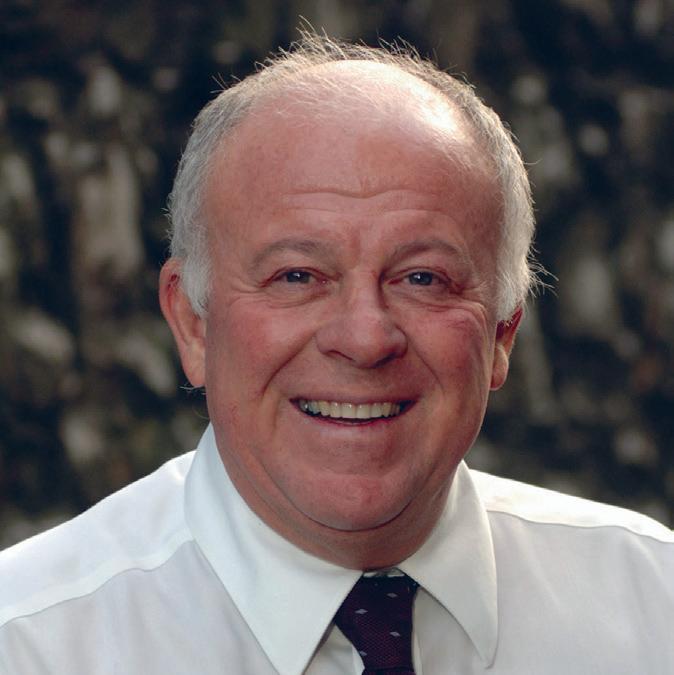
Home
Bargains
British variety store chain Home Bargains was founded in Liverpool as a single store called Home and Bargain in 1976. Its founder, Tom Morris, is a third-generation shopkeeper whose parents’ approach was to sell products at the best possible price. If Morris’s parents could not source products at the right price, they, along with Morrris and his six siblings, made them themselves.
Home Bargains has operated under these guiding principles ever since, keeping many of its processes in-house. This includes product sourcing and IT development.
Growing conservatively and organically over the years meant that despite a £3.6bn valuation in 2019, the chain was debt-free and owned many of its stores.
Today, it is one of the UK’s largest privately owned companies. Home Bargains has more than 500 stores and more than 22,000 staff, while revenues for the year ending June 2023 hit just under £3.8bn. Despite its growth, it remains family-run and family-owned.
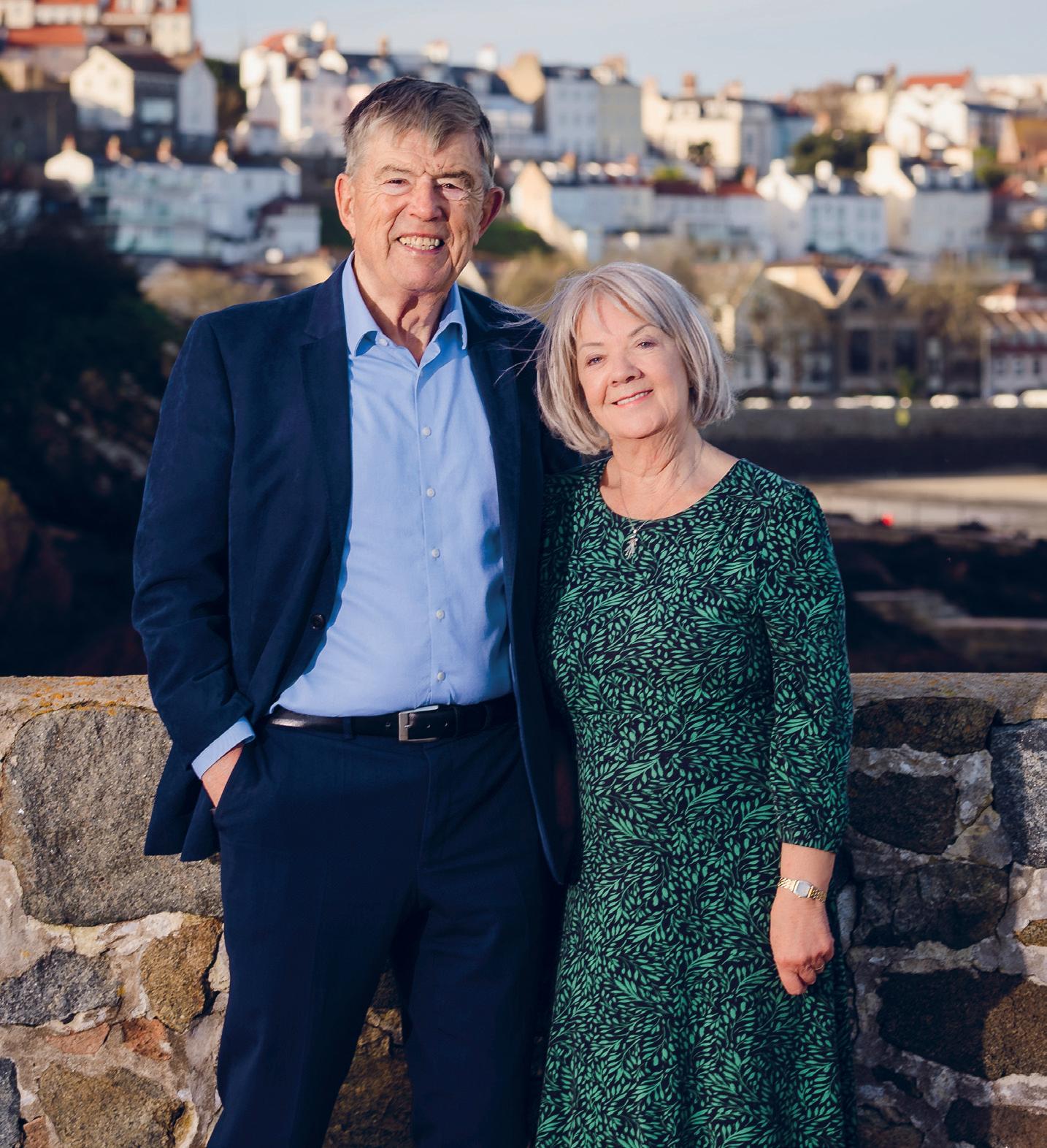
Specsavers
Doug and Mary Perkins, above, founded Specsavers in 1983 using some of the proceeds from selling a previous small chain of opticians, which meant they didn’t need external finance. Nevertheless, they kept the business lean. For the first three months, they had just two members of staff and used a ping-pong table for a desk.
In 1984, Specsavers launched in Guernsey amid a change in regulations that allowed professional opticians to advertise their products and services. Specsavers took advantage by providing a joint venture partnership. Opticians would be based in their own shops, own half the business and keep store profits, while Specsavers took a management fee for marketing, shop fittings, auditing, training and other support.
By reinvesting profits, the chain expanded to Ireland in 1990 and opened its 350th UK store in 1999. Today Specsavers has more than 4,000 partners and a total turnover of £3.55bn. Specsavers remains family-owned and has never considered selling equity.
RANKINGS MAY/JUNE 2024 /// 31
River Island
Fashion brand River Island was established in east London in 1948. Founder Bernard Lewis sold fruit, then knitting wool and eventually women’s clothing. One of the UK’s first vertical fashion retailers, River Island began in-house design and production in the 1940s.
Its first design, a white, lace-trimmed blouse with capped sleeves, was sold in 1950. Lewis’s three brothers joined the firm, then known as Lewis Separates and, by 1955, it had nine stores. Lewis said the family had nonetheless benefitted from “some wonderful, first-class executives”.
In 1965, the then 70-store empire rebranded as Chelsea Girl, before eventually becoming River Island in 1988. Today, the firm also offers menswear, childrenswear and pet collections, but its products are still designed in-house. Its turnover rose 11.6 per cent year on year to £825.8m in 2022. However, operating profits at the family-owned firm dropped 90 per cent.

Dyson
In February 1979 Sir James Dyson, right, was booted out of the company that produced his Ballbarrow – a barrow with a sphere – and he lost his patent and his business.
“I learned the importance of having absolute control of my company and not undervaluing it,” he recalls in his 2021 memoir, Invention: A Life. “I was determined not to let go of my own inventions, patents and companies.”
For the next 15 years Sir James lived in debt while he worked on a prototype for a bagless vacuum cleaner. Not just one prototype, it took him 5,127 to design a satisfactory model that he could license. At a time when you could buy a vacuum cleaner for £40, Sir James sold his for £199. And they have sold in their tens of millions. “A lot of entrepreneurs never charge enough,” Sir James, 77, told BBC Radio 4. “And if you don’t make money, you go bust.”
By 1995, two years after the vacuum cleaner’s launch, Dyson was turning enough profit to tear up the bank guarantees. Sir James and his family are now worth £23bn according to the Sunday Times Rich List. Earlier this year, his company reported sales of more than £7.1bn and profits of £1.4bn. Dyson employs 3,700 staff in the UK, with research centres here and in Singapore, Malaysia and the Philippines.
An aborted electric car project cost Dyson £500m. But he can afford to fail: “When you own the whole company, and especially if you are free of debt, from the early days and for better or for worse, all decisions are your own.”
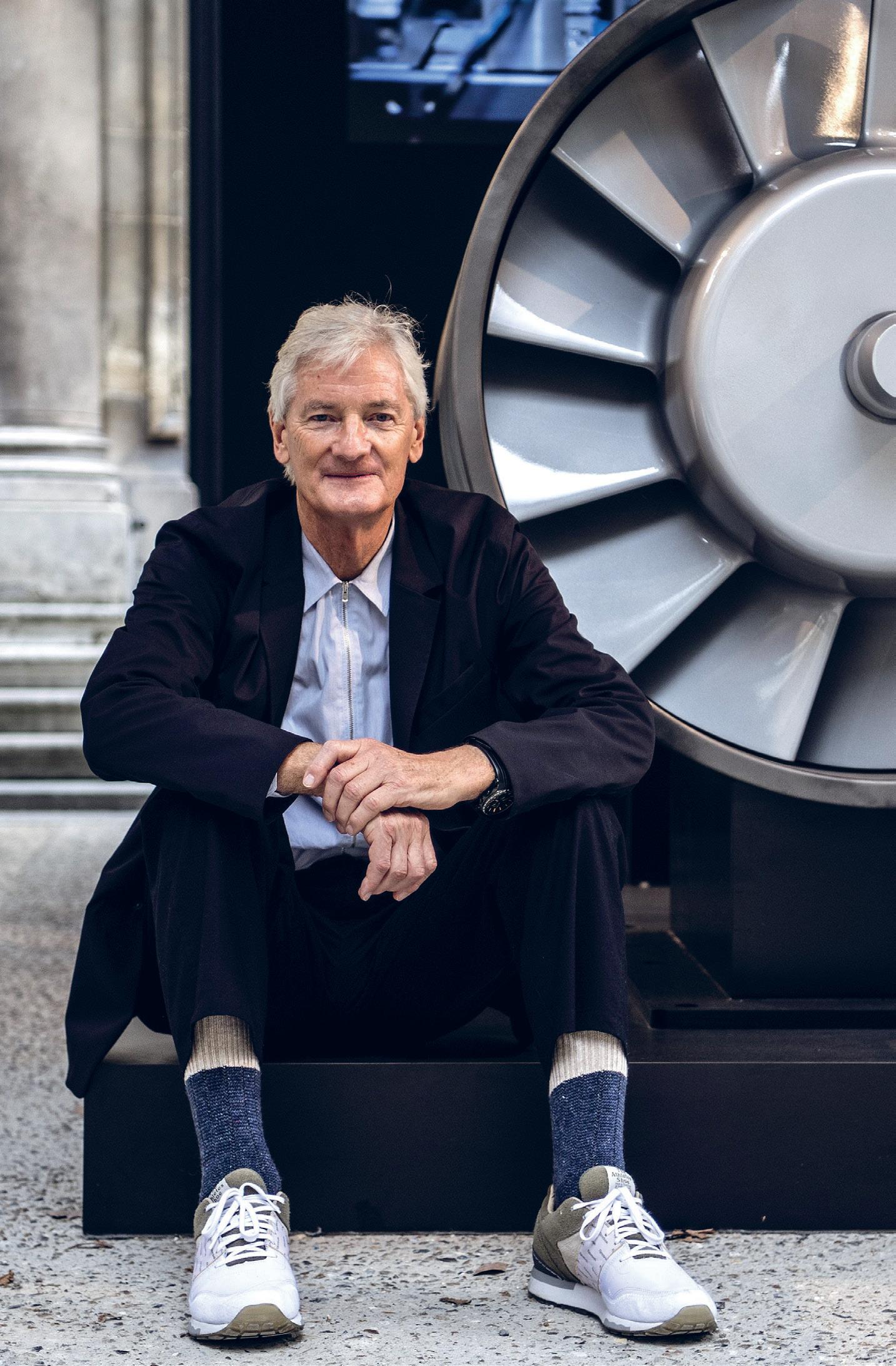
RANKINGS
The White Company
Chrissie Rucker, right, started The White Company in 1994 with £6,000 from the sale of shares her granny left her. Today the luxury homeware-to-clothing brand boasts more than 60 stores and concessions in the UK and reported sales of almost £280m in its most recent accounts.
Rucker’s business started with a 12-page mail order catalogue after Rucker furnished her then boyfriend Nick Wheeler’s home in the 1990s. “Back then, there were two ends of the scale: designer department store (fantastic quality, beautifully designed but expensive) and high street (poorly made but cheap). There was nothing in between and that was where the idea for the White Company came from,” Rucker explained to The Sunday Times Over 30 years, Rucker, 55, has only taken one investment – from fellow entrepreneur Wheeler. “I had a temporary cashflow issue,” she said. “Nick gave me £5,000 in exchange for 25 per cent of the business.” But after he failed to propose, Wheeler recalled: “She marched into my office with £5,000 in cash,
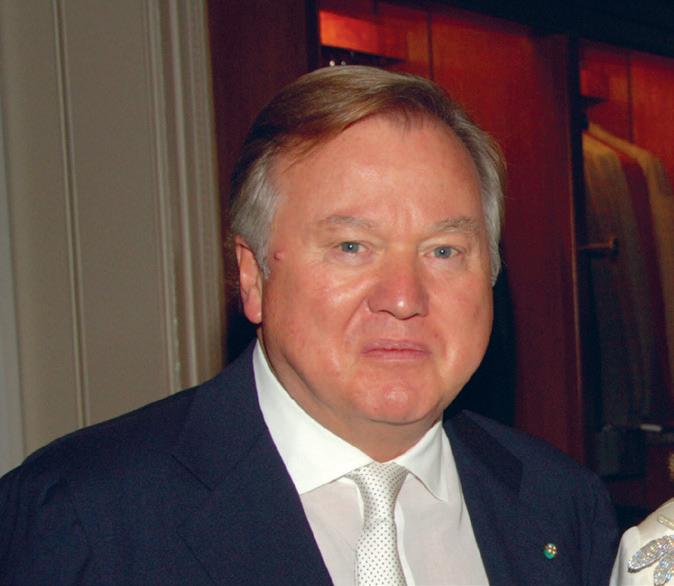
JCB
Joseph Cyril Bamford founded heavy equipment manufacturer JCB in a tiny lock-up garage in Uttoxeter in 1945. Using a £1 welding set, wheels and tyres from a Grumman Hellcat fighter aircraft, and hubs from a small howitzer, Bamford built his first
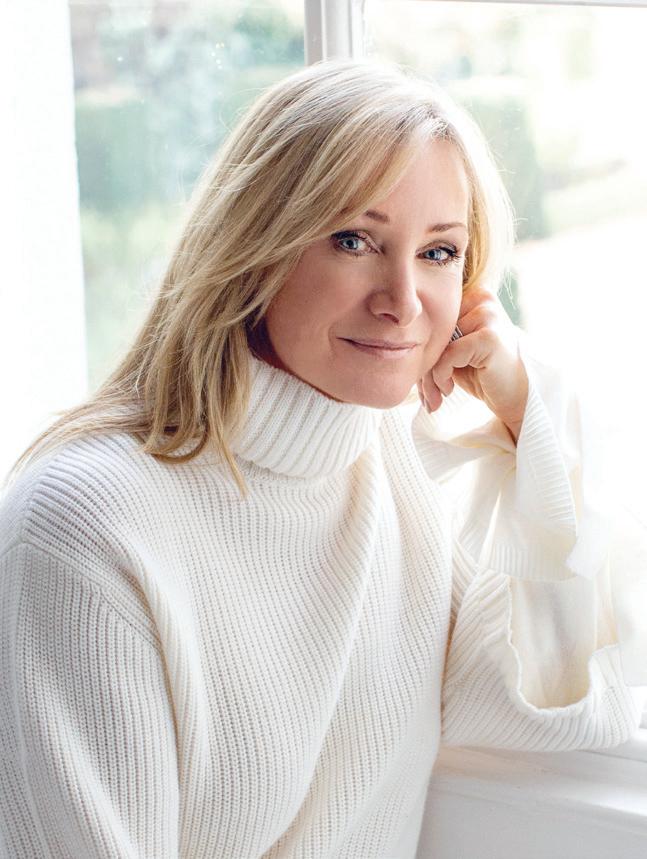
and said: ‘I want my shares back, and I think the relationship is over.’ I was in a state of shock, and that was the end of my 25 per cent of the White Company.”
When they married soon after, Rucker handed him 1 per cent of the company. Last year the couple’s wealth was put at £400m by The Sunday Times Rich List: Wheeler owns clothing brand Charles Tyrwhitt Shirts. During the week, they reside in Holland Park, west London, and at weekends they descend on their stately pile in Buckinghamshire.
vehicle, an all-steel tipping trailer. It was taken to market and sold for £45 (equivalent to about £2,400 today), and the buyer’s old cart was taken in part exchange. After refurbishing the cart, Bamford sold that for £45 too.
Bamford invented the world’s first backhoe loader, the MkI excavator, in 1953. By 1964, JCB had hit sales of £8m (equivalent to £203m today) and started exporting to the US. Today, the company manufactures more than 300 different machines and sells them in more than 150 countries. Sales increased from £4.4bn in 2021 to £5.7bn in 2022, making JCB one of the UK’s most successful familyowned businesses.
Anthony Bamford, now Lord Bamford, pictured, succeeded his father as boss in 1975. He believes if JCB had been a plc, he couldn’t have made the long-term investments required. He told The Standard that City investors wouldn’t hold by the family motto: “Stick and stay and make it pay.”
Overseas Bootstrappers
Dell
Originally called PC’s Limited, technology giant Dell started in a University of Texas dorm room in 1983 when founder Michael Dell began selling disc drives and memory chips to computer enthusiasts.
By January 1984, Dell learnt that local distributors of IBM computers were being forced to buy too much inventory, so he started buying the excess computers at a discount and flipping them for a profit. He discovered he could repackage IBM PC components for up to 40 per cent less with a direct-sales model that saw him take orders by mail and phone, assemble the PCs and ship them in between one and three weeks.
Within three months, Dell was generating $80,000 a month and its founder quit college. By 1986, Dell’s revenue had grown to $34m and when the firm went public in 1988, Michael Dell sold $30m in stock to become a multimillionaire. Dell went back into private ownership at a valuation of $24.9bn in 2013, moved into data storage with the acquisition of EMC, and has more than quadrupled its value post-acquisition.
Mailchimp
Founded by Ben Chestnut and Dan Kurzius using severance money in 2001, Mailchimp is an email and marketing automation platform based in Atlanta, Georgia.
Much of Mailchimp’s success has been attributed to its business model, which saw it implement a freemium model that means users have access to a free version of the service but can pay for additional tools.
Mailchimp was acquired by Intuit in 2021 for $12bn but before that took no outside investment. That didn’t stop its growth, with the business generating an annual turnover of around $800m in 2020.
In an interview with US publication TechCrunch, Chestnut was asked whether he would consider accepting investors to Mailchimp. His response? “Today, I have two constituents to worry about: customers and employees [. . .] to have a third called investors? No, I can’t do that.”
MAY/JUNE 2024 /// 33

/// VIRGIN GROUP ///
Sole control
Virgin Group chief executive Josh Bayliss on why having just one shareholder – the Branson family – enables it to focus on the long-term
GRAHAM RUDDICK
Virgin Group may be more than 50 years old, operate in 34 countries and employ 70,000 people across its various businesses, but it still has just one shareholder: the Branson family. Sir Richard Branson started Virgin in 1970 and has avoided selling a stake in the main group or brand, instead bringing in partners and investors to work with it on an array of different ventures. In an interview with Business Leader, Virgin Group’s chief executive Josh Baylis reflects on his relationship with Sir Richard, balancing short- and long-term strategy, and learning from failure.
Virgin Group includes a huge array of companies. How do you manage that day-to-day while also exploring new opportunities?
It is about that balance. The simplest way to describe it is to think about the three main areas that we focus on as a business. First, we focus on the brand, which is the heart of our business and the thing that differentiates us from other investors. It’s a remarkable, very strong and unique brand because it gives us licence to operate in an extremely broad number of sectors. We’re in 34 countries, we’ve got 70,000 employees. A large part of our focus is on maintaining and growing those brand opportunities.
Second, we have our investment portfolio. That’s largely in Virginbranded companies, but not exclusively. We have a diversified portfolio of investments, ranging from venture capital at the risky end, all the way through to real estate and more traditional forms of investment. We manage that investment portfolio in a very hands-on way.
Those investments also range from wholesale ownership, where we are the 100 per cent owner of a private company, all the way through to public market ownership. We have majority ownership – Virgin Atlantic, where, for the sake of argument, we own 51 per cent of the airline and Delta Airlines owns 49 per cent – but it’s a partnership, it’s not a situation where we’re the only investor. Then there are branded companies where we have no equity ownership. So there’s a full range of businesses at different stages of their development and at different scales in different geographies. We have to manage those.
That brings me to the third piece of what we do, which is we try to ensure that we’re always connecting the dots for our customers, for our employees and for our partners across that portfolio of businesses. The most direct way we do that is through our loyalty business in the UK and the US, which is Virgin Red. This is an opportunity for customers to be recognised and to have their preferences identified as they move from one
INTERVIEW MAY/JUNE 2024 /// 35
Virgin company to the next. For example, if you use your Virgin Money credit card to book a flight on Virgin Atlantic and stay at the Virgin Hotel in New York, at each stage, even though those three companies are separately owned, they are connected from a customer experience point of view.
The Virgin brand is one of the best-known in the world, how do you protect and evolve it?
We’re very fortunate to have such a strong brand, but the brand is really powered by and driven by our people. That’s always been Richard’s intention with the brand since he set it up, to “invert the pyramid” – look after your people so that they will look after your customers and the shareholders will be looked after somewhere in the mix. That remains very much the way we go about things.
When we think about the brand, we think about it first and foremost from the employees’ point-of-view. We want to give those employees the tools and the freedom to express themselves for the benefit of our customers; showing them a great time, frankly, when they show up in our businesses.
What’s always been inherent in the brand is this concept we call business purpose. There’s been a phase over the past few years of referring to ESG [environmental, social and governance]. We don’t use that terminology, but it’s this idea that a business or a brand has a much broader footprint and responsibility [than just profit]. In our case, we think about our employees and our customers, but we also think about the communities that we operate in and the environmental impact of our portfolio.
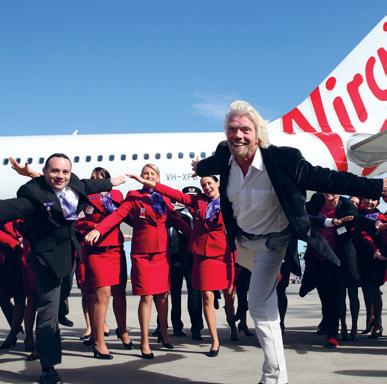
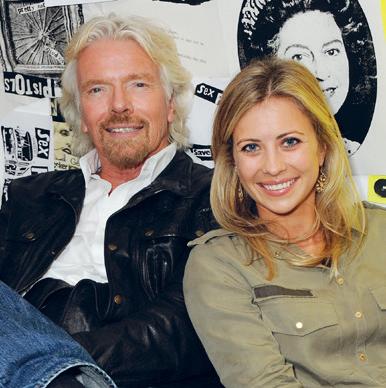
We think about the way that our brand can take responsibility in each of those four quadrants. We have a team of people who work in each of those areas to ensure that we’re continuing to develop and hold ourselves to account.
Why don’t you use the term ESG?
It’s become one of those shorthand phrases that
that the brand is something that’s going to be around forever. It’s been around for 50 years and so we think about it in terms of the next 50 years and how to make ourselves strong. I think one of the things that has kept us in good stead through the first 50 years is that focus on objectives that are outside purely investment returns or any of those narrow, maybe constricting measurements.
‘Look after your people so they will look after your customers and the shareholders will be looked after somewhere in the mix’
perhaps just skims over the surface of what really is important, certainly from our own point of view. We first identified the need and the desire to have a framework for thinking about what we call purpose back in the very early days of my tenure as chief executive, so around 2011 or 2012. But the truth is that the idea of serving communities and focusing on people goes all the way back to the very beginning of the student magazine, community service centres and Mates condoms – the things that Richard was spending his time focusing on back in the 1960s and early 1970s. If you run the rule over the history of the group, there’s always been that focus. ESG I think was a moment in time to describe a particular investment-led movement, but our thinking on the subject predates it.
Many businesses struggle to think both short and long-term. How do you manage it?
We’re very fortunate that because we are a privately-owned group we don’t have the obligation to meet quarterly earnings targets and sacrifice the long term for the short term, which a number of companies, unfortunately, have to do. We’re able to think about building things in the long term. If I think about our investment portfolio, our average hold period for Virgin-branded companies is something like 17 or 18 years. That’s very different to most investment businesses which recycle their capital in the private equity model, typically they would be targeting a three- to five-year turnover of capital. Because we don’t have that constraint it means that we can plan for the very long term. That’s consistent with the idea
Sir Richard and his family remain the sole shareholder. How do you manage that relationship?
Richard’s very interested in the business. As I said, we’re very fortunate to be a privatelyowned group of companies.
The Branson family are the 100 per cent shareholders of the group, which means that we have the opportunity to talk about the strategy of the business directly with our shareholders. That’s different to a public company, where you have unidentifiable shareholders on the register who may or may not give you any feedback on whether or not you’re doing a good job.
I have regular conversations with Richard and with the family about the business, the direction that we’re taking as a management team and the way that we’re running things for the long term. We ensure that it aligns with the values that underpin their view of the brand.
Richard spends much more of his time these days focused on non-business issues.
Philanthropy is a very big part of his time - he focuses on conservation and he focuses on social issues. He’s founded groups like the Elders, the B team and the Carbon War Room all through Virgin Unite [Virgin’s not-for-profit foundation]. He’s thinking about how to bring an end to the death penalty around the world and what global drugs policy should look like.
How much have you learnt from Richard?
When I became chief executive I thought it would be a terrific idea to have a really tightly defined strategy. I can recall discussing that with him. He thought it made a lot of sense, but
36 /// MAY/JUNE 2024
IMAGE CREDIT: Rory Lindsay
Bringing everyone on board matters:
Sir Richard Branson with Virgin Atlantic staff in Sydney
The Virgin founder with his daughter Holly, a member of the leadership team
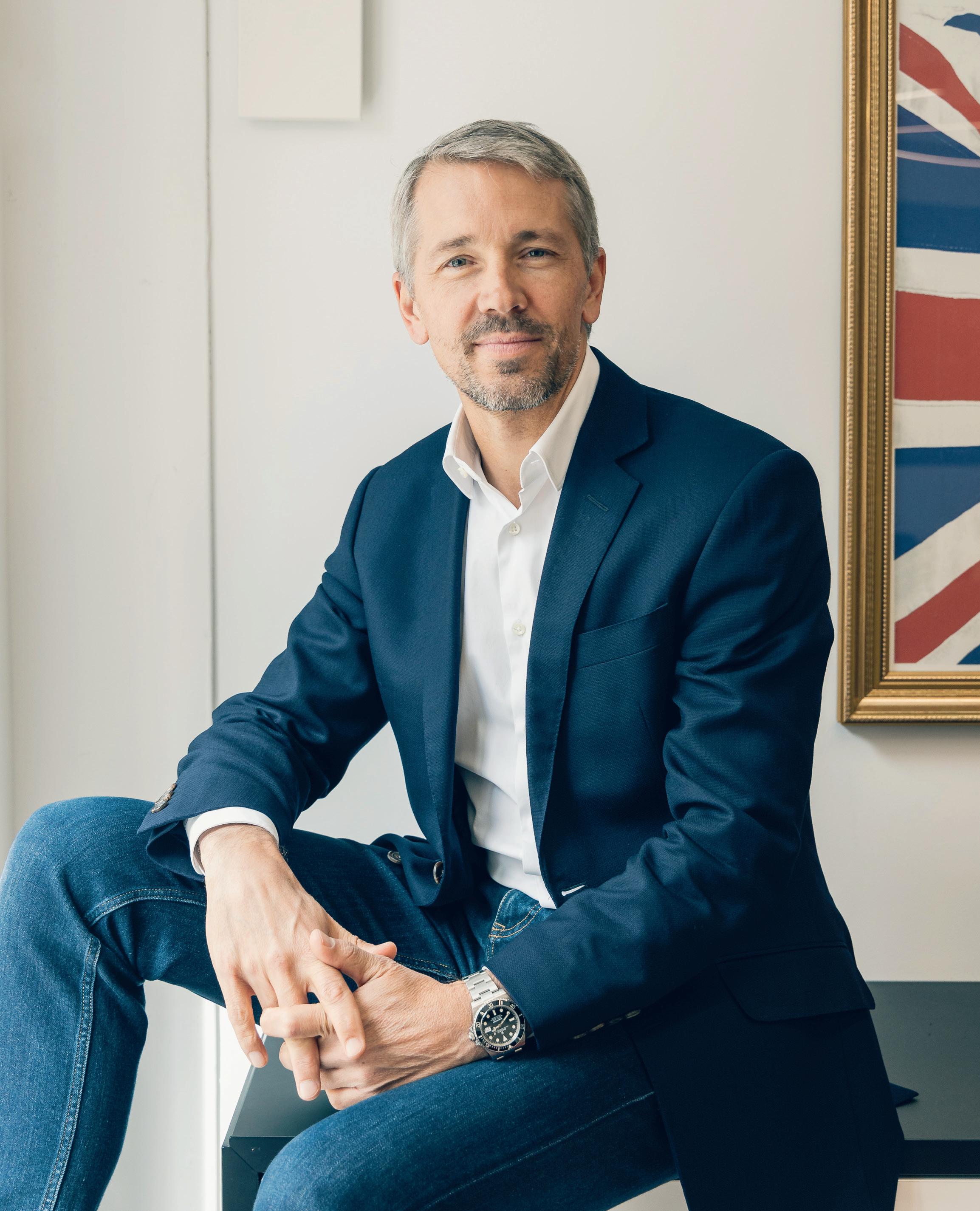
‘Time is often your friend. Letting things run rather than rushing to a solution is often the better way to play things’
said to me: “What you must always ensure that you do is keep your eyes open for opportunity as well. Don’t let the strategy distract you from that.” It’s been a really valuable lesson.
Can I ask about the first time you met?
I heard that when you turned up to your interview, Richard had double-booked and he was supposed to go to some TV awards so you ended up doing the interview in a car?
I think it was a music awards show. I was a little upset because at the time I was working in
the City and I travelled to Holland Park in west London for my interview with Richard. I lived in Holland Park so I thought this was terrific, I’d have the meeting with Richard then just pop home to my wife and newborn baby. And Richard said: “Not only have I double-booked, but the awards are at the Hackney Empire. You can come back tomorrow if you like or you can come with me in the car.”
Of course, I got in the car with him, which was terrific, because he probably had 20 minutes of questions for me but we were stuck in a traffic jam for about two hours. After he’d
run out of questions, I had a good opportunity to ask him some. Unfortunately, when I got dropped off in Hackney it was pouring with rain and I had to make it all the way back to Holland Park. But it was worth it.
How do you deal with setbacks? Because there have clearly been setbacks at times: the collapse of Virgin Orbit and losing the Virgin Trains contracts.
Well there’s no doubt that businesses see ups and downs. The average company lasts for 20 years and we’ve been around for more than 50. It is ensuring that you have that resilience and tenacity to bounce back from the setbacks, but always look forward to the next opportunity. No matter what you’re doing, if you’re going to take risks in business, you are going to occasionally see things not go your way. And we’ve certainly done that, consistent with that entrepreneurial drive. It’s about learning from those things and capitalising on those lessons and then going again. I wish that I’d known earlier in my career just how important it is to be prepared to fail and to take those risks, because I think that’s when you learn the most.
What have you been able to learn from failure?
I think you recognise that there’s a pattern to these things over time. One of those lessons is that time is often your friend and letting things run rather than rushing towards a solution is often the better way to play things. I think I’ve certainly learnt over the past 12 years that giving yourself as much space and breathing room as you can, rather than rushing at growth for growth’s sake, is sometimes a better way to go because maybe you’re ahead of the market. I happen to think Virgin Orbit is a remarkable success story. The team at Virgin Orbit achieved momentous milestones, incredible technological advances, and that technology we created will undoubtedly be beneficial for the future of the space industry. There will be others who will benefit and learn from the experience that Virgin Orbit had. Maybe we were just too soon.
This is an extract from Business Leader’s podcast interview with Josh Bayliss. To listen to the interview in full please visit www. businessleader.co.uk/podcast
MAY/JUNE 2024 /// 37
INTERVIEW
The spicy tale of supersizing Nando’s

How a small venture in the suburbs of Johannesburg grew into a global success story without compromising its original down-to-earth vision
BRUCE WHITFIELD
38 /// MAY/JUNE 2024

Every prime minister needs a Willie,” announced Margaret Thatcher, the first woman prime minister in 10 Downing Street. She was referring to Lord Whitelaw, her deputy and leader in the House of Lords, whose support early in her premiership was crucial to cementing her power base in government.
In the same vein, every founder needs a Dick. Bear with us while we explain.
Without the support and funding of insurance tycoon Dick Enthoven, Nando’s might never have expanded much beyond three takeaways in dodgier parts of Johannesburg, where it was founded during political upheaval in1987.
It started when best friends Fernando Duarte and Robbie Brozin happened upon what they described as “a grubby little takeaway” called Chickenland in the unremarkable 1890s mining-era suburb of Rosettenville. They forget who, but one of them said to the other: “Let’s take this chicken to the world.” It was to be the start of something big.
FEATURE MAY/JUNE 2024 /// 39
Neither had run a business, nor prepared a meal for anyone outside their immediate families. Nevertheless, they bought the store and its recipe for Portuguese-inspired, Mozambiquestyle spiced chicken and named it after Duarte’s infant son, Nando.
Brozin took on the role of chief executive, while Duarte oversaw operations. They expanded to three outlets and were running them on a of mix of piri-piri, adrenaline and youthful exuberance, when staff member Bruce McInroy, who worked at the group’s central kitchen where its sauces were made and chickens marinated, suggested to Brozin that he should meet his brothers’ boss Enthoven. The entrepreneur, who was in the early stages of building a multinational insurance business, was always on the lookout for a good investment opportunity, he said.
Enthoven, who died in 2022, was notoriously media-shy but always remembered that first meeting. “We met at a Nando’s and it was the best chicken I had ever tasted. I was gnawing it off the bone. You could see these guys had worked it all out and knew where they wanted to go.”
It was at that meeting, without a contract, with no corporate advisers in sight and based only on a handshake, that Enthoven wrote the first of what became several cheques as they agreed on a 70/30 equity split between the founders and the operators. It was Enthoven who insisted the founders retain a majority stake. “He didn’t want us to become nochschleppers,” says Brozin. Nochschlepper in this context is Yiddish for someone who simply goes along for the ride, without purpose or ambition.
Enthoven didn’t ask for complex ownership structures or earn-out clauses because he wanted to ensure that the founders would remain engaged in every aspect of the business. He would counsel against their taking capital from investors whose money would dilute their holdings to a point where they would lose their motivation to keep building.
Even as Nando’s grew, Enthoven, Brozin and Duarte never signed a contract. They had the necessary
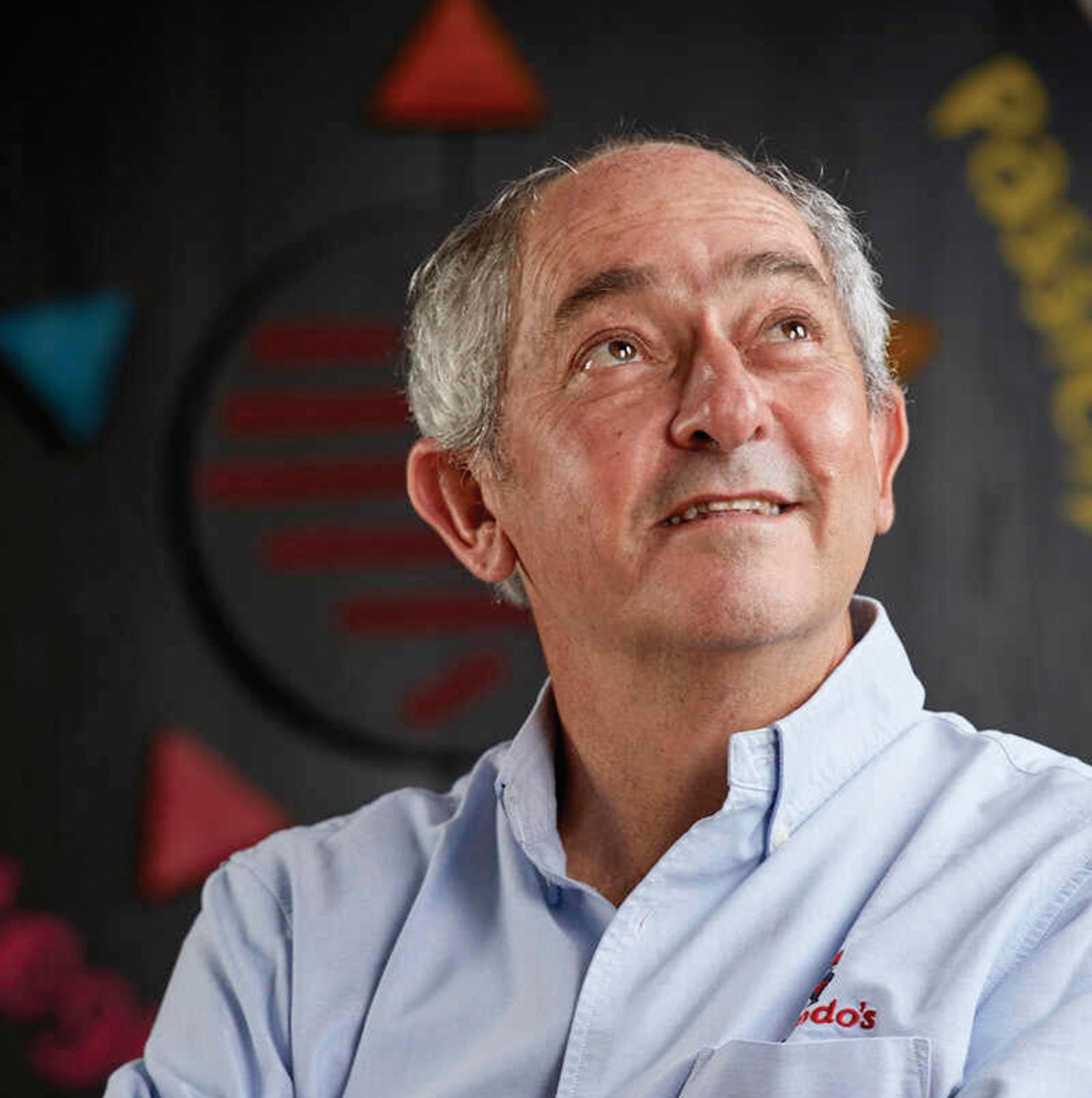
Five key lessons from Nando’s
1. Investors need to keep founders interested and engaged.
2. Investors and founders need to ensure their core values are aligned and that there is deep trust between the parties.
3. Chief executives need to pay attention to input from the shop floor. It can be invaluable.
4. Have fun. “Restaurants are retail. But while retail is brutal, restaurants are even more so. Yet customers want to see shiny eyes and
Robbie Brozin, above, says Nando’s restaurants have to be fun to succeed

governance requirements at corporate level, but after swapping their lawyers’ numbers when they first met, it turned out they were the same person who vouched for their integrity to the other.
It is this agreement that underpinned the creation of a business that now spans some 30 countries. The firm has more than 1,200 outlets across the UK and Ireland, North America and Canada,
smiling faces. It has to be fun,” says Brozin. 5. If someone wants to buy your business, interrogate your reasons for seling it. Shortly after entering the UK, the founders considered exiting and went to see a potential buyer. “We came out of that meeting and Dick said to me that if this guy, who was a real operator, was interested in buying the business, then there must be potential and we should not be selling,” says Brozin.
the Middle East, South East Asia and Australia and New Zealand.
“Dick understood that money was a commodity that would be easier to come by as we became more successful, and he did not ever want us as founders to believe that we had been screwed over. He understood that if the operators made money, so too would the investors,” says Brozin.What makes this story
40 /// MAY/JUNE 2024
remarkable is that it is atypical. Enthoven understood that if Duarte and Brozin flourished, so would he. He knew that if they remained the primary owners they would put in the work and hours to succeed Nevertheless, success in the UK was never guaranteed and there was a point where they considered exiting and went to see a potential buyer. “We came out of that
1987
Two friends meet for lunch in a “grubby
NANDO’S TIMELINE
1990
Nando’s is operating three outlets in
1992
Nando’s expands to the UK, opening

1993 Robby Enthoven takes over as managing director at a time when the takeaway concept is not working. The founders and Dick Enthoven consider selling but instead Robby pioneers counter orders
1995
Nando’s has 45 restaurants in South Africa, four in the UK and others in Canada, Israel and Australia
2019
Global group revenues pass £1bn for the first time
2021
The Covid-19 pandemic causes revenues to fall to £665m
MAY/JUNE 2024 /// 41
FEATURE
How do you solve a problem like scale-up lending?
Digital bank OakNorth is in the vanguard of new banks backing fast-growing businesses. Its chief executive Rishi Khosla spoke to Andrew Lynch
Rishi Khosla saw a problem and wanted to fix it. The fintech entrepreneur and his business partner Joel Perlman had already built one business from nothing to 3,000 staff before they exited. Then they turned their attention to the difficulties scale-ups face borrowing from banks and founded OakNorth, a digitally focused lender to fast-growing businesses, in 2015. They knew how hard it was to get a loan.
“We’d experienced the problem and said: we can build something to address this and help other entrepreneurs and scaling businesses”, says Khosla, whose first venture with Perlman, the financial data provider Copal Partners, was sold to ratings agency Moody’s in 2011.
Banks service big companies well enough – with fees to match. Equally, they can service micro-businesses; although the entrepreneur loses their home if it doesn’t work out. But when it comes to businesses with earnings of between £1m and £100m, there is the problem, Khosla, pictured above, says.
Banks use ratios to determine whether they will lend. “Those work when you’ve got a straightline business that isn’t growing or acquiring,” explains Khosla. “But if a business is growing by 20 per cent a year, the difference between the last 12 months and the next
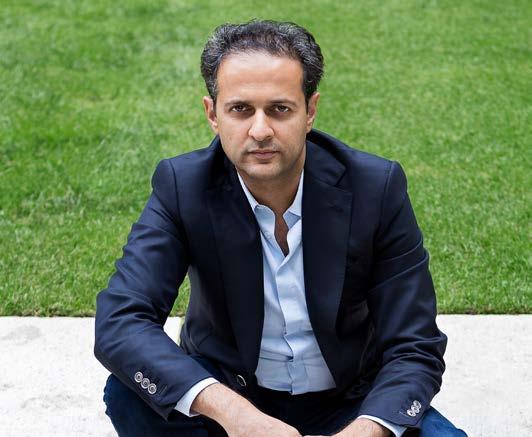
can be 40 per cent.” A traditional bank would look backwards, not forwards, he says, considering not where the business is going but where it has been. “That’s pretty unsatisfying if you’re an entrepreneur trying to grow your business,” Khosla says.
OakNorth’s response has come in two forms. The first is machine learning. “Our technology focuses on getting that forward-looking view in a way that is efficient and gives an experience much closer to that of investment banking.”
Alongside that is a very traditional approach: meeting the customers. It’s up to a credit committee rather than just the computer saying no.
These methods seem to be paying off. Without heavy marketing,
OakNorth has attracted clients such as plant-based snacks firm Deliciously Ella, property group Arora and Z Hotels. And in late March, the bank reported pre-tax profits for 2023 at £187m, up 23 per cent, and gross new lending facilities of £1.7bn, part of £10bn lent since it launched.
The big five banks have traditionally dominated lending to small and medium-sized enterprises. But for the second year, challenger and specialist banks accounted for a higher share of total gross lending, at 55%. That is the highest proportion on record, according to a British Business Bank survey of small business finance markets for 2022/23.
Furthermore, the report notes, gross lending by those challenger
and specialist banks in 2022 was £35.5bn, the highest since the Bank of England started collecting records in 2012.
It’s a staggering change to the lending landscape. But Khosla, who says the OakNorth business model sets it apart from the challengers, still sees the big banks as significant players. “Do I think that they are losing segments? Of course,” he says. Khosla is bullish about OakNorth’s progress. “Our mission is incredible: to help entrepreneurs scale their businesses. We’ve helped create nearly 40,000 new jobs in the UK and something like 29,000 affordable homes. We feel like that speaks volumes for the impact we’re having.”
He and Perlman hold the biggest individual stakes in OakNorth, although the exact size hasn’t been disclosed. The last funding round, led by SoftBank’s Vision Fund, saw a $2.8bn valuation, but that was in February 2019. If OakNorth expands at pace in the US, it could need more cash.
OakNorth’s headquarters are in Soho, central London, rather than the Square Mile where banks are usually based. For another sign of difference, go to the bank’s annual report where all the directors wear OakNorth T-shirts. Natural enough for Gousto founder Timo Boldt, who sits on the board. A little more surprising for former financial regulator and new chairman Adair Turner.
42 /// MAY/JUNE 2024 FUNDING
DEEP DIVES
/// The debates and trends that matter ///
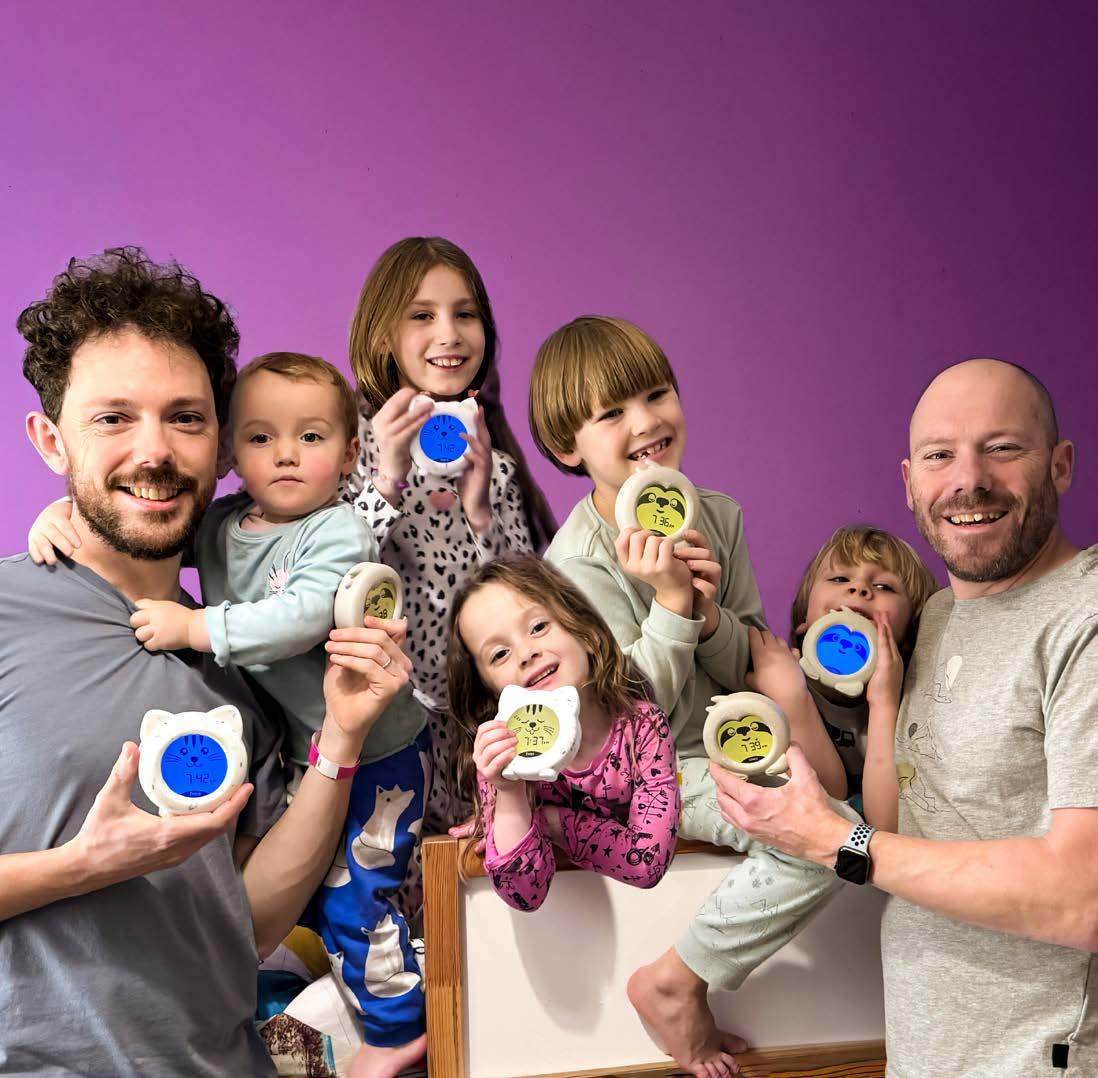
MAY/JUNE 2024 /// 43 IMAGE CREDIT:K i Price
BUSINESS LEADER ///
44
Venture capital Could the industry be doing more to boost the UK economy?
50 The pitch from hell… What happened and tips on how you can avoid the same
50
54 View from the North How Manchester became a thriving hub for gaming
The Business Leader podcast Take a second look at big business stories

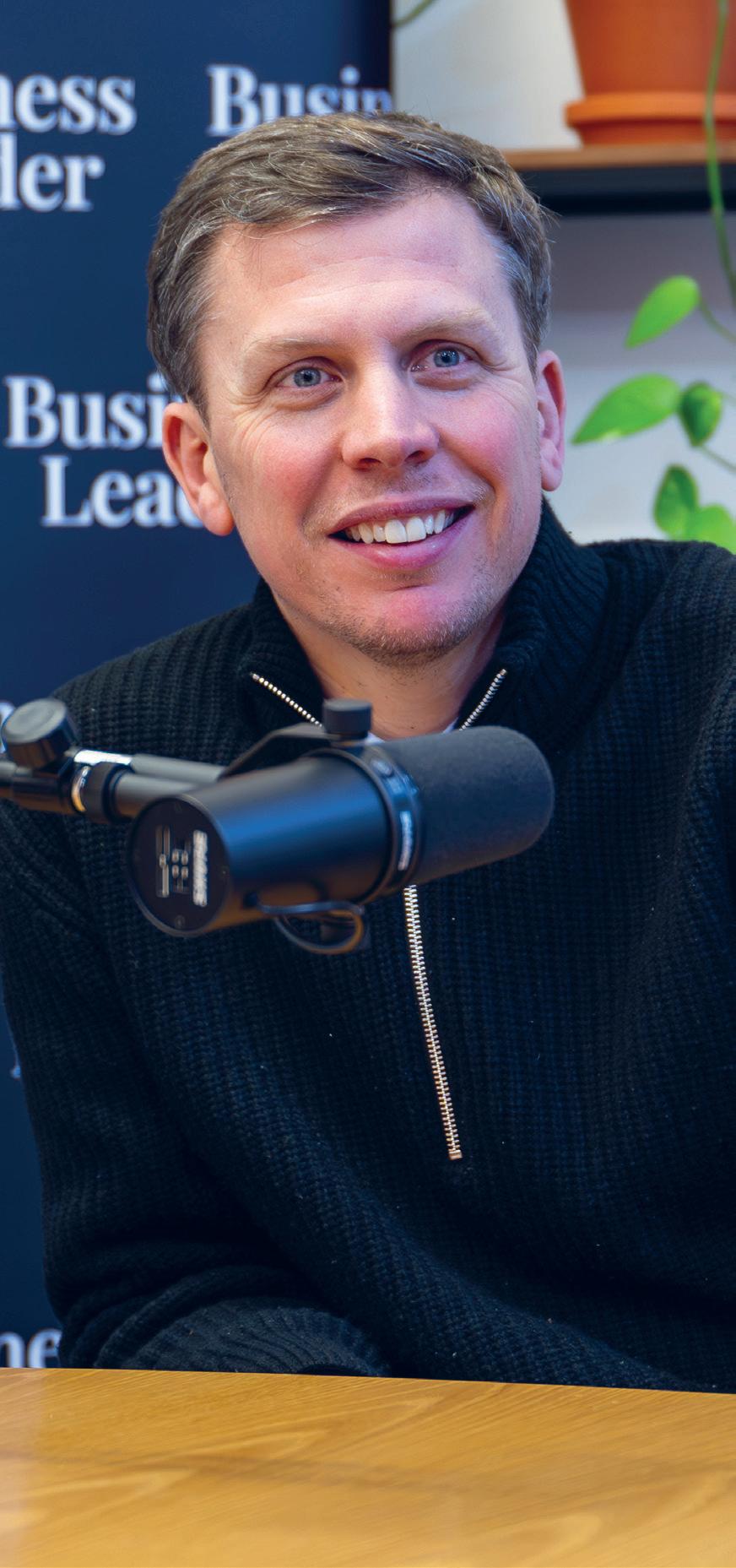

Uncover the real story
Access insider perspectives
Gain practical insights
New episode weekly
Listen wherever you get your podcasts.

Is venture capital working?
Amid economic turmoil, the role of venture capital funds in the UK and whether they work as well as in the US is under scrutiny
ANDREW LYNCH
Michael Moore sounds like a politician as he lists the travails that have made the past few years the worst of times for VCs. The pandemic, the invasion of Ukraine and the energy crisis that came with it, and the windswept economic landscape – all to blame.
That’s not surprising since the head of the trade body for venture capital (and private equity) is a former Liberal Democrat MP – and Scottish Secretary – in the coalition government. And he has a point.
“It changed the reality on the ground for everybody – whether they were fundraising, building businesses or looking to exit,” says Moore, chief executive of the British Private Equity and Venture Capital Association.
“It’s been tougher to raise funds, no one is kidding themselves on that. But the industry sits on record amounts of, in our lovely jargon, dry powder – capital commitments that are available to deploy.
“I’m very positive about the industry because I think it has grown out of all recognition in the past decade.”
Yet while Moore sees progress on spinouts, regional investment and the possibility of pension cash going into fast-growing companies, there remain questions. These include concerns around how much of the investing pie is shared outside London and whether the UK can ever match the scalability, patient capital or skills of the US, as well as how much is invested in businesses led by women and ethnic minorities. The House of Commons Treasury select committee has accused the industry of an “unacceptable failure” on the first and third points.
And then there’s the economy. Steven Dunne, senior partner at Frog Capital, doesn’t sugar-coat VCs’ predicament. There has been a shakeout, he says. “There were a lot of deals done and a lot of firms apparently doing very well in a rising market, which came to an end at the end of 2021. Since then, we’ve seen a lot of retrenching and people disappearing from the new deals market because they’ve got so many issues in their own portfolio.
“Now, we’re seeing the issues with a lot of VCs behind the curve in terms of exits because they haven’t got things they can exit at good values – and don’t want to exit at poor values.”
Frog backs software firms providing consumer, financial and businesses services, and its operating partners are often to be found
working within its investments. According to Dunne, it has avoided having to provide emergency funding for its businesses. “We’ve always invested around fundamentals,” he says.
There are also concerns around the political landscape, given this is an election year and that drives uncertainty. Tim Mills, managing partner at the Angel CoFund, holds a portfolio of almost 120 companies across the UK, of which Gousto, the meal kit supplier, is perhaps best known. “The story of consistency and support is a positive one,” says Mills. “But it’s always concerning going into an election year that there’s no guarantee that the story is going to continue.”
He explains: “We’re in the game of making investments that might take seven to 12 years to reach maturity and exit. Any kind of change within that period can fundamentally change the dynamic of those investments, which isn’t something that all politicians really appreciate.”
Ken Cooper is a VC’s fairy godmother. As managing director of venture capital solutions at the British Business Bank he oversees the Enterprise Capital Funds programme. It invests up to 60 per cent of a fund, making it a “very attractive programme for first-time fund managers”, Cooper explains.
He adds: “We also won’t take 60 per cent of the profit, so that makes it easier for those managers to attract other investors who will then get a share of the profit that would otherwise be ours.”
In March, the British Business Bank launched a second Northern Powerhouse investment fund, providing £660m to cover the north of England that will be managed by nine fund managers and offer loans and equity deals.
Another investor making waves in the north of England is Northern Gritstone, which focuses on spinouts from the universities of Manchester, Leeds and Sheffield, particularly in life sciences. Duncan Johnson, chief executive, likens his company to an investment trust.
“We have a very different funding breakdown, some 70 per cent of our money comes from pension funds,” he says. These include L&G, M&G, Phoenix and Lansdowne Partners, as well as local authority funds.
“It gives us that ability to keep following our money rather than having a typical structure where you’ve got five years to invest, five years to get it back and you might get two one-year extensions,” he adds.
44 /// MAY/JUNE 2024

APPLIANCE OF SCIENCE
Harry Destecroix, Science Creates Ventures
Harry Destecroix hopes success will breed success. His first, in 2018 at the age of 31, was to sell his Bristol University spinout Ziylo, which found a way to measure glucose in the blood leading to better monitoring of diabetes, to the Danish pharmaceutical giant, Novo Nordisk, in a deal that may eventually be worth up to $800m.
Now with Science Creates, which includes an incubator, a charity and a venture fund, Destecroix is giving back. “We’re trying to build the VC firm that we wish we had as technical founders,” he explains.
“When I was a start-up founder, most of the VCs I met were neither founders nor technical,” he adds. “We’re not just operators, we’re founders. And we’re not just founders, we’re exited founders. We’re part mad scientist, part mad economist, and we’ve got results to show that equation works.”
Science Creates Ventures has already closed one fund at $20m and is seeking $100m for its second fund this year.
FEATURE
With changes in the sector, is venture capital now fit for purpose? “No,” says Johnson. “But that does not mean it can’t be.”
He adds: “If you say fit for purpose equals what it looks like in Boston around [the innovation district] Kendall Square or the [San Francisco] Bay Area, we are on a journey to get there. The clever people in this space will go and look at those markets and say: which bits can I bring back that mean it doesn’t take us 30 years to get there, only 10?”
Johnson attributes this to “the American pioneering spirit: failure is seen as success because you’ve learnt something and you’re going be better at what you do because you did fail. In the UK I still don’t think we’re anywhere close to having that attitude. You fail – you fail.”
Veteran investor Luke Johnson, who works at Risk Capital Partners, agrees: “Look at the successes like Amazon or Tesla. America has the world’s biggest capital markets, so they can fund the billions of losses which Amazon suffered over 10 or more years before they broke into profit. They have patient capital and liquidity that we will never get close to.”
Cooper would also prefer a bolder attitude towards investing. “The US just has a scale that the UK doesn’t,” he says. “We’re never going to replicate that, but we can replicate the way
‘In the UK I don’t think we are anywhere close to that American pioneering spirit’
investments are made – the entrepreneurial nature, risk-taking.”
One newer player, Science Creates Ventures (see profile), is emulating the American model of exited founders turning to investment. Alex Davies, chief executive of Wealth Club, a platform for investing in fast-growing private companies, says: “When you see something like Science Creates, it’s encouraging because they have a specialism and it’s all they do.”
As a founder and a former Goldman Sachs banker, Thang Vo-Ta has seen venture capital from both sides of the fence. He is chief executive of femtech start-up Calla Lily Clinical Care. “The Americans are more likely to rely on the outliers, the unicorns that will lift the fund. In the UK, they look more at overall spread and expect the return to be shared out.”
Thang also sees a philosophical difference in approaches. “You’re looking for such a large multiple return that it has to be a movement that you’re investing in. Something ahead of its time or dramatically different. British VC firms are more thematic and want to see a bit more evidence at the risk of being a bit slower and later to the game.”
Maybe the UK can’t emulate the scale of US venture capital, but there is much to learn about taking more risks – and that includes where and who funds invest in.
Finally, there’s no sign that the charge that VCs don’t support women founders or those from ethnic minorities enough is likely to be dropped soon. The Treasury committee report cited the British Business Bank as saying that “for every £1 of equity investment in the UK in 2021, all-female founder teams received 2p”. No wonder Giovanna Forte, chief executive of Forte Medical, which is crowdfunding to provide reliable urine specimen collection, has little time for VCs.
“They claim they’re going to support femaleled businesses, femtech and health tech. Then they won’t even dignify your application with a reply. Or they say that they’re taking a risk. Well, we’ve already taken a risk. We’ve put our necks on the line to grow businesses from nothing,” she says.
46 /// MAY/JUNE 2024
$bn 2013 2014 2015 2016 2017 2018 2019 2020 2021 2022 2023 40 35 30 25 20 15 10 5 The value of venture-capital financing in the UK, 2013-2023 Source: Pitchbook

THE HARD ROAD TO FUNDING
Priya Oberoi, Goddess Gaia Ventures
Priya Oberoi was up for partnership at a magic circle law firm when she was diagnosed with cancer. “The experience of not having enough support, not knowing where to go, dealing with the fallout emotionally, financially and practically has lived with me,” she says.
On top of that, she was having IVF, suffers from an autoimmune disease and got cancer a second time. “This made me look at women’s health when women’s health wasn’t a thing,” she says.
She became an angel investor and, when the pandemic struck, scaled up her involvement. She is now seeking to raise the first fund for her Goddess Gaia Ventures, which focuses on women’s health. “It’s about giving women the same outcomes that men might have and doing better in providing outcomes across the trajectory of women’s health care,” says Oberoi.
She saw a gap her London-based fund could fill. “There’s a lot of funding at seed,” she explains. “But the problem is that between seed and series A for healthcare is about three years. And you’ve got clinical trials during that time, you’ve got regulatory pathways, you’ve got to build a sales funnel. There’s not a lot of people who invest in that space.”
Oberoi also realises that for the fund to succeed it must invest in companies that are scalable in the US. She has already picked the first 10 to invest in.
It will be a hard slog. “It’s quite normal to spend two to four years to raise the first fund,” she says. “The point is, how do your partners live during that time?”
She quotes Nvidia boss Jensen Huang about success coming from suffering and resilience. “If ever there was suffering and resilience, it’s now,” she says.
BIOTECH AFTER THE STORM
Sunil Shah, o2h Ventures
Sunil Shah, chief executive of o2h Ventures, a Cambridge VC that invests in biotech therapeutics, has witnessed a dramatic turn in the market over the past few years. “Post-Covid was like the heyday, with new funds being raised left, right and centre,” he says. “People understood the value of science and were very willing to put a percentage into therapeutics.”
But in the past 18 months it’s been extremely tough, he says, despite a few bright spots. “I’m 50, I’ve been through a couple of downturns and run businesses through that,” Shah says.
“You know that you’re going to get through to the other end. I feel that end has happened and we are very much on the other side.”
He cites an uplift in biotech shares on the Nasdaq along with an increase in the number of IPOs on the American exchange. And the improving macro-economic environment with lower interest rates on the horizon and inflation under control will help.
Closer to home, Shah points to o2h’s contract research organisation (CRO), which provides services from the UK and India to biotech and pharma companies, as a key indicator. “I always say CROs feel it first when there’s a downturn,” he says. “People are slightly loosening the taps. I feel we’re right at the beginning of a really stellar year for biotech.”
More than half the 30 companies o2h has invested in are linked to or based in Cambridge, where the company also runs an incubator. As well as Cambridge, there are investments in spinouts from Dundee, Sussex and Nottingham universities, with one from Leeds on the cards.
The next blockbuster drug may be just around the corner.
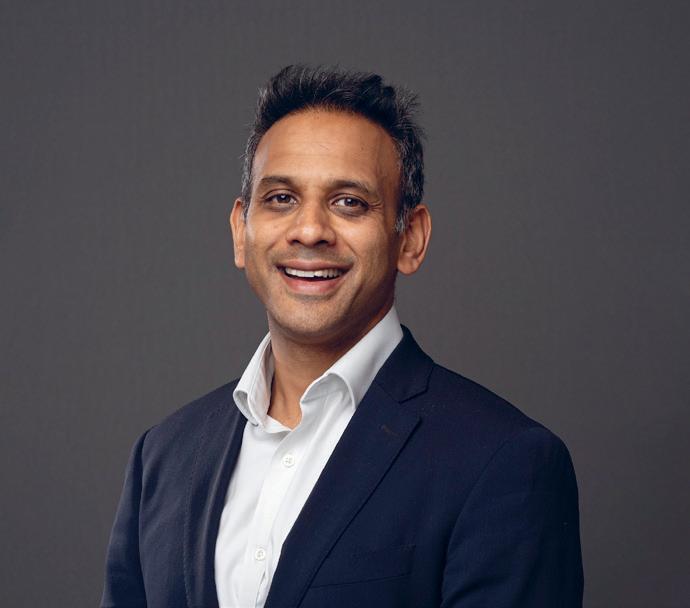
MAY/JUNE 2024 /// 47 FEATURE BUSINESS LEADER ///


Are you the UK’s top tech innovator? KPMG. Make The Difference. Liz Zijing Li COO, Co-founder and Inventor, Mimicrete Tech Innovator in the UK –East of England Regional Heat Winner 2023 © 2024 KPMG LLP, a UK limited liability partnership and a member firm of the KPMG global organisation of independent member firms affiliated with KPMG International Limited, a private English company limited by guarantee. All rights reserved. CRT154221A
The from (and how to avoid it)

If you have ever worried about your ability to win over investors, Rob Law’s story is one of turning disaster into triumph. Overleaf, entrepreneur Alex Depledge offers her tips for a top presentation
ANDREW LYNCH
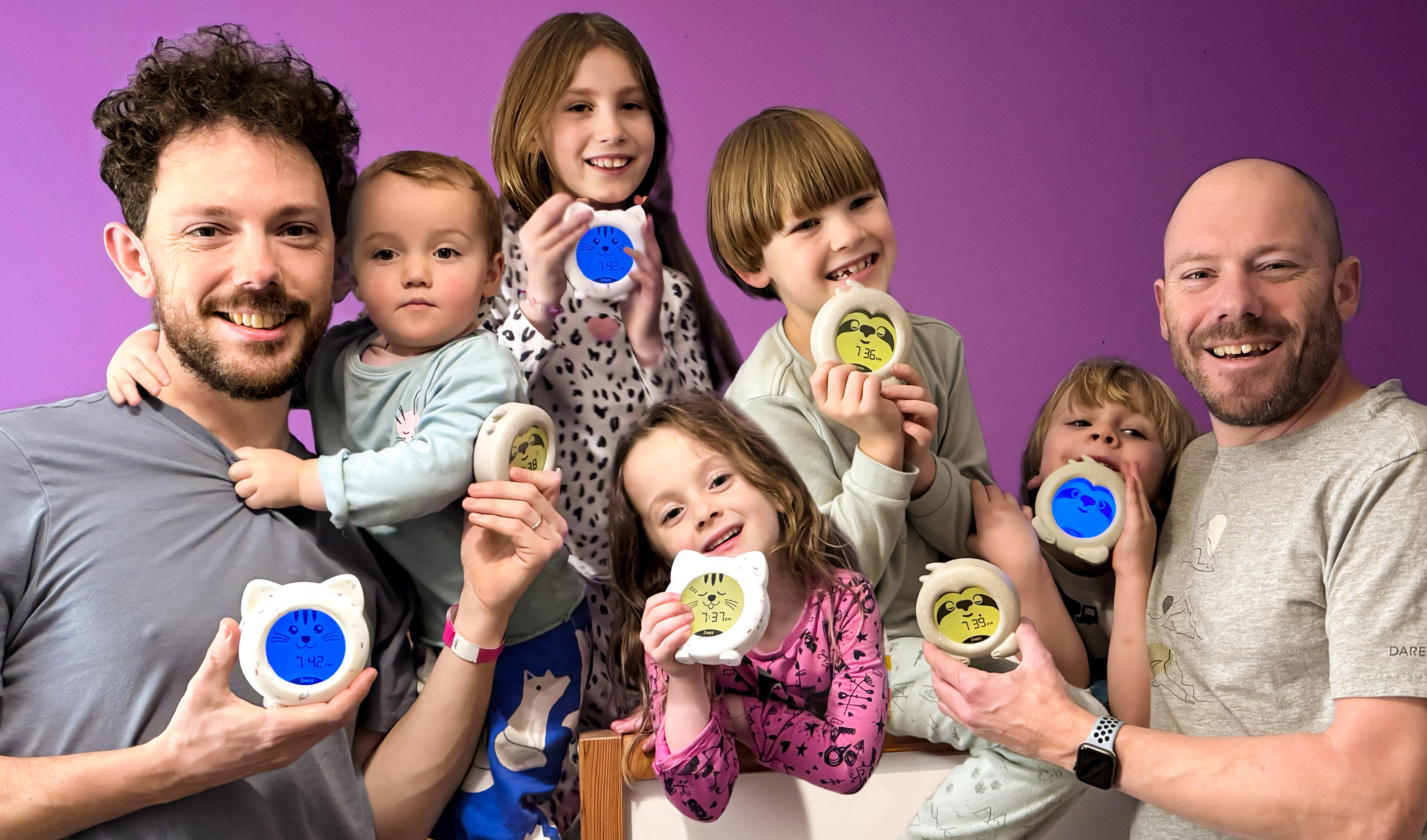
There had never been a pitch like it. An entrepreneur and his product were tested to destruction by potential investors in front of millions of television viewers.
It should have been the last rites for Rob Law’s entrepreneurial dream.
Instead, it put his brand of children’s luggage, Trunki, on the map.
In 2006 Law appeared on Dragons’ Den in an effort to secure £100,000 for 10 per cent of the business. The designer, who had overcome cystic fibrosis, had already sold 20,000 units of the ride-on suitcase he had designed in his second year at university.
At first the Dragons warmed to Law and his “cute product”, as Deborah Meaden called it. “The pitch had gone pretty much perfectly and I had towed a fully-grown adult around the studio on a Trunki, proving it was strong enough to do that,” recalls Law.
But not strong enough for another Dragon Theo Paphitis, who was tugging hard at the strap. “It was the hardest I’d ever seen anyone tug at the strap,” Law wrote in his memoir, 65 Roses and a
Trunki. “He wore his constipation face as he pulled harder. Why was he pulling so hard?”
Eventually, the inevitable occurred and the strap snapped. And the Dragons rounded on Law. “You shouldn’t have come here with problems without identifying them or sorting them out first,” Paphitis exploded. “It drives me mad that we actually waste our time with these things.”
But what had seemed like the pitch from helhaa silver lining. “In hindsight, it couldn’t have worked out any better,” says Law. “It got everyone shouting at the telly. Trunki went from an unknown brand to being talked about at coffee machines and water fountains around the country the following day.”
That actually helped the company grow and in 2013 BGF invested in the business. Law eventually sold to ecommerce brand Heroes Technology in February last year, reportedly for more than £12m. And the Dragons even made up with Law, who now runs a marketing agency, Aphelion, with his brother helping brands sell on Amazon. He has also started Zeepy, aimed at getting toddlers and young children to sleep
better. Now 46, Law is sanguine about the Dragons’ Den experience, offering consolation to anyone who has seen a pitch fail. “It had been a journey of manufacturers who didn’t get it, retailers who didn’t get it and investors who didn’t get it, but my target market got it, even my mum got it. So often the people with their hands on some purse strings are not really the people who are ever going to get it.”
Law has some advice on pitching: “You’ve got to come across as passionate about your product, otherwise people will see through you. In this world of slick decks and presentations, showing humility and vulnerability helps to win people over. I found through the whole Dragons’ Den thing that people really rallied behind me because I was the underdog.” Nevertheless, he admits he found pitching nerve-wracking. “I started public speaking and trying to put myself through the mill, to be able to talk confidently in front of larger audiences. You may resist wanting to do these things, but you’ve got to see it as a weakness and face into it because pitching is so crucial. Not just to business, but pretty much everything.”
MAY/JUNE 2024 /// 51 HOW TO PITCH
Rob Law, right, with his brother Dave and their children Whin, Ida, Figgy, Rafe and Kip, promoting their new venture, Zeepy
Working with ambitious entrepreneurs across the UK and Ireland
bgf.co.uk
Growth capital for scaleup businesses
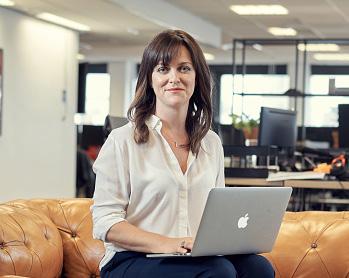
My top tips for pitching
By Alex Depledge
Alex Depledge:
‘Describe your business in one sentence.’
Don’t put more than 10 slides in your pitch deck.
Warning: I’m very direct. Why waste words and time? If you can’t fathom or follow the below (in your own words and style) then you shouldn’t be an entrepreneur. If you don’t like criticism and can’t grow a thick skin, then you shouldn’t be an entrepreneur. If you want to get rich quickly, don’t be an entrepreneur. Team
Who are you? What makes you special?
Early supporters of your company will back you based on your team as that’s the only tangible thing you have.
Product
Right. Stop. I have said this until I am blue in the face: you do not need to write a line of code to test a business model. Pretty much every business other than hard tech can be manually engineered. Describe what you’ve done to test the business. Describe how it’s
going to evolve, become tech, what the product lines are and so on. Or you could f*** it and do a Jules Coleman: buy a book and teach yourself to code.
Traction (including assumptions proven)
How many users do you have? Do you have any revenue? What KPI drives your business? What KPI will you succeed or fail on and how are you tracking now? You don’t need revenue, but you better know what the most important metric for your business is and have tested it.
Market size
How big is the market? How big can it be? Some people talk about total addressable market and what percentage of that you think you can achieve.
Route to market
How are you going to acquire users? What channels have you tested and what’s shown promise?
Competitive landscape
Who else is doing what you do? There is always someone! Even if they’re oldfashioned. It’s not about who looks like you, but who’s serving your users now?
Barriers to entry
What hurdles will you need to overcome? Could be competition, regulation, high upfront R&D.
Bottom-up, assumption led forecast
What does the next 12 months of business look like, knowing what you know from your early traction, user behaviour, revenue, etc? Ultimately, how will you make money? What’s your business model?
Acquirer landscape
The who and why. Personally, I’ve never been sure on this one. It’s a chicken and egg situation. All you need to do is show that you’ve given it some thought.
Funding and allocation
Do me a favour. Consider all of the above (that means get something more than an idea) before you think about funding. It’s not a goal in and of itself. Not all businesses lend themselves to institutional funding. Some can and should be self-financed. But if you insist on seeking funding you should know how much you need to make the business profitable and how you’re going to spend it.
An appendix can be added if necessary It should include clear milestones, a technical roadmap, and a clean and recent sales pipeline.
These questions are intended to prompt you to think deeply about each bullet — not to answer all questions. I typically never put more than one diagram, one graph or one number on a slide. And lastly, it amazes me how many times I ask the question “describe your business in one single sentence” and people just can’t. Pathetically, dismally, they fail. They think more is better and if they drone on for long enough, they’ll convince you. Wrong. Less is more. The simplest ideas are often the best. Distil your idea down to a sentence.
Alex Depledge is the founder and chief executive of Resi. These tips were initially published in her blog in 2015
MAY/JUNE 2024 /// 53 IMAGE CREDIT: Ki Price/Getty Images
HOW TO PITCH
/// VIEW FROM THE NORTH ///
How off
gaming is taking
CHRIS MAGUIRE
Manchester is known for its music scene and football teams, but two childhood friends are leading the way in making Manchester a hotspot for the gaming industry
54 /// MAY/JUNE 2024

FEATURE MAY/JUNE 2024 /// 55

There is a plaque on Manchester’s Midland Hotel to commemorate the first meeting in 1904 of Charles Rolls and Henry Royce, the start of a partnership that led to the creation of the renowned Rolls-Royce.
Years from now the little village of Wrightington, near Wigan, might have a similar plaque to celebrate the first meeting of 10-yearold Alex Rigby and eight-year-old Paul Gouge.
It was the beginning of a 40-year union that has resulted in some of the world’s biggest mobile games, including the Bafta-winning Golf Clash, and created in Playdemic a tech unicorn – a private start-up valued at $1bn-plus.
Fast forward to 2024 and Rigby and Gouge, now 50 and 47 respectively, have decided to go again with the launch of their fourth business –ForthStar. The studio doesn’t expect to release its first game until 2025 but has secured $10m from venture fund Griffin Gaming Partners.
The lifelong friends won’t be rushed and say that only the games that survive their own “conveyor belt of doom” test will be released.
“Our ideas are on this conveyor belt moving towards this rock crusher and unless they’re good enough they’re going to get crushed and we’ll work on the next one,” explains Rigby.
At our meeting in ForthStar’s offices in Altrincham, near Manchester, it’s obvious that Rigby and Gouge are unbelievably close. Recalling their first meeting, Gouge says: “We had just moved into the road in Wrightington and Alex’s mum knocked on our door and invited us for dinner.” The boys discovered a shared interest in football and computer games.
“One of the reasons the North has a strong gaming industry is because we have horrible winters,” explains Rigby. “It’s soggy, dark and you can’t really do much. Video gaming was something we became really good at because we couldn’t go out in the long dark winters.”
As children, the pair vowed to go into business after the success of one of their early money-making schemes to produce interactive prospectuses on CD-ROM for local colleges.
They launched their first mobile games studio in 1999 with BattleMail, which attracted 1 million users in under a year before being sold to (M)Forma.
“We were trying to come up with an idea for a game that would allow us to be distributed virally and played via email,” says Gouge. “People looked down their noses at what we were doing. It had virality built into the core of it. It was mass market by nature. It was free-to-
play. Now it’s become the business model for the biggest games out there.”
Their next business was Manchester-based Rockpool Games, which was sold to Eidos Interactive in 2007 for $15m.
In 2010 the pair launched their third studio and future unicorn, Playdemic, which hit the jackpot with the launch of Golf Clash
The studio started developing the prototype for Golf Clash in 2015 but it didn’t go live until 17 January, 2017. The date is significant: by then, they had already sold Playdemic for an undisclosed sum to industry giant Warner Bros.
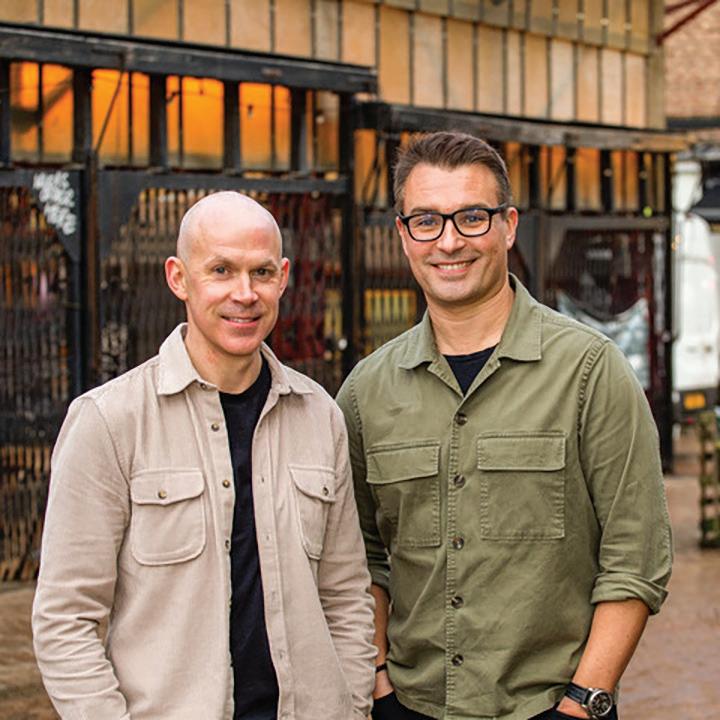
56 /// MAY/JUNE 2024
A Rolls-Royce at the Science and Industry Museum in Manchester celebrates the meeting of Rolls and Royce at The
Partnership: Alex Rigby and Paul Gouge Midland Hotel
“Part of the journey of Playdemic was from a Facebook games company to a mobile games company,” explains Gouge. “We were really focused on trying to make a free-to-play mobile hit. At the time there was a lot of talk that it was a bit late to do that. The big hits like Candy Crush and the Clash of Clans, which were making more than $1bn revenue a year, had already happened.
“There was a sense that the market had already matured and the winners had already been declared. One of the reasons Golf Clash was a success was we identified a particular audience we felt was under-served.”
To date, Playdemic has been downloaded more than 150 million times, generated more than $1.2bn in revenue and hundreds of millions of dollars in profit. They sold to Warner Bros because it seemed like “the right home” for it.
“We were at this point with Playdemic when we had produced hit games like Village Life and Gourmet Ranch and were making good profits but we didn’t feel like we were growing and evolving like we wanted to.
“We started to get approaches from companies wanting to buy us and started to think that was the right home for a company like Playdemic. Maybe we did need the muscle and capital of a much bigger player behind us. Those thoughts were fundamentally wrong.
“Hindsight is a wonderful thing and the one thing we couldn’t have predicted was quite how
NORTHERN LIGHTS
successful Golf Clash was going to become,” he says.
“We’ve got a very good relationship with Warner Bros, they also recognised the incredible value in Playdemic and Golf Clash and ensured that we materially shared in the upside even beyond terms of our sale.”
In 2021 Electronic Arts (EA) acquired Playdemic for $1.4bn.
Rigby and Gouge are as affable a pair as it’s possible to meet – but just don’t compare them to one-hit-wonder Chesney Hawkes.
“Was Golf Clash your equivalent of Chesney Hawkes’ The One and Only?” I ask tongue-in-cheek, referencing the 1990s hit song “Please never call us the Chesney Hawkes of gaming,” jokes Gouge.
most expensive buyout of a UK-only developer, but began plotting their return a year later.
“We secretly knew we’d be going again,” says Gouge. “Because of our relationship we spoke pretty much every day. Relatively quickly we realised that the one thing we love to do is build our own games companies.”
Rigby says: “Achieving unicorn status is an exciting thing to do. It’s not just about money. It’s about the journey. When you have a product played by millions of people around the world who are loving it, it’s a cool place to be.”
The pair launched ForthStar in 2024. “We wrote down all the things we’ve done well in building these companies or the mistakes that we’ve made and effectively created a manifesto of how we make a new company,” said Rigby.
‘Achieving unicorn status is not just about the money’
Gouge and Rigby have had three massive free-to-play hits: Golf Clash, Village Life and Gourmet Ranch. Gouge adds: “The metrics that make me really excited are the number of players and the game play-time, and both Village Life and Gourmet Ranch had more than 1 million players a day. Village Life had more than 60 million installs.”
The duo left Playdemic in February 2021, soon after the sale to EA, which is still the
The North’s association with gaming extends far beyond Sheffield being the home of the National Videogame Museum
LIVERPOOL
In 2021, Liverpool videogame studio Firesprite was acquired by Sony Interactive Entertainment and moved into 50,000 sq ft offices in 2023. In the 1980s, Liverpool’s gaming industry was dominated by one company – Psygnosis – but it is now home to UK offices for PlayStation and burgeoning independent studios, including Swedish video games developer Avalanche Studios Group.
CHESHIRE
Cheshire is home to some of the industry’s biggest names including Knutsford-based TT Games, which is responsible for the hit
“We’ve become more harsh about our decision-making. We learnt the lessons of slavishly working on products and bringing them to the market when probably we should have killed them at an earlier stage. Since we started ForthStar we’ve already killed ideas. We’ve started working on a prototype, we’ve talked about it and agreed the best thing to take is to celebrate the lessons we’ve learnt.”
For Gouge the goal is clear. “What we are trying to do at ForthStar is to make products that will resonate with the mass market,” he says. “To make games that millions of people love to play every day for years to come.”
Lego Star Wars: The Skywalker Saga. It began life as Traveller’s Tales before merging in 2005 with Giant Entertainment to create TT Games.
Warner Bros acquired TT Games in 2007.
SHEFFIELD
Sheffield video games developer Sumo Digital, owner of the Sackboy franchise, was sold to Chinese tech giant Tencent for $1.27bn in 2021.
MANCHESTER
Los Angeles-based Cloud Imperium Games said in 2021 that it would open a game development studio in Manchester’s Enterprise City district, creating 1,000 jobs.
MAY/JUNE 2024 /// 57 FEATURE
RAISING CAPITAL: DEBT VS EQUITY
LIVE panel discussion
Thursday 23 May, 11am
Join Kimberly Martin and fellow industry experts as they delve into the debt vs equity debate, with first hand insightsfrom a business leader that has successfully raised both
 Kimberly Martin Managing Director
Kimberly Martin Managing Director
Join the action here

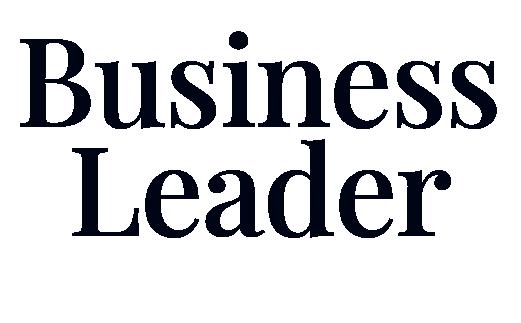

60 Ask Richard Richard Harpin answers questions from Business Leader readers
70 Against the Grain How one firm is helping companies expand into Africa
62 Lessons from another field Big Zuu on his mould-breaking success story
72 Bookshelf Starling Bank’s founder offers tips from her funding journey
67 Secret Sauce Innocent Drinks on the fruits of its cultural success
74 Membership Find out how to join Business Leader
68 My Biggest Challenge Ella Mills on how she overcame illness to found Deliciously Ella
78 Debrief Inspiration to take on your funding journey
MAY/JUNE 2024 /// 59 IMAGE CREDIT: Sharmarke Abdi BUSINESS LEADER ///
62
Q&A
Richard Harpin, the founder of HomeServe and Growth Partner and the owner of Business Leader, answers your burning business questions
Q. What is your take on an advisory board and how would you recommend structuring one?
Steve Johnson, co-founder and
CEO,
HOLM
A. I would recommend that a business has an advisory board and board meetings. But those board meetings are only as good as two things. First is the quality of the information that people get in advance. There should be a board pack with lots of numbers and KPIs because board meetings should be talking about performance. And there should also be short papers on strategies and plans. I’ve seen board packs that run to more than 150 pages; they should be more like 30 pages.
Second is who sits on the board. In my Growth Partner business, when I’m investing in an entrepreneur and taking a minority investment in their business I make sure that business has board meetings and that we jointly appoint a great non-exec chair who has some relevant experience and is going to help the founder grow the business.
The best chairs have been a chief executive previously and maybe even an entrepreneur.
Ideally, they have some relevant experience. In terms of frequency of those board meetings, they should be bi-monthly because they’re not designed to run the business.
The business should be run by the management team, which meets weekly and discusses how the previous week has been.
The board is more about strategy and plans and reviewing performance.
Beyond a chairman you can have a board of non-execs, but you don’t want too big a board. You need people around the table that are going to make a real contribution, can confront the brutal facts and do that in real time.
Q. Did you prefer being the CEO of a business with private investors or a public company?
Anonymous
A. HomeServe became a public company in 2004. Unusually for an entrepreneurial chief executive, I ran that public company for 18 years until we were bought by Brookfield. I did enjoy being a public company chief executive. But now, being private-equity
owned, it’s clear that you can focus on longerterm value creation and not worry so much about short-term profitability. I’m a big believer in private equity, because most of the sector is about investing in a business and helping that management team to grow it.
I do worry about UK plc and the UK stock market. In my later years running a public company, I got frustrated by the level of governance, red tape and box ticking on everything from corporate governance, remuneration, audit and risk, to ESG and diversity.
Some of those topics are important, but it should be up to the business and its leadership to say which ones they’re going to focus on and really make happen.
‘You need people round the table who are making a real contribution’
60 /// MAY/JUNE 2024
Q. Did you seek investment from the start with HomeServe? Why?
Rick Smith, managing director, Forbes Burton
A. Not initially. The HomeServe idea came out of the difficulty in getting a plumber on a Friday evening in Newcastle. I thought, that’s a great opportunity, so set up Fastfix, which was the precursor to HomeServe. Jeremy Middleton (my co-founder) and I put our life-savings into it, which was £50,000.
Then the money ran out and we had to desperately seek third-party investment. We went round all the UK water companies, because we thought there was a good link between a plumbing service and offering it to water companies’ customers, but they all said no, with one exception: South Staffordshire. Ultimately, it was about not just getting some money to keep the business afloat but getting some of their expertise. I think, in seeking investment, it shouldn’t be just about the money. We luckily managed to find a water company that would invest £500,000 and that was the way that we kept the business running. It gave us 12 months to find the right model. And we found a water company in Surrey that offered a plumbing insurance model that we copied and improved. That was the breakthrough that, after 12 months, meant the business went from losing £500,000 in its first full year to making £750,000 the next year.
Q. As an investor yourself, what other investors do you like to work alongside in the businesses you back?
Anonymous
A. I decided that I wanted to back other entrepreneurs and help them avoid the mistakes I made at HomeServe, and to share my secrets to building a billion-pound business. I’ve earmarked £175m of my own money; £75m of that is now invested in 12 great entrepreneurs running 12 amazing businesses. I like to invest alongside the founders, so my model is not to buy 100 per cent of a business but 20-30 per cent, enabling that entrepreneur to take a bit of money out of the business to derisk themselves and to have some capital they can use to grow the business faster.

‘Out of my eight secrets to building a billion-pound business, the top one is for every entrepreneur to hire their replacement’
On other investors, I like to find experienced non-exec chairs who will also invest. Steve Hewitt was CEO at Gymshark and he came in as non-executive chairman of Passenger Clothing, a business I invested £15m in for a 30 per cent shareholding. Steve invested £1m.
Q. Given that “accidental managers” are reputed to cost the economy £84bn per annum, how do you believe businesses should support them to ensure that their contribution is beneficial to a company’s success?
Suzy Cooper, EQ Management
A. I think the best example of accidental managers is entrepreneurs. They're not typically
born with the ambition to employ a large team of people and very few will be highly trained managers that have been chief executive of a business before, so they're learning on the job. Out of my eight secrets to building a billion-pound business, the most important one is that every entrepreneur should hire their replacement. Ben Francis, the Gymshark founder, hired his chief executive after three years. It took me eight years before I hired Jonathan King as my first chief executive to run Homeserve UK.
The biggest thing I aim to do is persuade my Growth Partner businesses and every mediumsized business out there run by an entrepreneur that the time has come to go out and hire a great chief executive, so they can then work on the business, not in the business. This is not about leaving the business, it’s about stepping up or focusing on what they’re really good at.
MAY/JUNE 2024 /// 61 Q&A
LESSONS from ANOTHER FIELD - BIG ZUU -

The rapper and TV presenter is a larger than life character who has turned a tough start into a mould-breaking success story
JOSH DORNBRACK
62 /// MAY/JUNE 2024

MAY/JUNE 2024 /// 63 FEATURE
Some people instantly draw you in with largerthan-life personalities that mean when they talk, you sit up and take notice. The rapper and TV presenter Big Zuu is one of these people. He started in music as a member of the MTP crew before moving into TV, hosting shows including the double Bafta-winning Big Zuu’s Big Eats and Big Zuu’s 12 Dishes in 12 Hours on ITV. He has also co-founded production company Big Productions and launched canned water brand Drip Water, which is sold in Morrisons and WHSmith.
His mother left her native Sierra Leone when she was four months pregnant with Zuu due to the civil war that plagued the West African country for more than a decade. The pair bounced around temporary housing until Zuu was 14. Now 28, he maintains this tough start gave him the hunger and drive to go on to bigger and better things, while his African roots gave him perspective.
“I went to Sierra Leone when I was eight years old for the first time,” Zuu recalls. “Coming from a single-parent background, I grew up complaining to my mum about wanting toys, clothes and games. But then I realised I was chilling here. My version of nothing is everything to them.”
Zuu – real name Zuhair Hassan – studied social science, community development and youth work at Goldsmiths, University of London. In his first year, the lecturer running the core foundation course got him excited to learn, but when she left before his second year he fell out of love with the course.
“I was doing shows, I was working for Uber Eats, I was driving my little ‘ped around and I just couldn’t balance it. I wasn’t connected to the course,” he recalls. Zuu and his fellow students ended up getting back some tuition fees for that second year due to poor teaching. Both the free time and the money allowed him to focus squarely on his passion: music.
“The one thing the average person will tell you when
you say you want to pursue a career in music, is that there’s a lot of musicians,” he says. “I think what people don’t see with music is that it’s a business. But plumbing is a business, as well; not everyone makes it in plumbing or makes the biggest plumbing business. It’s the same with music. Not everyone’s going be Jay-Z, not everyone’s going to be Drake. There are some people whose name you might not have heard, but they’ve toured the world and had millions of streams on Spotify and Apple Music.”
Some other things the world has
‘Be as creative as you can, put your energy into the right things and what is meant for you will follow’
in abundance are cooking shows and water brands. But again, that didn’t put Zuu off. He attributes his mindset in launching Big Productions and Drip Water to the lessons he learnt building his music career.

“I’ve always had the mentality of just do your work and keep your head down,” he says. “Be as creative as you can, put your energy into the right things and what is meant for you will follow. You can’t measure your success against that of others.”
Zuu is a strong and vocal proponent of diversity within the TV industry, not just within race, but class too. Ofcom’s 2023 Equity, Diversity and Inclusion in TV and Radio report found that 28 per cent of employees across TV and radio who provided data are from a working-class background, below the UK population average of 39 per cent. It also found that just 13 per cent of senior managers in television are from an ethnic minority.
“Going from music, where I would work with so many people who look like me and sound like me and are from the same culture as me, into television, it’s a completely different world,” he

64 /// MAY/JUNE 2024

says. “It made me think, ‘ok, where’s the disconnect from people from my world getting into this industry?’ I was just very lucky that the person who commissioned my show was a black woman [Natalie Rose, then commissioning editor at UKTV].”
One of the ways Zuu is helping to drive change is through his production company. Its growth has been steady, starting with an associate producer credit on series three of Big Eats and then co-producing the show’s fourth series with production group Boom, part of ITV Studios.
Big Productions has also signed a development deal with Banijay UK – the company behind shows such as MasterChef, Peaky Blinders, Big Brother and Pointless – to develop new comedy and factual entertainment formats, as well as scripted,
documentary and live event shows. And when it comes to Drip, Zuu is excited about its future, including a deal to become the official water partner of the Eddie Hearn-run Matchroom sport as well as taking on a sizeable investment to be announced in the coming months.
“I never expected to do this stuff with Drip,” he says. “It could be the biggest company that I run, even though it’s so different to what I do.”
He credits the brand’s potential to thinking outside the box in a stale market. “There’s not a lot of creativity
[in the water industry]. It has been the same guys for years and years, the same plastic bottles you see all the time.
“The canned water market is something that’s going to grow and become more of a necessity in society. In the same way we went from plastic straws to paper straws, it’s just something we’re going to have to get used to,” he says.
One moment when Zuu realised how far he had come was during the filming of an advert for Drip celebrating its Morrisons listing. When he was handed a Morrisons uniform to wear for it, he remembered he already had one at home. “I used to work at Morrisons in Victoria stacking shelves and now my drinks are in there – it’s crazy,” he says. He has big plans for the brand; it is due to move into a new office kitted out with a production room, studio and barbershop soon.
Not many British offices include a barbershop, but Zuu’s career shows how shaking up the status quo isn’t a tick-box diversity exercise – it’s good business. “A lot of businesses would really benefit from hiring from diverse backgrounds,” he says. “People that have not got the same experience in those lanes but are hungry to get into that position.”
He gives the example of Drip’s social media manager, who is young and from a minority ethnic background. “She didn’t have a lot of experience within the role but is absolutely just killing it in terms of the business. I’ve taken risks with who we’ve hired because I’ve always gone for young people who may not have the experience but have the drive and the willingness to make a change for their life,” he says.
“With that comes inexperience and challenges, but I think what we’ve gained is a work environment that’s fresh. I think a good business leader is someone open to different ideas but direct with what they want. We have great communication in my team. I listen to them, but I tell them what I want and that’s how we get stuff done.”
Maybe it’s time everyone was a little more Zuu.
MAY/JUNE 2024 /// 65
FEATURE
IMAGE CREDIT: S harmarke Abdi


MEET OUR 2024 FINALISTS
AI/Machine Learning Award
Audacia
BJSS
BrightBid
Centuro Global
Cursor Insight
Dubber
IDVerse
Voicescape
Best Mobile Technology
Socius24 Limited
Buzz Interactive
Domino's & Apadmi
Intoware Ltd
Reviva Softworks
Salesfire
True Potential
Vuyu.app Ltd
Edtech Business Of The Year
Corndel Ltd
Apolitical Coracle
OIAI by Otermans Institute
Perlego
Skiller Whale
Texthelp Ltd
Zero Gravity
Fintech Business Of The Year
GoCardless goDonate
Dynamic Planner
Epos Now
Finova
Propel Finance
R3
True Potential
Healthtech Business Of The Year
Togetherall Birdie
Intelligent Lilli
OSSTEC
Sweatcoin
TeleTracking UK
Vastmindz
Virgin Pulse
Incubator/Accelerator Of The Year
Net Zero Technology Centre
A City Law Firm
Gate One
Growth Studio Group Ltd
HS2 Ltd
L Marks Lloyd's Plexal
IT/Telecoms Support
Infinigate Cloud
Agilitas IT Solutions
Emerge Digital
Lucidica Limited
Nexus Open Systems Ltd
Optimising IT
The One Point Ltd
T-Tech
Most Innovative Use Of Technology
Otermans Institute
BrightHR
Buzz Interactive
Energy Exemplar
Escrow London
Grand Bequest
Kaluza
True Potential
Sustainable Tech Business of the Year
Advanced Infrastructure
Agilitas IT Solutions
Auto Trader Group PLC
Ghyston
Octopus Energy
Pure Storage
Wazoku
Wolf & Badger
Tech Entrepreneur Of The Year
Adam Herbert - Go Live Data

Zain Ali - Centuro Global
James Tweed - Coracle
Benedikt Ilg / Giacomo Kenner - Flip
Robert Ogden - Renewable Exchange
Joe Boyle - Salt Communications
Namrata Sandhu - Vaayu
Simon Hill - Wazoku
Tech Scale-Up of the Year
Parser Digital 15 gifts
Flip Freemarket
Holibob
Housekeep
Nexus Vehicle Rental
Sandhata Technologies
Tech Start-Up Business Award
Videosign AIME
Centuro Global Collegia Pension
Cursor Insight Delta g
Salt Communications
SAPI Group Limited
20 JUNE 2024 | HILTON LONDON BANKSIDE BOOK YOUR TICKETS NOW gotechawards.co.uk
The fruits of cultural success
Emilie Stephenson, head of Force for Good at Innocent Drinks in the UK, explains to Patricia Cullen how a great business culture comes from the right blend of ingredients
Established in 1998 by Richard Reed, Adam Balon and Jon Wright, Innocent Drinks started out selling smoothies at a music festival in London. From these beginnings, it has grown into a global corporation with revenues of £426 million and 20.5 per cent of the European chilled juice market in 2022. In 2013, the firm was bought by Coca-Cola and in 2018 became a B Corp, committing to donate 10 per cent of profits to charitable causes.
Innocent Drinks was eight years old when Emilie Stephenson joined the company to help it launch in France. She outlines the firm’s secret sauce: its culture.
EMPOWERING EMPLOYEES
“Enabling employees to bring their best self to work. This is done through an open and inclusive culture, a wide range of affinity groups and generally making sure people feel like they belong.”
FOSTERING GROWTH
“Just like nurturing a plant, we help people grow in their roles with a varied learning and development offering comprised of courses, an exciting onboarding programme that we call the Innocent induction, and plenty of mentoring/ coaching and opportunities. We also support progression within the business via promotions or lateral moves. We hold regular development chats, which we call ‘your future’, to understand employee expectations and match them to wider business needs.”
Engaging the workforce “We involve employees in our main charity initiatives, like the Big Knit [in aid of Age UK], or our Innocent Foundation scholarships, which offer the chance for employees to spend two weeks on one of our foundation projects around the world.”
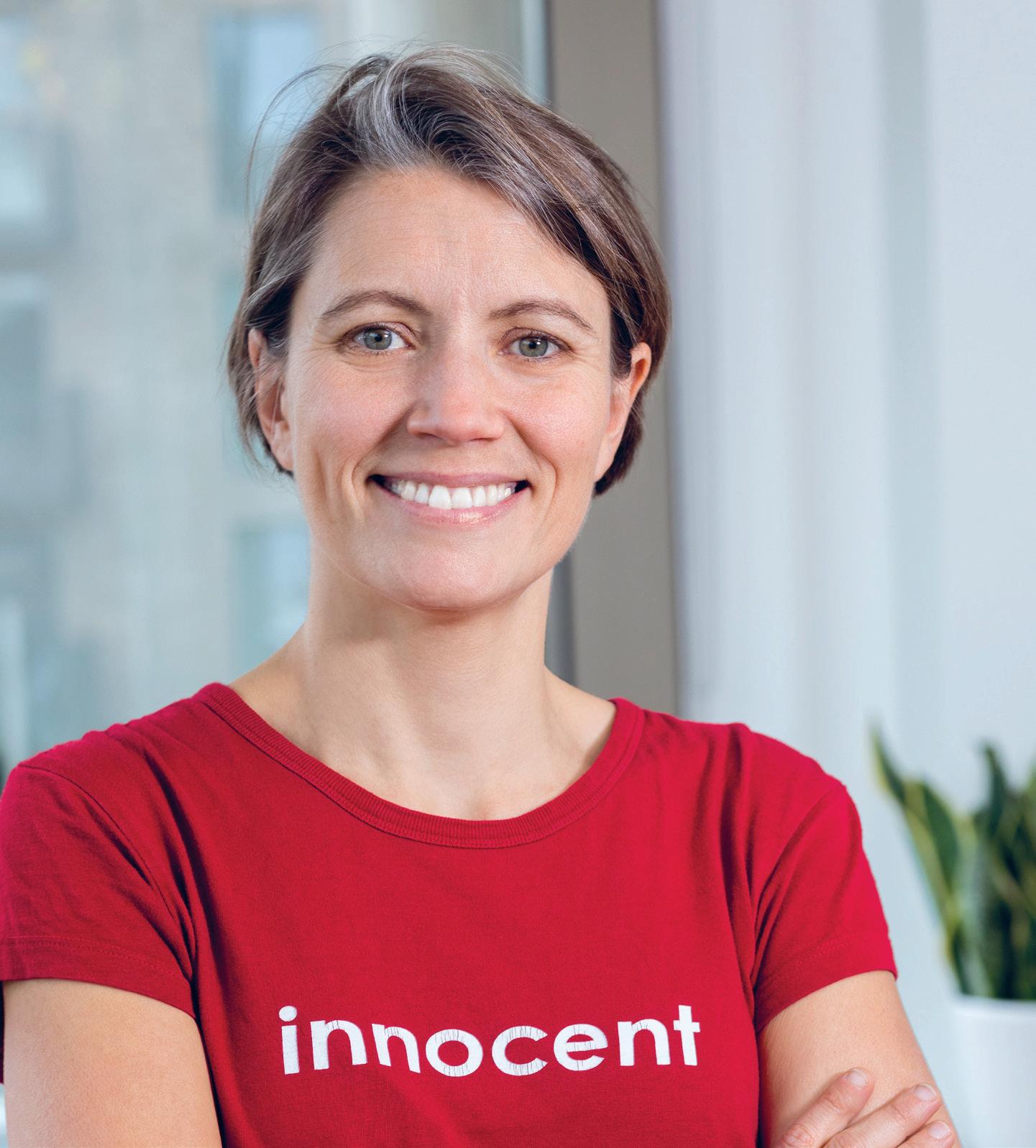
FOCUSING ON ENJOYMENT
“We make sure there is a human and fun touch to everything we do. We often say that we take our products seriously but don’t ever take ourselves too seriously.”
LIVE WELL, WORK WELL
“We emphasise a strong employee culture, never forgetting that the little things can make a big difference, be they free breakfasts,
Emilie Stephenson: ‘Human touch to everything we do’
an infinite supply of fruit and vegetables, incentives to cycle and travel sustainability, and a culture of giving and receiving feedback. This makes Innocent Drinks as unified as possible and ensures it feels like one team, even though we’re growing.”
MAY/JUNE 2024 /// 67 SECRET SAUCE BUSINESS LEADER ///
My biggest chal l enge

Ella Mills, the founder of Deliciously Ella, talks to Josh Dornbrack about how she turned her solution for a debilitating health condition into a recipe for success

Ella Mills describes herself as an accidental founder. She was studying for a degree in history of art at the University of St Andrews when, in 2011, she was diagnosed with postural tachycardia syndrome, a circulatory disorder that occurs due to an abnormal response by the autonomic nervous system. She spent most of the next year in hospital seeing specialists and, aged just 21, ended up on a cocktail of up to 25 different medications a day.
Unable to live a normal life and with her mental health under strain, she hid herself away from the world. But she soon realised she couldn’t go on like that and there could be a solution to her health problems away from normal medicine. That led her to set up what became her brand, Deliciously Ella.
‘Carving out that time first thing in the morning when nobody is vying for your attention, I find that very impactful’
“I just assumed that someone else would solve my problem,” says Mills. “But after a year or so, it became very clear that wasn’t the case. It was really after hitting rock bottom that I started to internalise the solution a bit more and became interested in what else I could do. I started reading other people's stories and looking at how other people had used facets of diet and lifestyle to change their health.”
Deliciously Ella started as a food blog, with Mills exploring how nutrition, lifestyle and food choices could impact health. She began writing recipes based around natural ingredients despite admitting that in 2012 she “couldn’t cook and didn’t like vegetables”.
The Instagram account of Deliciously Ella is full of images of mouth-watering plant-based meals that are shared with its more than 2.4 million followers. She serves as the face of the business and brand director, alongside her husband, business partner and the company’s chief executive, Matthew Mills. The brand now offers a range of plant-based food products, an app, a restaurant, seven bestselling recipe books
and more. Mills has transformed what could have been a lifelong debilitating condition into her greatest entrepreneurial strength. Despite her success, Mills admits historical struggles with mental health don’t just go away. Plus growing a business can, in many ways, lead to more issues particularly because others may be looking to you for answers, when you may not have them. Mills stresses the importance of taking the time to take care of yourself.
“I think it's so easy to put it at the bottom of the list because you've got so much else to do,” she says. “But equally, it is so critical to success that you are on your best possible form.”
All has not been plain sailing for Deliciously Ella. Failures included discontinued product lines and closing locations – the company was forced to close two out of three of its London restaurants in 2018. Mills says: “It’s a part of growing but I think the faster you acknowledge that you got something wrong and lean into what is working, the better.”
Managing a fast-growing business plus looking after two young daughters is enough to keep anyone on their toes. Mills is quick to point out that there is no one-size-fits-all solution for every business leader but that, for her, a morning routine is crucial. “Carving out that time first thing in the morning when nobody is vying for your attention, I find that very impactful,” she says.
Mills spends up to an hour in the morning meditating and having what she calls a “quiet coffee” in preparation for the day ahead. She is not alone among successful businesspeople in prioritising a morning ritual. Dragon Deborah Meaden has a cup of tea and a moment of stillness barefoot in the garden, while Amazon founder Jeff Bezos eases into the day with a newspaper and a cup of coffee, along with his rule of no meetings before 10am.
For Mills, her routine creates a “sense of grounding, even when things feel incredibly overwhelming”. And it has helped her deal with the daily challenges that running a successful business brings.
WATCH MORE
Read or watch the full interview with Ella Mills on the Business Leader website by scanning the QR code
MAY/JUNE 2024 /// 69 MY BIGGEST CHALLENGE
Welcome to Africa Inc.
Bolaji Sofoluwe is a firm believer in the power of the continent to deliver prosperity for ambitious companies and local economies, she tells Josh Dornbrack

For much of the late 20th century, the perception of Africa has been given over to scenes of civil war, instability and poverty.While those images may have some truth in them, there is so much more to the continent. Africa is home to about 1.4bn people, has a GDP of $8.86trn (£7.09trn) based on purchasing power parity, and an estimated
annual GDP growth rate of 3.7 per cent in 2023. It is the second-largest continent, almost three times bigger than Europe, and is made up of more than 50 countries with in excess of 2,000 languages spoken. Such size and complexity comes with challenges, but it’s worth paying attention to the potential of the region as a whole.
To help with that, there is ETK Group. Since 2010 the company has delivered projects in 34 African markets for 200 clients and participated in deals worth more than $1bn (£785m). Its managing director, Bolaji Sofoluwe, is a growth expert at Oxford University’s Saïd Business School on the Goldman Sachs 10,000 Small Businesses programme, which helps
70 /// MAY/JUNE 2024
growing enterprises reach –and even exceed –their growth ambitions.
Sofoluwe was born in Birmingham but moved to Nigeria aged seven with her parents. She stayed in the West African country, completing a French language and linguistics degree at the University of Calabar.
After working in the banking sector in Africa, she joined Halifax in the UK in a secured collections role, which sparked an interest in risk management. Two years later, she left the banking world and returned to Nigeria to work in the Niger Delta, an area historically plagued by conflict.
The project involved consulting on international oil companies coming together to help set up local businesses. It included 15,000 firms, ranging from one-man-band bricklayers to hospitality managers. Sofoluwe helped to run a similar project in Côte d’Ivoire before moving back to the UK.
She focused her skills on helping businesses leverage the opportunities in Africa, and began working privately with a client from the Niger Delta living in England to set up a poultry farm in Port Harcourt, Nigeria. The seeds for a new venture were sown.
“When we set up ETK in 2011, it wasn’t very popular to talk about Africa from a business perspective. Instead, everyone approached the country from the perspective of ‘let’s help those poor Africans’,” she recalls.
“While I agree that there are significant humanitarian and development issues, I also knew there were companies in Africa doing extremely well.
“So, I founded ETK to provide consultancy services for those looking at entering the continent in a commercial sense.”
The African economy is full of potential. On the consumer side, expenditure is predicted to reach $2.1trn (£1.6trn) by 2025 and $2.5trn (£2.0trn) by 2030. The continent raised an estimated $5bn (£4bn) in start-up funding in 2023. It is also rich in raw materials: the Democratic Republic of the Congo has almost half the world’s cobalt, while South Africa is the world’s largest producer of manganese, which improves the performance of batteries in electric vehicles.
ETK initially offered nine services, but found that there were four key areas where businesses needed help. “The first one is companies that want to sell,” says Sofoluwe. “They’re looking for distributors, agents or partners in
the market that would sell or distribute their products locally. The second is companies that are looking to establish local offices, hiring staff and operating in the local market.” The third is companies that want an agent in a country. “Somebody who is on their payroll and represents them in the market,” says Sofoluwe.
The final area – organisations that are looking to acquire a stake in a local business – is close to Sofoluwe’s heart as it creates jobs and brings in much-needed foreign direct investment. “These clients don’t want to reinvent the wheel, but they do want to bring their expertise and knowledge of the industry in some innovation to a local African partner.”
While Africa is firmly on the radar of several FTSE 250 companies, Sofoluwe believes that medium-sized organisations have just as much to gain from expanding into Africa, whatever market or industry they operate in. ETK is sector agnostic, but has found that many clients operate in agriculture, aviation, FMCG, engineering and construction.
Another way ETK aims to boost the African economy is by working with companies based on the continent to prepare for international acquisition. “We’ve developed a product where we can create a company that’s very close to a
‘We need to be scaling up existing businesses so they can thrive and employ more people’
perfect fit for the acquirer,” says Sofoluwe. “We ensure that they have the correct governance in place; it goes past mere due diligence.”
This includes working on frameworks such as organisational capacity development and environmental, social and governance (ESG).
The latter is a particular sticking point in Africa, where development of ESG frameworks lags behind other countries.
“Someone once said to me that there’s no word for sustainability in Swahili,” says Sofoluwe, laughing. “However, we include it in the framework we provide to comply with

Bolaji Sofoluwe, above, wants more foreign direct investment.
Right, water is poured into a drone
multinational companies that are required to report on these issues.”
She continues: “It is also about ensuring that deals go through, especially when we know it is going to benefit not just the local economy but the promoters of that business, too. I do feel like that is the path towards sustainable development here.
“We need to be scaling up existing businesses so they can thrive and employ more people. That is a real focus for me.”
Sofoluwe has a simple message for those running businesses in the UK: get ambitious. “One of the key features I have seen over the years in high-growth businesses that are resilient and that can stand the test of time is the fact that they are eager for market development,” she says.
“So, don’t stay in your comfort zone; think outside the box, look at different markets and identify new opportunities.”
For those firms considering an African expansion, there is plenty of support in the UK. Businesses can, for example, join the UK Export Academy, which offers free training for those exporting overseas for the first time for everyone from chief executives to research analysts. It complements Sofoluwe’s main advice to be more ambitious when it comes to expansion, and look beyond the obvious routes.
The African market may be complex, with each country having its own customs and ways of working, but it has enormous potential. Starting a dialogue could be the perfect starting point for a company wanting to break from the norm and go against the grain.
MAY/JUNE 2024 /// 71 IMAGE CREDITS: ETK Group, Getty Images AGAINST THE GRAIN
BUSINESS LEADER ///

How to meet the venture capital fund of your dreams
Starling Bank founder Anne Boden offers some tips from her funding journey
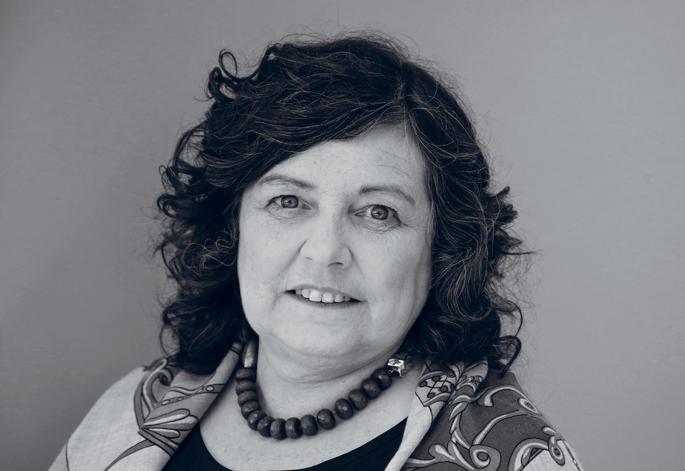
nce a likely investment partner has been pinpointed, the challenge is to get a meeting with them. While venture capital funds (VCs) are increasingly letting entrepreneurs pitch direct through their websites, where founders
can upload their pitch decks to be reviewed, not all offer this facility.
Many will still only operate via “warm introductions”, which is where someone within their network introduces them to an entrepreneur looking for funding. Or, to put it succinctly: investors don’t want to meet you, they want to be introduced to you.
For the VC community, this probably makes a lot of sense. Their role is akin to finding a needle in a haystack. The warm introduction system puts the onus on their network to do the pre-vetting.
Unfortunately, it doesn’t make as much sense to those trying to get in front of investors and, frustratingly, can put many female founders at a disadvantage from a number of standpoints. They may not have an extensive network that
can introduce them to VCs because it often all comes down to going to the right school/ university. At this stage, they have not met many other founders. However dedicated we are to networking, it is not always easy to strike up a rapport with other founders who have already received investment.
Firstly, the ones that are funded don’t tend to attend the same events as those who have not got to that point. Secondly, almost all those who have received funding are men. As a 50-something woman when I started out, I know firsthand that it is not easy to start a rapport with 30-something founders. And you do need that easy rapport in order to persuade them to introduce you to their investors.
The approach I developed was to send emails to all my target investors, using the connections
O 72 /// MAY/JUNE 2024
I did have. The goal was to be succinct and give them just enough detail to whet their appetite: Hi Phil, I’m seeking funding for my start-up which is going to revolutionise the banking market. I’ve already got a banking application midstream and am having lots of positive interest in the market. Any chance of a meeting?
Take care not to exaggerate your prospects, or how far the start-up has come to date. There is such a thing as misrepresentation, so stick to the facts. Also think carefully about directly name-dropping any associates that are already on board to give added credibility.
Early in the Starling story, I received interest from a very well-known senior figure on the technology scene. He’d been very helpful and kindly gave me large amounts of advice, as well as access to some of his firm’s resources. After seeking permission, I noted this in many of my introductory emails, writing something along the lines of “Starling is already working closely with [named person], the founder of [big tech firm]. What I didn’t realise was that this put off a number of investors.
The tech firm in question was over three decades old. In tech terms that’s a lifetime. The investors were on the lookout for something cutting edge and new. I was sending the subliminal message that Starling was steeped in the past. Why invest with me, when they could meet with some 24 year olds who know all the buzz words?
Some start-ups worry that if they send out too many emails in one go, they will be inundated with meetings and won’t be able to cope. Don’t worry – this is a highly unlikely outcome. And if this does happen, so much so much the better.
This extract from Female Founders’ Playbook by Anne Boden © 2024 is reproduced with permission from Kogan Page.
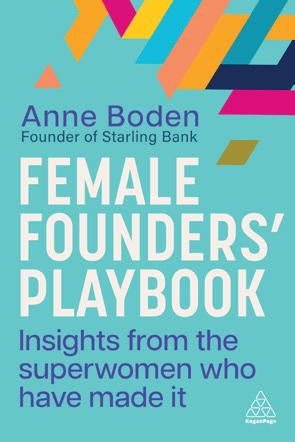
A CLASSIC READ
Simon Calver on Good to Great by Jim Collins
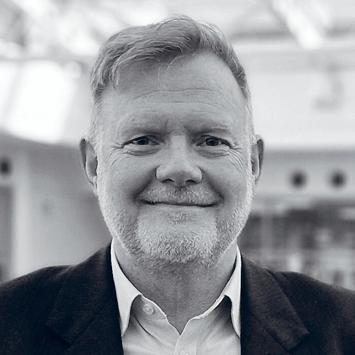
What I look for in a good business book is being so inspired that at the end of every chapter I write down what I want to do differently in my own business. And not in the future, but the very next day!
Good to Great: Why Some Companies Make the Leap . . . and Others Don’t by Jim Collins, published in 2001, was the first book that did this for me.
It guided me through the cultural and leadership change that made ordinary businesses exceptional and challenged me to be resilient and face into the tough decisions needed never lose faith in the direction I was heading.
One of his ideas, which still stands the test of time, is the benefit of setting BHAGs. These are Big Hairy Audacious Goals that make you rethink the ambition of your business. When you think “really, really big” you need to throw out all incrementality and
focus on the critical actions that are going to make a huge difference to customers. At Lovefilm, the mail order DVDs and streaming service where I spent seven years as chief executive before it was sold to Amazon, we set BHAGs at the start of every year and paid bonuses to all staff when we hit them.
As a result, the team was aligned to do the big things well and step-change growth in the business. We paid out bonuses in four of our first five years.
Companies, especially tech companies, still use this thinking, as do investors looking to back future winners. They call it ‘10x’, looking for ideas that are 10x quicker, better or more efficient that what is on the market. It has served Google, Apple, Amazon and Tesla well as they search for their groundbreaking innovations and transformational change. It may be a little less hairy than Jim Collins was thinking about, but it remains audacious to this day.
Simon Calver chairs Vinterior, the circular economy platform, and is a non-executive director of HSBC UK

IMAGE CREDIT: Getty Images
BOOKSHELF MAY/JUNE 2024 /// 73 BUSINESS LEADER ///

Join the private community for leaders of fast-growing companies
Business Leader is a highly-vetted membership community for CEOs and founders of medium-sized businesses
We help ambitious leaders turn their medium-sized businesses into giants
Our mission is to double the number of large businesses in the UK from 7,500 to 15,000.
Our founder Richard Harpin took his company HomeServe from humble beginnings in 1993 to a sale for £4.1bn.
But like all successful business leaders, he suffered many setbacks along the way. No doubt we’ll have our share of failure too. But failure is often the key to unlocking success.
That’s why we have created our peer-to-peer membership, where CEOs and founders can learn from and challenge each other in a safe and confidential environment.

Will you come with us on our journey?
We are recruiting members for our Founders 250 to form the bedrock of our community.
So if you’re ambitious, motivated and willing to share your expertise with others, come and see how Business Leader can help your company reach the next level.
APPLY NOW Businessleader.co.uk/membership
Toilet talk
Business Leader’s head of membership Craig Wilmann discusses the importance of ‘engineered serendipity’
When Steve Jobs was the boss of Pixar, and it was building a new multi-storey headquarters, he insisted that the toilets should all be together in the middle of the building. The idea was that people from different departments, spread across several floors, would constantly be crossing paths and talking to each other.
I think we can learn a few things from that story. One, Jobs wasn’t too hot on employee wellbeing. And, two, I bet his own office had an en suite. But also, he was onto something. If you make a habit of speaking freely and openly with people who see things a bit differently, you can unlock some unexpected ideas.
The positioning of the Pixar toilets was an attempt to create what the entrepreneur Sahil Bloom calls “engineered serendipity”. If, as we all know from first-hand experience, chance
discussions and offhand comments can lead to real breakthroughs, we should seek to expand our “serendipity surface area” and make these fortuitous occurrences far more likely. “Your habits,” says Bloom, “can put you in a position where ‘luck’ is more likely to strike.”
At Business Leader, we believe it’s possible to achieve the same outcome without putting such a strain on people’s bladders. And that’s why we’ve put peer-to-peer at the heart of our new membership programme for founders and CEOs of mid-sized companies.
Our members will be placed in focused forum groups of no more than 10 fellow founders or CEOs. They will meet eight times a year for three hours. During these meetings, which will include regular loo breaks, they will share their challenges and opportunities with people who fully understand what it means to be a leader of a fast-growing business.
It’s important to point out that this isn’t networking. These are focused business discussions chaired by expert leadership coaches who have worked with CEOs for years. What’s more, the membership is exclusively for people who run organisations with a turnover of £3m-plus and a workforce of at least 15. The thinking is that there is a great deal of support and advice out there for start-ups but very little for businesses that have actually proven themselves and now want to scale.
In the UK, we are fantastic at launching new businesses but not so good at turning mid-sized enterprises into large ones. A CEO in the US, where peer-to-peer forums are much more prevalent, is almost twice as likely to make this leap compared with their UK equivalent.
If we want to generate growth in this country, we need to get successful CEOs talking to each other and sharing ideas. And, no matter where they position the toilets in their HQs, this will not happen unless they leave their buildings and make peer-to-peer part of their regular routine. Since I last wrote in these pages, many fascinating people have signed up to become founding members. And we’re looking to add more. If you’re interested, I’d love to hear from you, so please do get in touch.
BUSINESS LEADER /// MAY/JUNE 2024 /// 75 MEMBERSHIP IMAGE CREDIT: Adobe Stock

Why you should join us
Personal forums
Join a peer group with up to nine other like-minded founders and CEOs in your local area and exchange first-hand insights. This is a safe and confidential space to share ideas with people who truly understand the challenges you’re facing.
One-on-one coaching and mentoring
Connect with expert coaches and seasoned mentors, including our founder Richard Harpin. Gain insights from successful leaders who understand the challenges of leading and scaling companies, and tap into a network that fuels growth across industries.
In-person and online masterclasses
Learn from experts and network with peers at our exclusive events. These include expert workshops, monthly needs and leads sessions, site visits to relevant businesses, a quarterly event with Richard Harpin, and an annual summit.
Exclusive digital platform
Access our private community platform, your exclusive hub for connecting with fellow members. Forge meaningful connections, share insights and explore collaborative opportunities in a space tailored to your needs.
Business Leader magazine
Enjoy full access to our high-quality magazine and online content, with interviews and columns from some of the nation’s most inspiring business voices. You can help shape it too, by letting us know about the issues that truly matter to you and your business.
CEO growth centre
Our mission is to help you grow your business and we will do everything in our power to make this possible. Whatever the challenge or opportunity, we will provide the services you need to take your business to the next level.
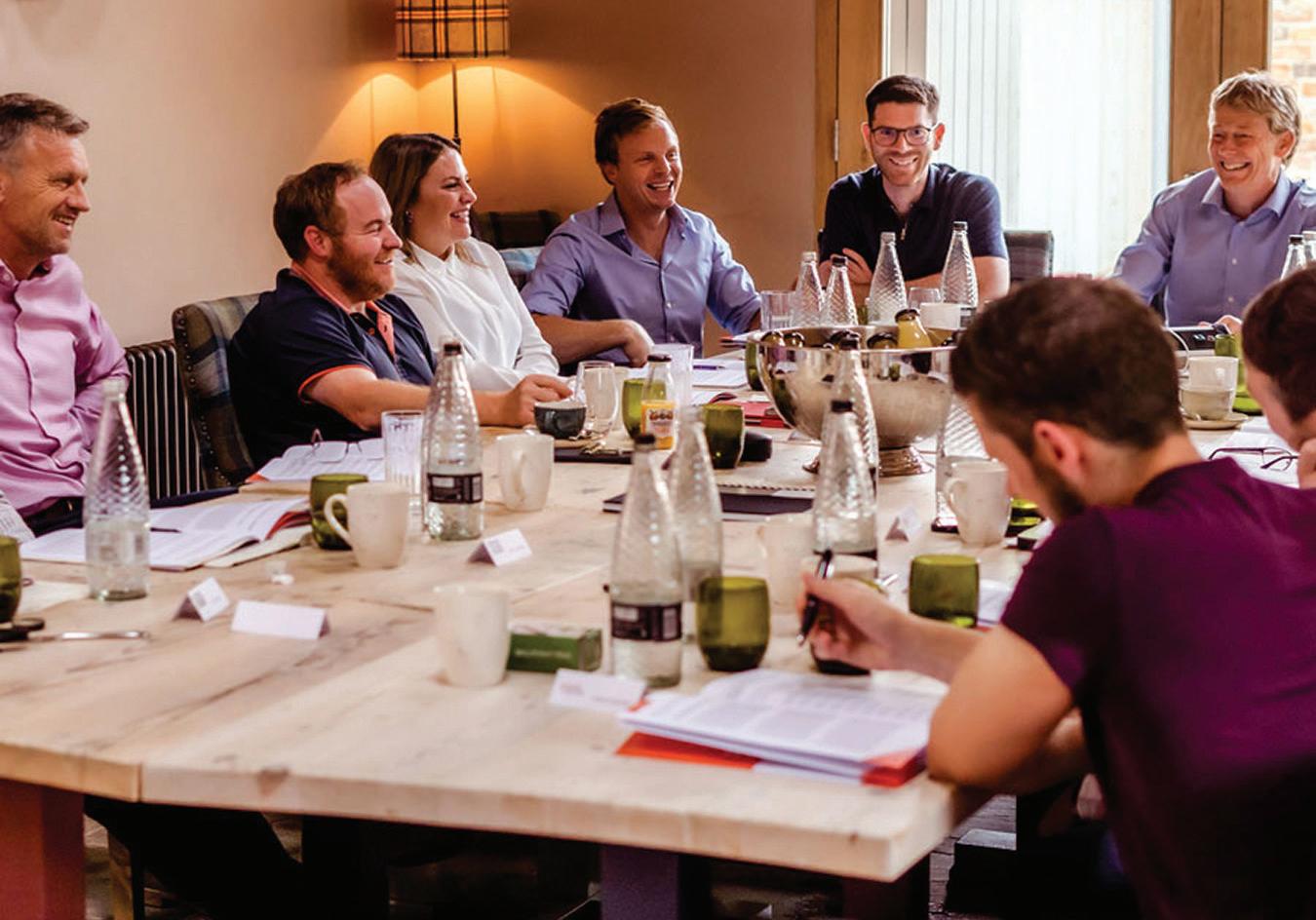
Are you the founder or CEO of a mid-sized UK company?
Join Richard Harpin and up to 12 other founders/CEOs for a free growth workshop
ichard Harpin and Business Leader are looking for 250 ambitious founders and CEOs to help launch our new membership programme. The Founders 250 will be drawn from all corners of the UK, representing a variety of industries, united by a desire to share ideas and grow their company.
RAs we build up our waiting list, we will be hosting events across the country, including growth workshops with Richard, where he will talk about his eight secrets for building a billion-pound business and we’ll look at how this can be applied to your business directly. We’ll also talk about Business Leader and our plan to help double the number of large businesses in the UK.
We have held four such events so far, with CEOs from a range of industries and locations,
and the waiting list for our membership is building at pace.
If you’re a founder or CEO of a mid-sized company, let us know where you’d like us to host our next event and what you’d like us to focus on.
Contact membership@businessleader.co.uk and, while you’re at it, why not apply to join our Founders 250?
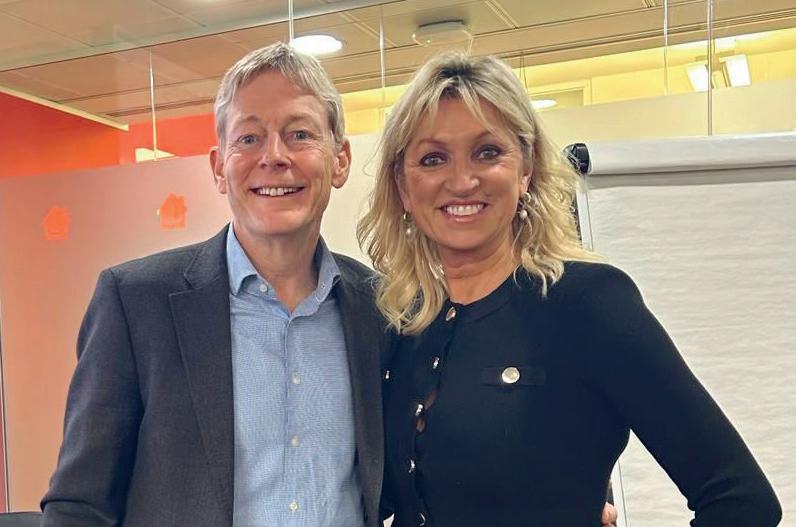
IMAGE CREDIT: Getty Images MAY/JUNE 2024 /// 77 MEMBERSHIP
‘Three components make an entrepreneur: the person, the idea and the resources to make it happen.’
Anita Roddick, founder, The Body Shop

‘If it was Lehman Sisters, it would be a different world.’
Christine Lagarde, president, European Central Bank
‘The old saying holds. Owe your banker £1,000 and you are at his mercy; owe him £1m and the position is reversed.’
John Maynard Keynes, economist
‘I think money is a wonderful thing because it enables you to do things. It enables you to invest in ideas that don’t have a short-term payback.’
Steve Jobs, co-founder, Apple
‘Chase the vision, not the money; the money will end up following you.’
Tony Hsieh, former chief executive, Zappos
Coming up in our next issue . . .
The July/August edition of Business Leader will focus on leadership. Please get in touch with ideas, feedback and stories at thoughts@businessleader.co.uk
IMAGE CREDIT: Getty Images 78 /// MAY/JUNE 2024

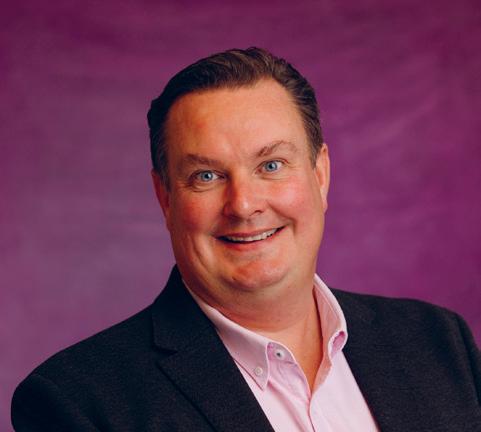
THE SPRING BUDGET: GOOD NEWS SPRINKLED WITHIN THE POLITICAL BLUSTER
The Spring Budget opened with a welter of fiscal updates on growth spending and Government debt. There was a clear emphasis on lowering taxes, improving public services, and increasing investment in the UK - all intended to contribute towards building a stronger and more resilient economy.
But hidden within the bluster and a few clearly politically motivated measures, there were some genuinely welcome changes. As ever, the true impact will take time to reveal itself, but in the meantime, we will be helping businesses and individuals to read between the lines and decipher what it means for them.
A proposed 2p cut to National Insurance Contributions (NICs) for employees from 6 April 2024 has dominated the spotlight. The reduction is worth around £450 a year to those on an average salary and will cost the Government £10 billion. Whilst it may not represent a major cut or fully compensate for fiscal drag, ultimately, we would rather have the cut than not.
Collectively, the rise in duty on vapes and tobacco, changes to the non-dom regime, and abolition of the furnished holiday lets regime does amount to a significant figure, but it still falls £5 billion short of funding the NIC cut. As a result, the Government will likely find itself in slightly more debt at the end of the forecast period than anticipated.
An extension to the fuel duty freeze for 12 months will come as a welcome measure, saving the average car driver £50 next year. A huge number of businesses still rely on fossil fuel transport and with no inexpensive electric alternatives on the market, continuing to use those vehicles is the only costeffective choice.
There was positive news for parents too, with consultations around basing child benefit assessments on a household rather than individual basis. As a stopgap, the threshold at which the benefit is withdrawn has been increased and the rate of top end taper halved. As a result, 170,000 families will continue to receive child benefit, and half a million will receive more than they do now.
The increase in the threshold at which small businesses and the self-employed need to register for VAT from £85,000 to £90,000, will ease one form of fiscal drag. But there was hope that it would go beyond a £5,000 rise, which fails to provide much incentive for growth.
We hope to see the Bank of England’s ambitious and promising 2% inflation target come to fruition over the coming months. Watch this space.
Dominic Bourquin, Corporate Tax and Corporate Finance Partner at Monahans, the South West’s leading accountancy and business advisory firm.


COMING MARCH 2025
A landmark event designed to bring together visionary leaders, budding entrepreneurs and industry experts for an experience focused on unlocking growth and innovation
Connect your brand with CEOs and founders at the UK’s leading event for high-growth companies. Contact a member of our team to find out more £10.00
Scale-Up Summit
partners@businessleader.co.uk

















































































 Kimberly Martin Managing Director
Kimberly Martin Managing Director






























